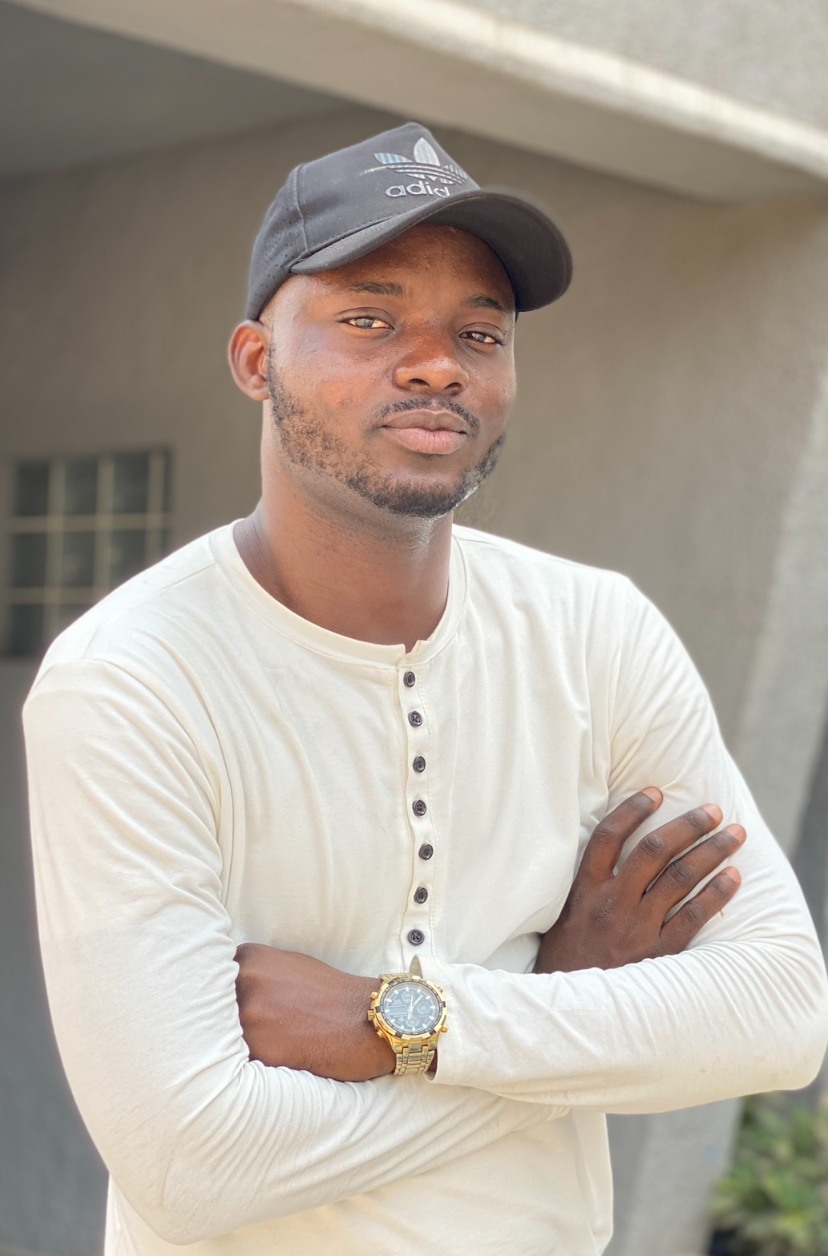
Oluwatobiloba Michael Ajayi
Project Description:
Religion, ethnicity, and politics deeply shape how people engage with democracy, but these forces are often misunderstood or oversimplified. The Voices of Unity: Faces of the Vote Exhibition builds on Oluwatobiloba Michael’s doctoral research, which explores how these factors influenced voter behavior during Nigeria’s 2023 presidential election, especially in the multicultural Southwest. This public scholarship project will bring those insights to a wider audience through a multimedia exhibition. The exhibition will showcase powerful, anonymized stories and visuals from Oluwatobiloba Michael’s fieldwork, highlighting how everyday voters navigate complex identities and make political choices. Artistic representations and visual data will offer visitors an immersive experience that humanizes electoral narratives and fosters deeper understanding.
Alongside the exhibition, Michael will host informal dialogues and guided tours to encourage community reflection and conversation. By connecting academic research with public storytelling, “Voices of Unity” aims to amplify underrepresented voices and inspire new approaches to democracy and inclusion. The project also creates a bridge between Nigeria’s experiences and Canadian conversations about diversity and governance, encouraging reflection and shared learning across both societies.
Oluwatobiloba Michael Ajayi is a scholar of religion and politics from Nigeria. He holds a Bachelor of Arts (First Class Honours) in Religious Studies and a Master’s degree with Distinction in Sociology and Ethics of Religion from the University of Ibadan. Now pursuing a Ph.D. at the Department for the Study of Religion at the University of Toronto, his research explores how religion, ethnicity, and political identity shape democratic participation in Nigeria. Passionate about public engagement, Michael’s work bridges academic research and community dialogue, aiming to amplify marginalized voices and promote inclusive democratic practices in both Nigerian and Canadian contexts
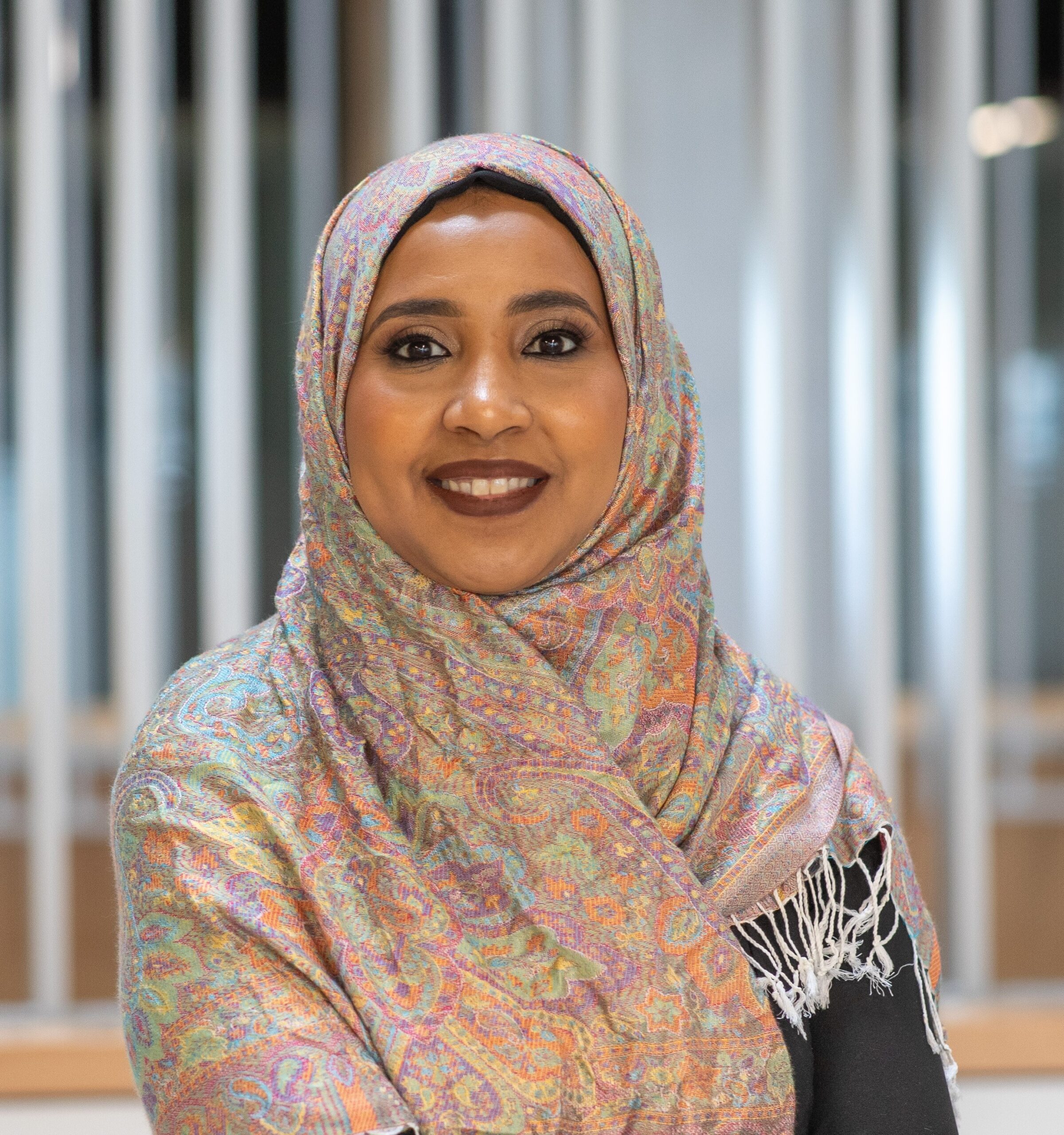
Mai Ali
Project Description:
Mai Ali’s public scholarship initiative aims to expand Research Connect, a program she originally created to support Black undergraduate students in engineering, by including high school students in AI and mental health education. The project addresses the rising need for accessible mental health care, especially among adolescents, by developing AI-driven tools that are ethical, inclusive, and informed by lived experiences.
Over the course of one year, Mai will design a curriculum that introduces students to the intersection of artificial intelligence and mental health. The initiative includes workshops, mentorship opportunities, and guest lectures from mental health professionals and AI researchers. Students will gain hands-on experience developing small-scale AI projects focused on mental health disparities and present their work at a final showcase.
By engaging Black youth in meaningful research, the project promotes diversity in AI, increases mental health awareness, and ensures that emerging technologies reflect the needs of underrepresented communities. This initiative is grounded in Mai’s doctoral research on machine learning for adolescent mental health prediction and aligns with her long-term goal of making digital health tools more equitable and accessible. The Connaught PhDs for Public Impact Fellowship will support the program’s scale-up and long-term sustainability through outreach, resource development, and deeper community engagement.
Mai Ali is a Ph.D. candidate in Electrical and Computer Engineering at the University of Toronto. Her research focuses on applying machine learning to digital psychiatry to help close the mental health treatment gap. She is the inaugural president of the NSBE Graduate Chapter at U of T and the founder of Research Connect, an initiative that expands research access for Black undergraduate students in engineering and related fields. Mai is a recipient of the IBET Momentum Fellowship and is deeply committed to equity in STEM, youth education, and improving youth mental health through research and community engagement.
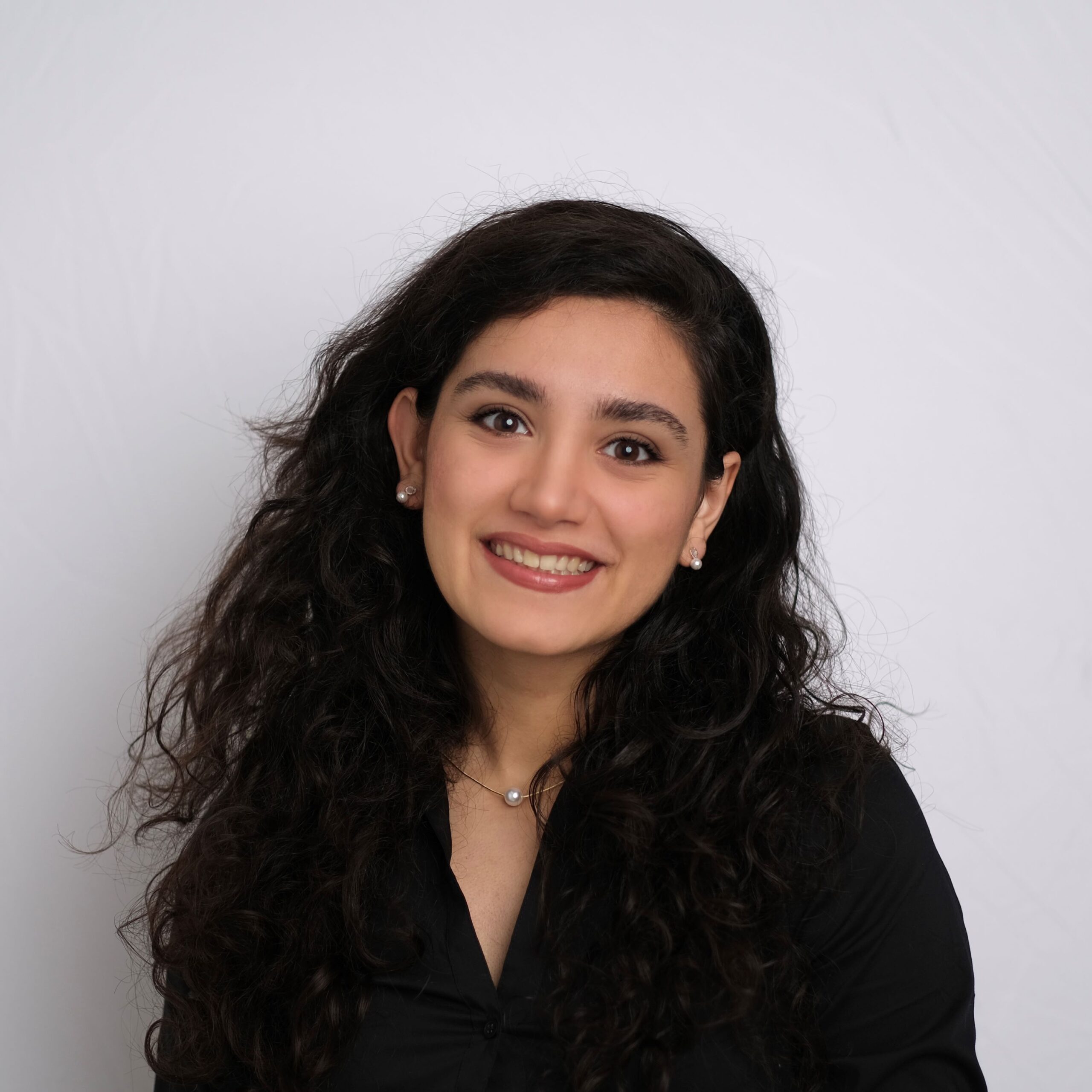
Shaghayegh (Shay) Chavoshian
Project Description:
Slips and falls are significant global health concerns, contributing to injuries, reduced independence, and increased healthcare costs. At the core of Shay’s public scholarship initiative is a technology that allows users to capture images of their footwear outsoles, which are analyzed by her Artificial Intelligence (AI) model to assess slip resistance. The AI model is selected from several AI architectures incorporating vision transformers, foundational models, and convolutional neural networks based on their accuracy and computational costs. This approach makes advanced research on slip prediction accessible to the public, translating complex biomechanics and material science findings into actionable insights. A key component of Shay’s approach is engaging with end users throughout the research and development process. Additionally, she collaborates directly with footwear manufacturers (e.g., Marks Work Warehouse) to ensure that the findings are aligned with real-world footwear production standards and user needs. This iterative process strengthens the connection between research, product design and practical application, ensuring that the final product is both scientifically robust and practically useful. Through this initiative, Shay hopes to make slip and fall prevention more accessible, engaging, and effective.
Shay Chavoshian is a PhD candidate in Biomedical Engineering under the supervision of Dr. Atena Roshan Fekr. Shay’s PhD focus is on AI-based technologies to detect and prevent slips using vision transformers. She has received over 25 awards including prestigious scholarships exceeding $40,000 in recognition of her strong advocacy for equity, diversity, and inclusion. She is passionate about teaching and was honored with the 2024 Teaching Assistant Excellence Award from the University of Toronto’s Teaching Assistant Training Program. Outside of academia, she is a swim instructor, dedicated to promoting access to swimming for women and immigrant communities.
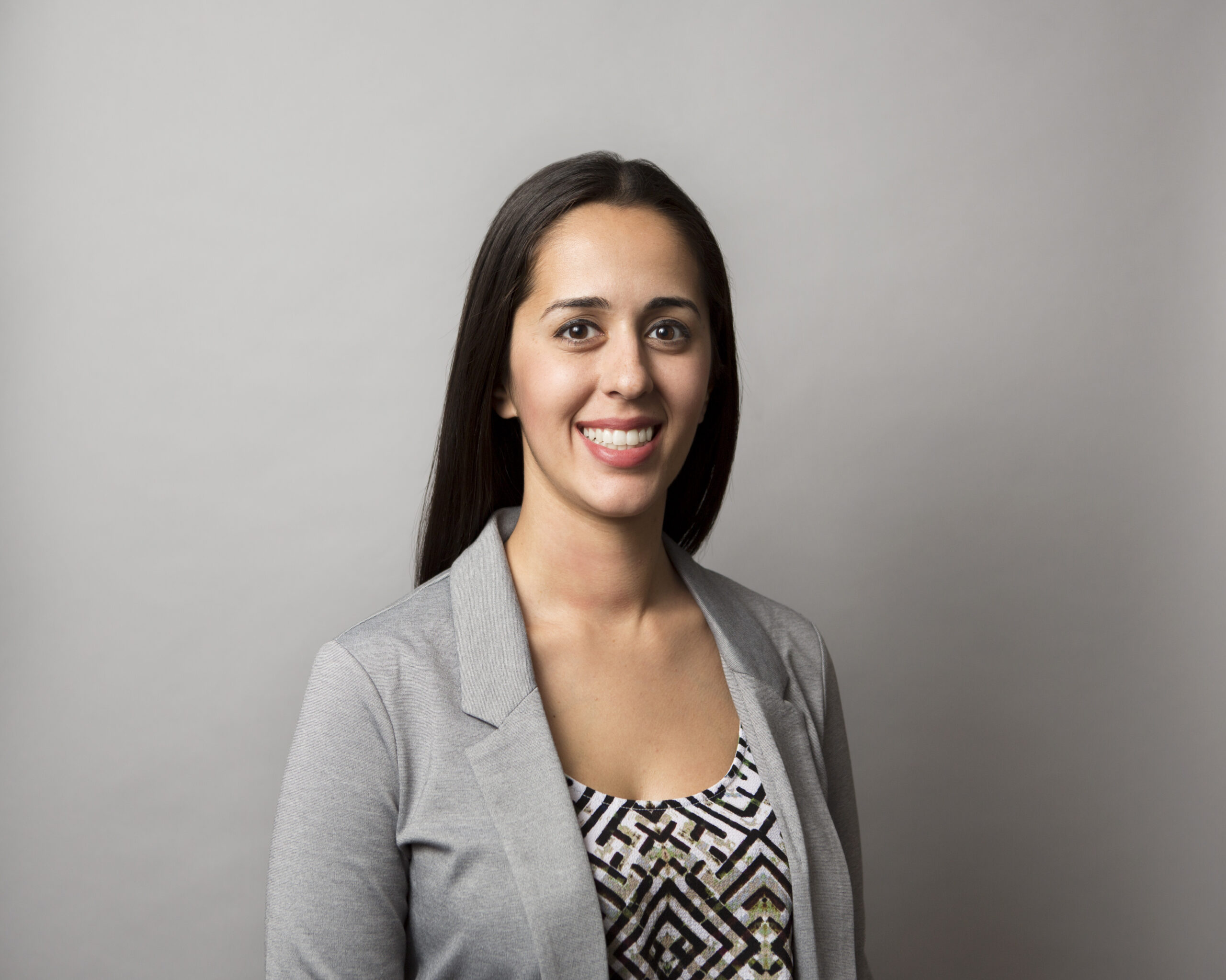
Asha Behdinan
Project Description:
This project aims to harness artificial intelligence (AI) to support clinical decision-making for patients with vascular disease, particularly in low-resource and underserved settings where access to vascular specialists is limited. By developing and testing AI-powered algorithms that can predict outcomes and guide treatment based on clinical images and other inputs, the initiative seeks to improve early detection and management of high-risk conditions that often lead to poor outcomes such as amputation. This work builds on Asha’s doctoral research, which uses large-scale epidemiologic data and natural language processing to identify risk factors and patterns of care for patients with vascular disease in low- and middle-income countries. In partnership with vasc.AI – an AI-powered clinical decision support tool using large language models (LLMs) – we will integrate machine learning models with evidence-based guidelines to create a scalable tool that empowers frontline providers. Ultimately, this initiative aims to reduce preventable complications and promote health equity for marginalized populations globally.
Asha is a PhD candidate in the Clinical Epidemiology and Health Care Research program at IHPME. She is also a senior Vascular Surgery resident within the Surgeon Scientist Training Program. Asha is based out of the Centre for Global Health Research under the supervision of Dr. Prabhat Jha. Her PhD research is focused on understanding the burden of lower extremity amputation in low- and middle-income countries.
Asha has previously worked at the World Health Organization Regional Office for Europe, and served as a visiting professor at the University of Global Health Equity in Rwanda. She is committed to advancing health equity by focusing on reducing disparities in vascular care among marginalized and underserved populations.
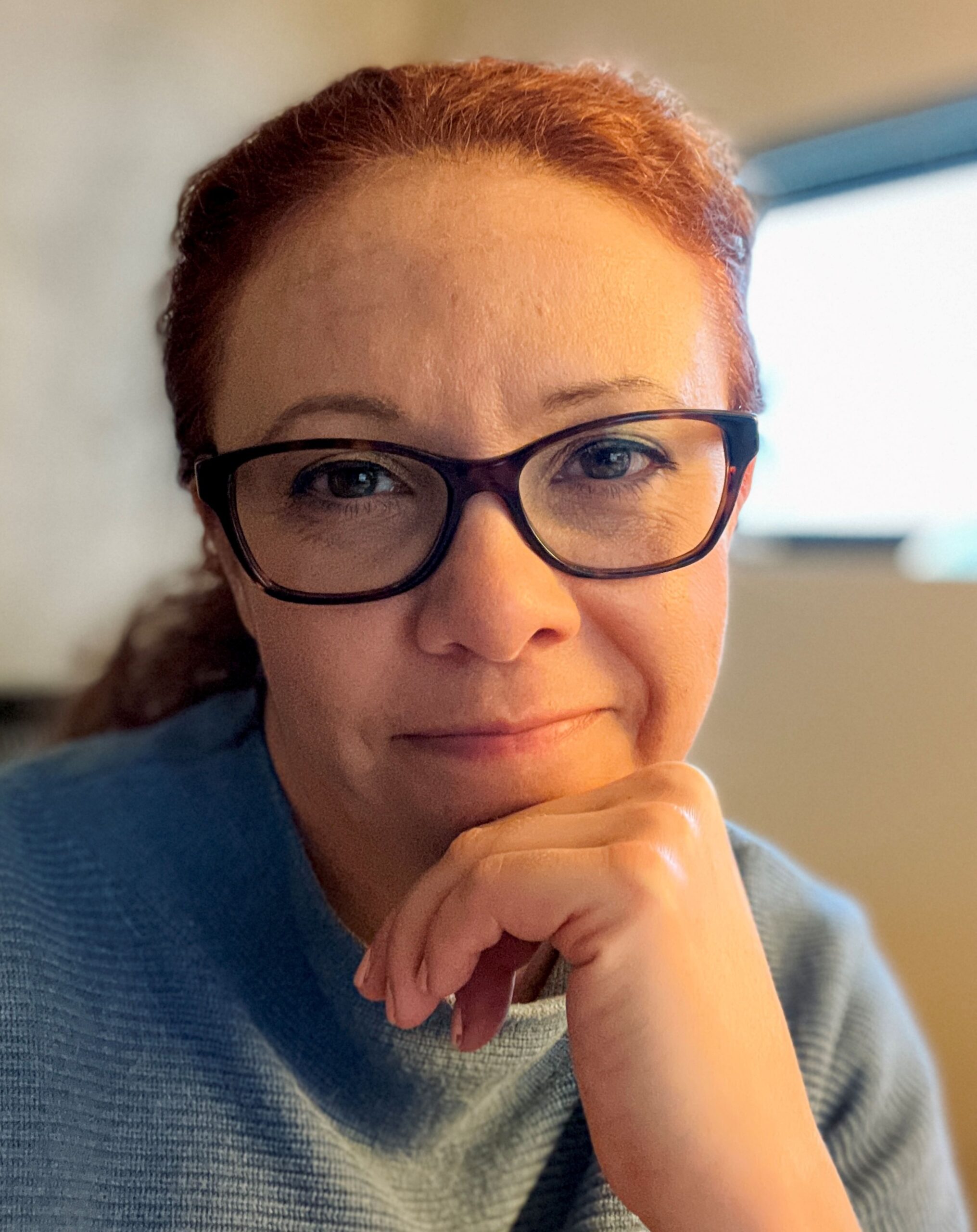
Kelly-Ann Blake
Project Description:
When people from predominantly white English-speaking countries immigrate to another English-speaking country of similar demographics, they might notice dialectal vocabulary differences like the use of the word ‘trunk’ (North America) instead of ‘boot’ (UK) or accent differences. For these speakers, such differences are not barriers to settling; however, for English speakers of countries whose race and ethnicities are non-Caucasian (e.g., India, Jamaica, Nigeria), their English dialect can hinder the ability to build a life due to linguistic stereotyping. Stigmatization of these dialects causes risk to a speaker’s cultural identity and sometimes the language.
Kelly-Ann’s doctoral research investigates speech sounds of Jamaican Creole – a dialect/language that evolved through contact of speakers of African languages and English during the era of slavery. It focuses on how speakers really sound instead of how they “should” sound. Conducting this research brings awareness to this language and validates it as a language equal to English.
Kelly-Ann’s public scholarship initiative involves sharing this research with Jamaican communities in Canada and Jamaica. Through workshops for young students and adults, Kelly-Ann describes the sounds of Jamaican Creole and discusses how they differ from Canadian English speakers and even between Creole speakers. Additional content includes how language changes over time; how Jamaican Creole is systematic, like any language; and linguistic stereotyping.
Kelly-Ann Blake is a Jamaican Canadian PhD student at the Department of Linguistics, University of Toronto. Her international presentations include work on syntactic prediction during reading comprehension, the semantic processing of adjectives during speech production, and how conversational partners accommodate each other during conversation. She holds a B.A. (Honours) and an M.A. in Linguistics and specializes in psycholinguistics and phonetics. Her recent doctoral research investigates sound differences in rural Jamaican Creole (or Patois/Patwa) dialects. In addition to her academic work, she is an advocate for students with disabilities.
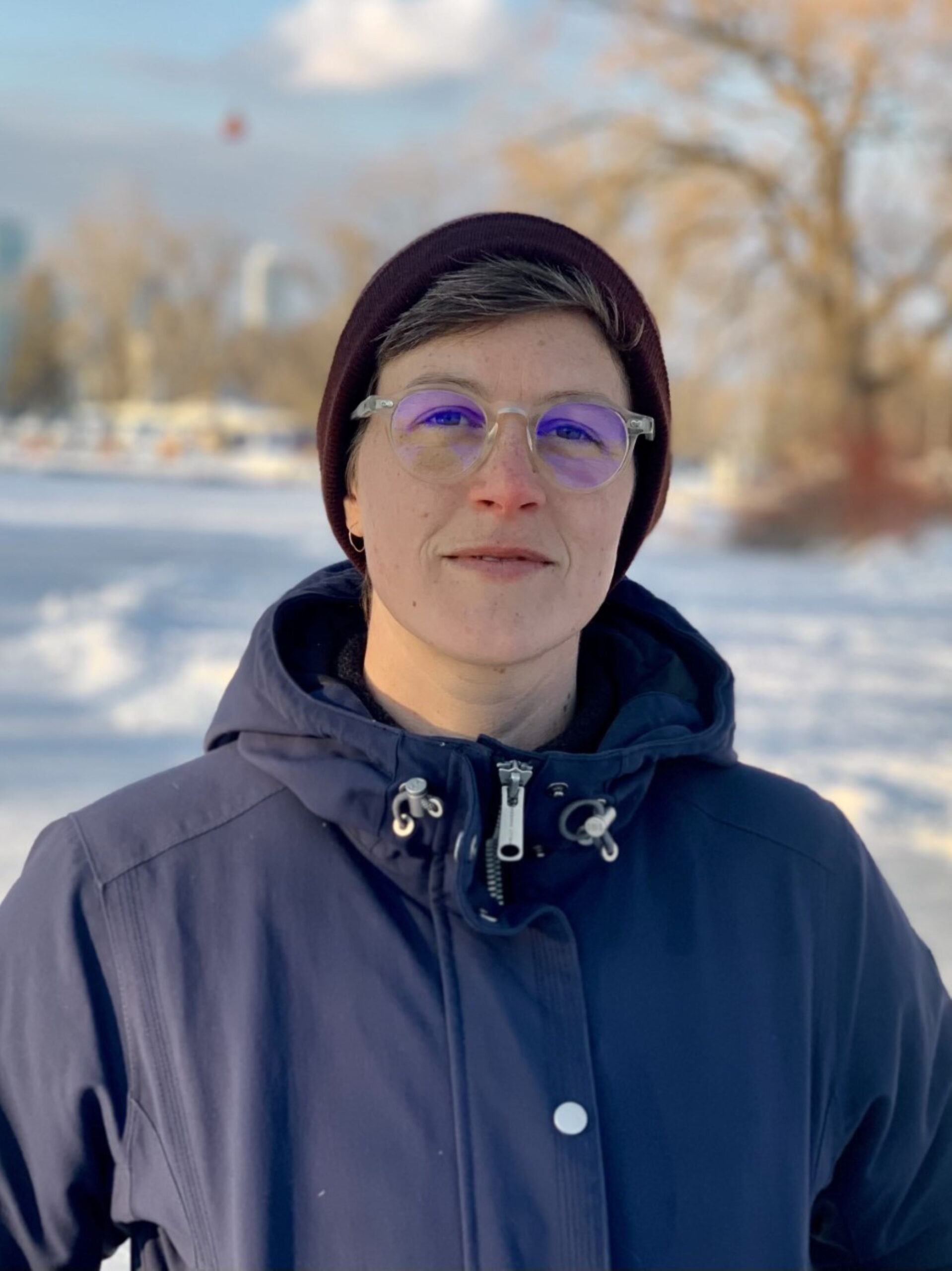
Bronwyn Clement
Project Description:
Where the Don River meets the harbour a new, ‘naturalized’ river mouth has been constructed to provide flood protection for Toronto’s port lands. The scale of the project – the vision of combining river restoration with flood protection and infrastructure development – is a precedent-setting undertaking. A participatory walking series will prompt participants to collectively explore and think critically about the river mouth: to learn about how varied ideas about the Don River have unfolded over time; how different understandings of Land, environment, and climate change are shaping the river mouth project; and to consider how residents and walk participants individually and collectively relate to the river.
The walking events are a tangible way of engaging with the space, being in relation with this body of water, as well as thinking expansively about the history of the city and the current processes of city building. The walks will entail short, informal talks with a range of waterfront activists, city planners and conservation staff, Indigenous leaders, and place-based arts practitioners while also encouraging participants to record observations, sketches, and engage in dialogue. The embodied act of walking offers ways to think critically about place and to ‘think in the presence of others.’
Bronwyn Clement is a PhD candidate in human geography in the Department of Geography and Planning where she is also a teaching assistant and course instructor. Bronwyn’s dissertation takes the Don River/Waasayishkodenayosh mouth re-naturalization project as an anchor to examine the ways in which climate change and flooding are motivating waterfront development and how the river’s ongoing agency is/can be recognized in (re)shaping Toronto. Her dissertation is part of a broader interest in water, just cities, and urban place-making. She is also a research assistant for a project on community engagement and Indigenous place-keeping in the Highland Creek watershed.
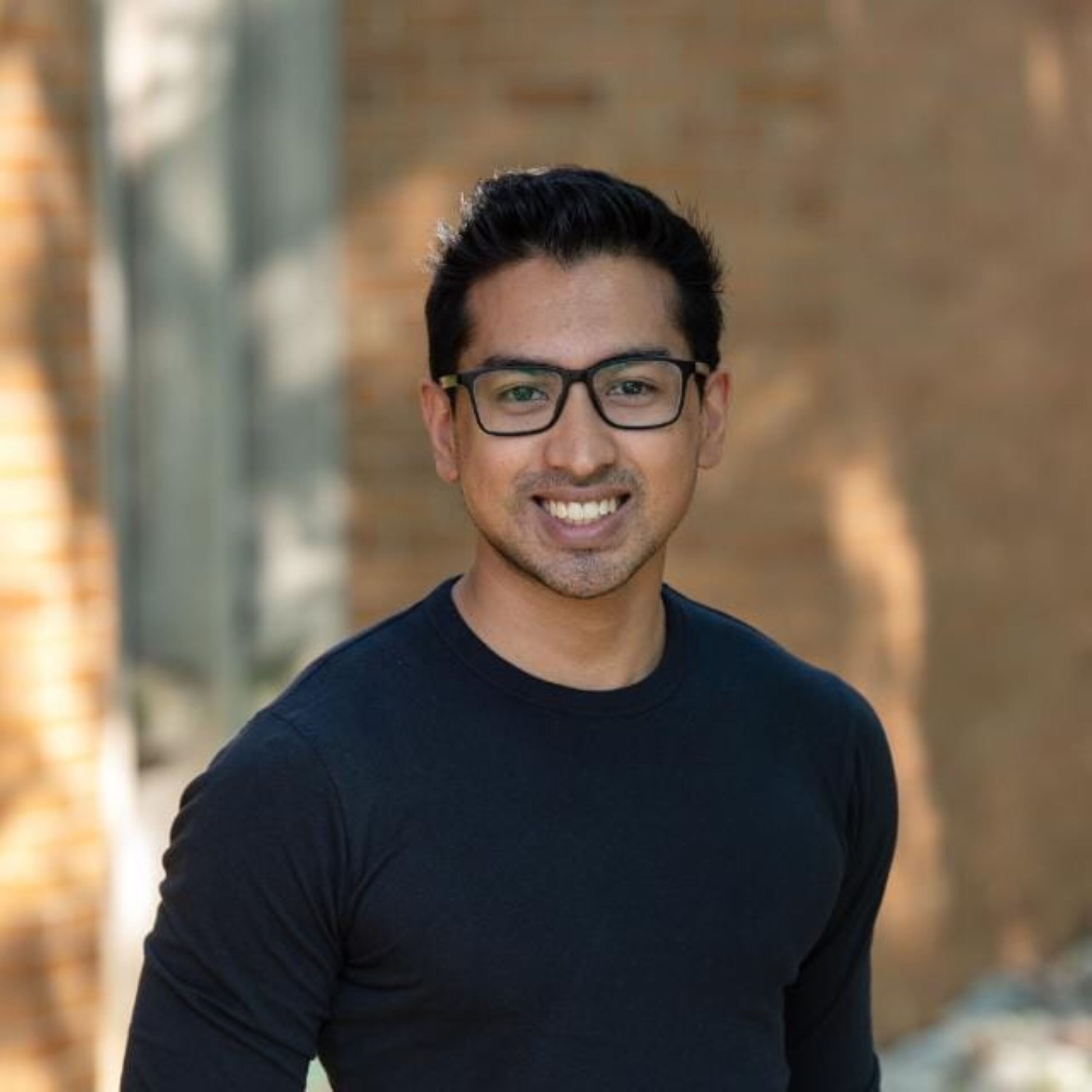
Noah Khan
Project Description:
Noah’s planned project, Hidden Inputs, aims to amplify the often-overlooked voices of data workers—essential to the development of artificial intelligence (AI) systems. Grounded in his research on the emotional experiences of data workers, the initiative, building on Miceli et al.’s Data Workers’ Inquiry, employs a participatory approach, enabling data workers to co-create narratives that reflect their emotional realities. Through online workshops, participants will receive skills training and technological support to produce creative outputs such as zines, podcasts, and comics. These works will be disseminated via a publicly accessible website and highlighted in two virtual launch events, creating an ongoing feedback loop between the annotators and the public.
The initiative emphasizes equity, diversity, and inclusion by centering marginalized voices, offering multilingual and accessible content, and addressing barriers to technology access. The Connaught PhDs for Public Impact Fellowship will fund technology stipends and professional editing to enhance output quality. The project seeks to increase awareness of labour dynamics in AI development and empower data workers with the tools and visibility to shape narratives.
Noah Khan is a PhD candidate in Social Justice Education at the University of Toronto. He is concurrently a Recognised Student at the Oxford Internet Institute in the DPhil in Social Data Science Program and a Visiting Assistant in Research at Yale University’s Program in American Studies. His research focuses on the emotional dynamics of artificial intelligence development; he examines the ways in which emotions such as love, fear, grief, etc., affect how technology gets made in multiple countries such as Canada, the US, the UK, and India.
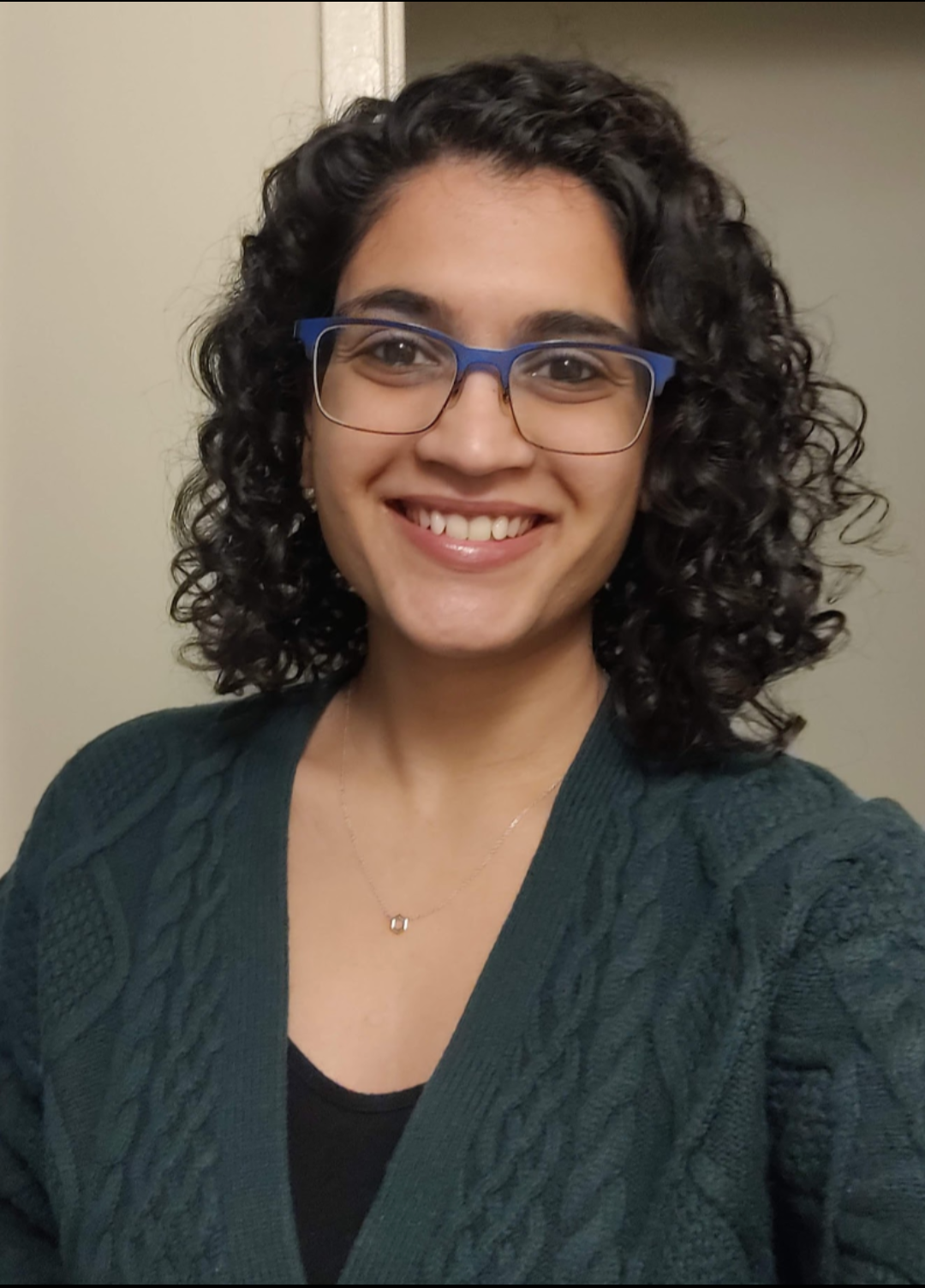
Nandita Menon
Project Description:
Nandita’s public scholarship initiative is a podcast series called COPE (Community for Outreach and Pain Education) designed to raise awareness about chronic pain and promote equitable access to pain care across Canada. Recognized by the WHO as a stand-alone disease, chronic pain remains widely misunderstood and under-addressed. The series will feature interviews with pain physicians, researchers, clinician-scientists, and individuals living with pain, exploring clinical care, research innovations, and lived experiences. COPE aims to provide accurate, accessible information and highlight available provincial and national resources.
The initiative draws directly from Nandita’s doctoral research, which investigates the biological mechanisms of pain in inflammatory dental disease using lab-on-a-chip technology. Through COPE, she hopes to extend the impact of her work beyond the lab, fostering a deeper public understanding of chronic pain.
The podcast also prioritizes equity, diversity, and inclusion by addressing disparities in pain care. Episodes will explore how sex, gender identity, ethnicity, and socioeconomic factors influence pain diagnosis and treatment, while amplifying underrepresented voices.
Grounded in her research expertise and passion for science communication, Nandita’s project seeks to build a connected, informed community of patients, clinicians, and researchers working to improve chronic pain care.
Nandita is a PhD candidate at the Faculty of Dentistry, with a background in Chemical & Biomolecular Engineering (M.Eng., National University of Singapore) and Biotechnology (B.Eng., BITS Pilani). Her research investigates neuroimmune interactions in inflammatory disease, with a focus on how stromal cells influence neural and immune signalling. She is also developing 3D platforms to study tissue responses to novel biomaterials. Committed to science communication, Nandita strives to make complex research accessible and meaningful. In 2023, she received the People’s Choice Award in the Three Minute Thesis competition at U of T for her ability to engage broad audiences with her work.
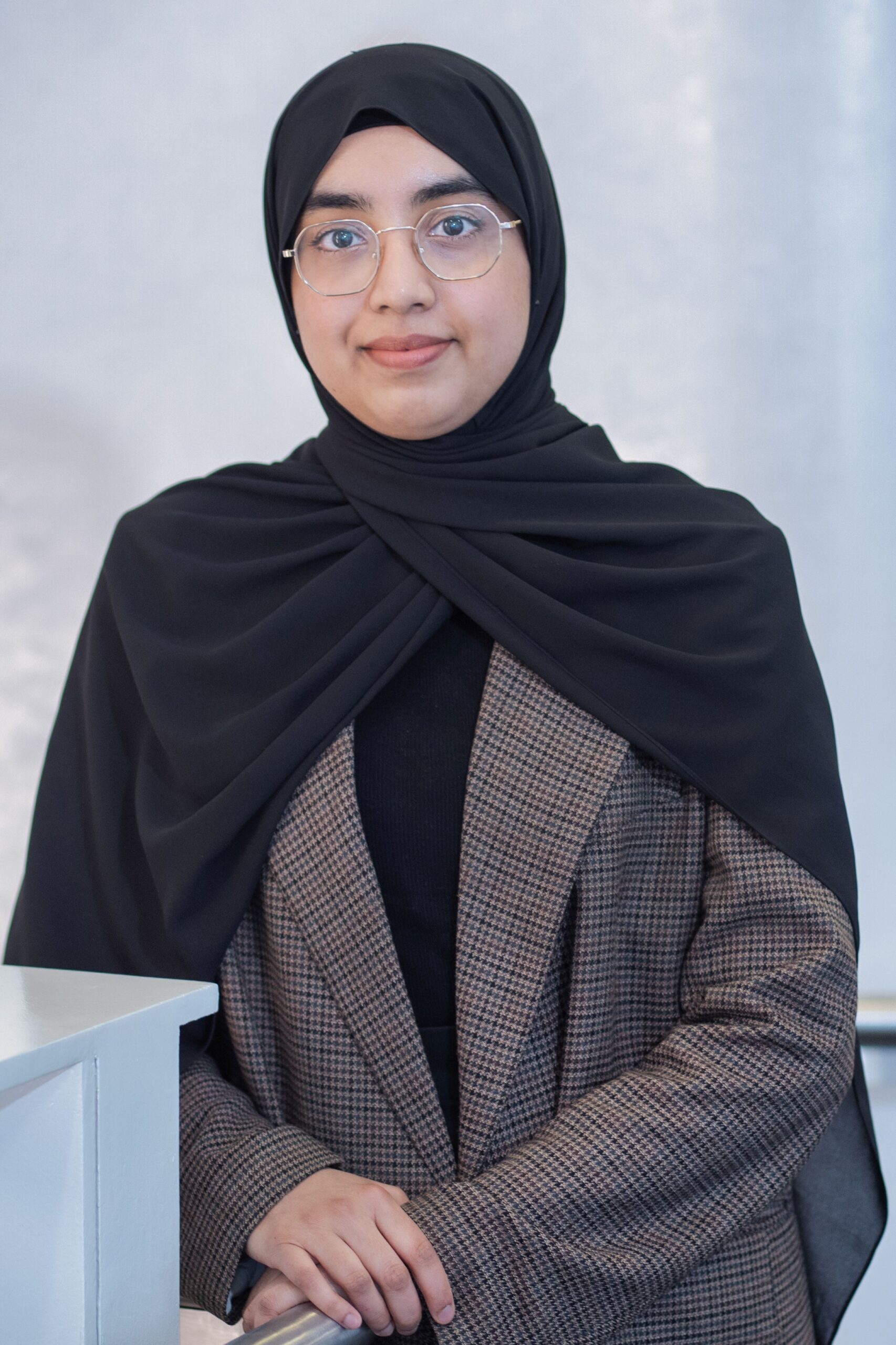
Fareha Nishat
Project Description:
Fareha’s public scholarship project will co-create a Digital Knowledge Hub with young people with disabilities. This online platform will feature two components: (1) plain-language, accessible summaries of her dissertation findings, and (2) digital stories where youth share their lived experiences with disability and/or chronic disease through visual arts, video, photography, and oral narratives. By centering the voices of youth with disabilities, the project advances the principle of “nothing about us without us,” promoting inclusion and amplifying perspectives often overlooked in research. Youth involved in this project will have the opportunity to develop skills in research literacy, advocacy, and storytelling, while fostering self-expression, building confidence, and gaining a sense of empowerment. The Hub, hosted on Fareha’s supervisor Dr. Hilary Brown’s lab website, will integrate data-driven insights with personal narratives to create a rich, accessible resource for the community.
Fareha Nishat is a PhD candidate in Epidemiology and a CIHR Canada Graduate Scholar at the Dalla Lana School of Public Health. She holds an MPH in Epidemiology and an HBSc in Neuroscience and Mental Health from the University of Toronto. Her research focuses on the intersection of disability and chronic disease among adolescents and young adults. Using health administrative data from Ontario, her thesis examines how disability affects the accumulation and patterns of chronic diseases. Fareha’s passion for child and adolescent health is also reflected in her work as a Clinical Research Project Coordinator at the Hospital for Sick Children.
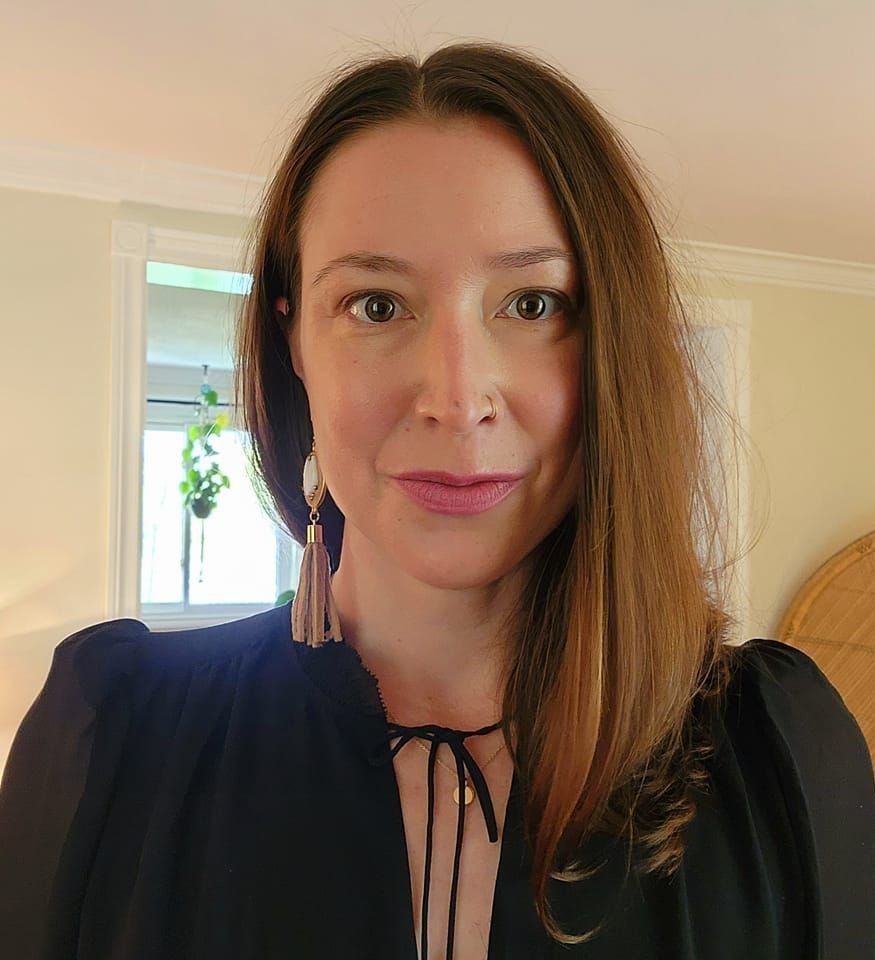
Sarah Proulx
Project Description:
Sarah’s proposed public scholarship initiative aims to present her research findings to the Anishinabek of Zhiibaa’onaaning in a community historical gathering. Her dissertation research focuses on past and ongoing forms of settler colonial erasure of the long-standing and continuous occupation of Zhiibaa’onaaning through an examination of three main themes. First, the history of settler colonialism, such as legislation and policy, and its impact on her ancestors in Zhiibaa’onaaning. In particular, the mechanisms used by the colonial government to deny her ancestors nationhood and the impacts of race-based policy. Second, Sarah’s project aims to investigate the role of archaeology in erasing Anishinaabe histories in her ancestral community of Zhiibaa’onaaning. She contextualizes the colonial legacy of the discipline of archaeology and its role in larger settler colonial agendas established to eliminate Indigenous cultural and ceremonial traditions. Finally, her project investigates current heritage and archaeological protection legislation. In Ontario, it is the responsibilities of municipalities to ensure the protection of archaeological heritage within its jurisdiction. These frameworks do not align with Indigenous Peoples rights to protect their cultural heritage, which are affirmed in both Section 35 of the Constitution Act or the United Nations Declaration on the Rights of Indigenous Peoples UNDRIP.
Sarah Proulx is Anishinaabe from Zhiibaa’onaaning, today more widely known as Killarney, Ontario. She is currently a PhD Candidate in Anthropology. She holds a bachelor’s degree in socio-cultural anthropology and archaeology and a master’s degree in museum studies, both from the University of Toronto. Prior to undertaking her doctoral research, she worked as a heritage and archaeological consultant, which lead her to advocate for the protection of archaeological, sacred, and burial sites in her ancestral community. Sarah’s research area’s include settler colonial politics of recognition, the colonial legacy of archaeology, rematriation frameworks, Anishinaabe socio-political systems, and Indigenous Peoples’ rights.
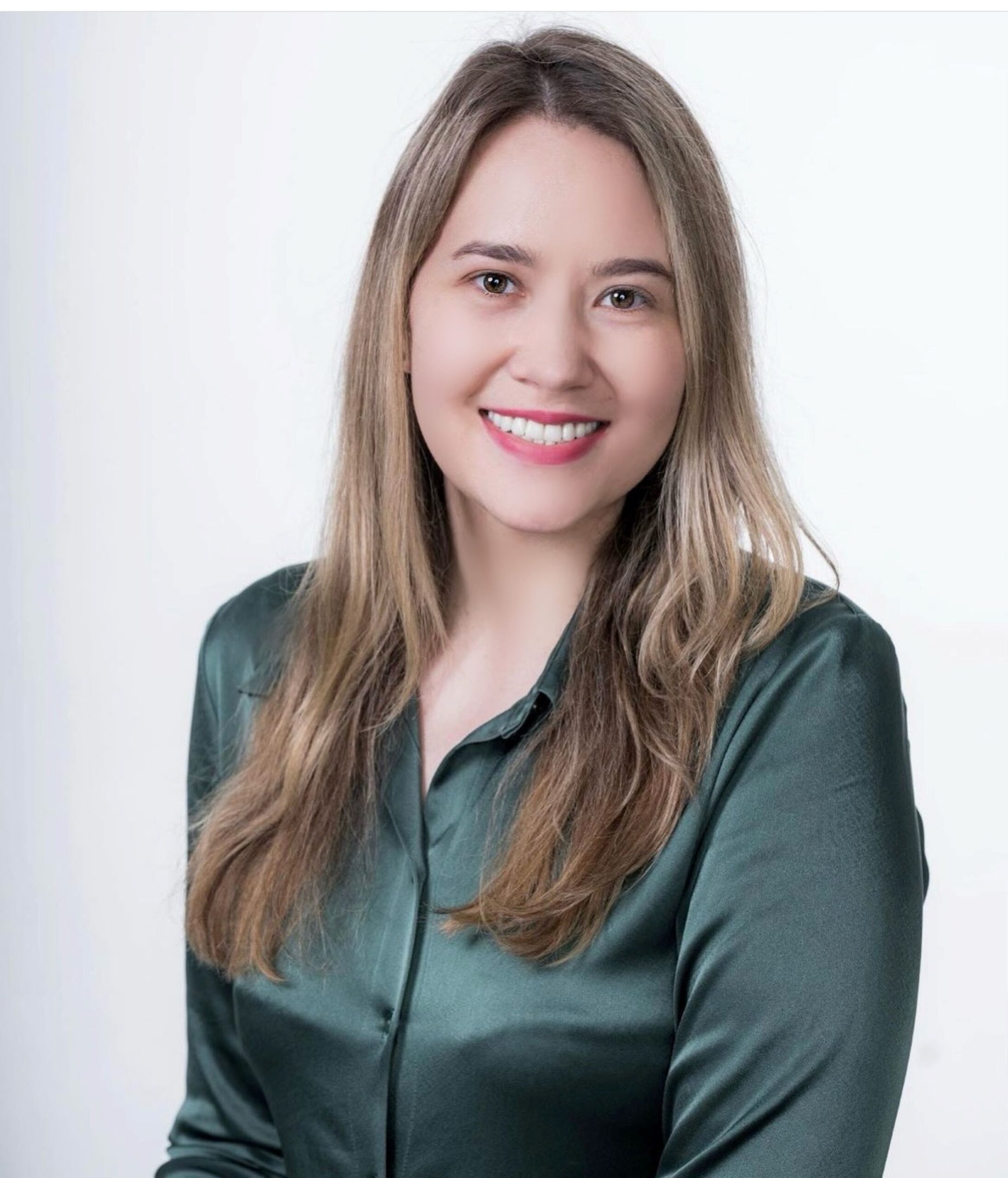
Catherine Stratton
Project Description:
While each rare disease affects less than 1 in 2000 individuals, collectively these diseases are not rare, affecting 1 in 12 Canadians over their lifetime. Individuals with rare diseases often face substantial barriers, including lengthy diagnostic journeys , and a lack of treatment options due to poor understanding of these conditions.
This underscores the critical need for coordinated data collection. Currently though, there are no evidence-based standards for the development of rare disease patient registries. Additionally, patient partners lead important work in advancing rare disease research, and have deep connections to their communities, but are still not always engaged as equitable partners or research leaders. Given these factors, the proposed public impact initiative is to co-create a comprehensive toolkit for the design and sustainability of patient-led rare disease patient registries.
The toolkit will be developed through interactive workshops with RD patient partners and disseminated through a social media effort. The toolkit aims to foster a sense of ownership and agency for patients over their health information. By creating a toolkit for patient-led registries, this initiative will empower patients to ask their own questions and inform the direction of research for these neglected diseases.
Catherine Stratton is a PhD candidate in Epidemiology at the Dalla Lana School of Public Health. She is a Pierre Elliott Trudeau Doctoral Scholar, a recipient of the CIHR Doctoral Scholarship, and an incoming Massey College Junior Fellow. Catherine is deeply passionate about research that engages patients actively throughout the research process. Catherine’s doctoral research is focused on the design and optimization of patient registries for rare diseases. She is the Vice President and Research Chair of the Moyamoya Foundation. Catherine holds a Bachelor of Arts from the University of Toronto and a Master of Public Health from Yale University.
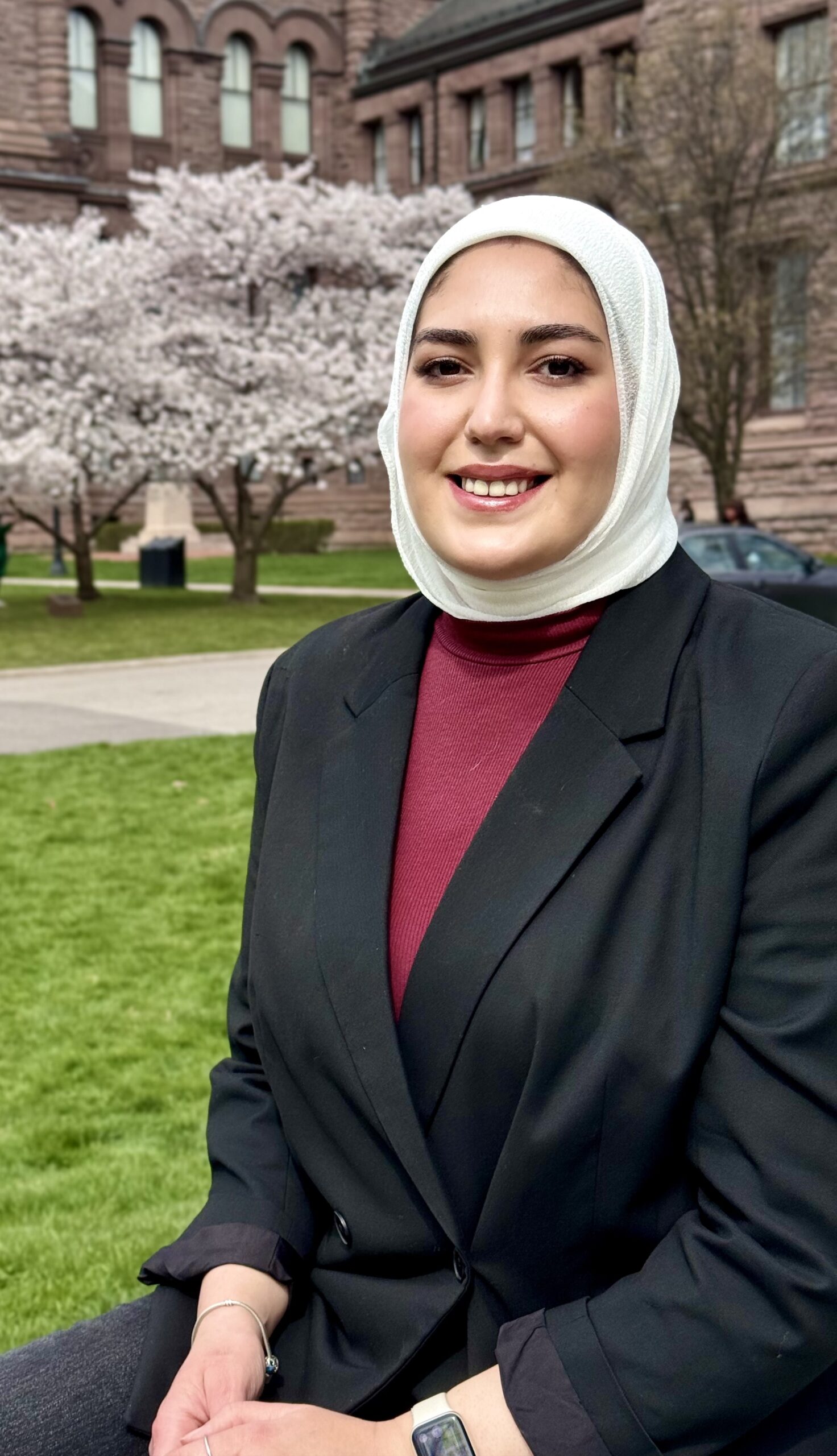
Donia Obeidat
Project Description:
Globally, skilled trades workers face a high risk of work-related musculoskeletal disorders (WMSDs), a leading cause of disability, absenteeism, and early retirement. Occupational hazards and poor ergonomics significantly contribute to these conditions. To reduce risk and support workers health, practical and accessible resource is essential.
This initiative aims to develop a Physical Health Toolkit specifically for electricians. During the fellowship, Donia will translate findings from her PhD research on WMSDs among electricians into a comprehensive, evidence-based resource. The toolkit will cover common WMSDs, their risk factors, and ergonomic challenges encountered in daily electrical work.
It will also include an exercise guide, practical ergonomic tips, and general physical health recommendations. To support access to care, it will feature contact information for specialized rehabilitation healthcare providers. Developed in collaboration with the Ontario Electrical League (OEL), the toolkit will be available online through the OEL website and distributed in print at OEL events.
This project closes the gap between scholarly research and practical implementation by converting research findings into useful tools. It aims to empower electricians with knowledge and strategies to reduce the risk of WMSDs, ultimately improving their occupational health, well-being, and long-term work sustainability.
Donia Obeidat is a devoted occupational therapist, committed to enhancing workers’ physical health, ergonomics, and overall quality of life while reducing disability. She is currently pursuing a PhD in Rehabilitation Science at the ReSTORE Lab within the Department of Occupational Science and Occupational Therapy. Donia is supported by a scholarship from Jordan University of Science and Technology, awarded in recognition of her academic excellence. Under the supervision of Dr. Behdin Nowrouzi-Kia, Donia’s current research examines the impact of work-related musculoskeletal disorders on electricians’ job performance and daily life participation.

Emmanuel Taiwo
Project Description:
Millions of old, energy inefficient, and carbon-intensive residential buildings exist across Canada today; and with more than 80% of Canada’s 2050 predicted building stock already existing, there is an immense need and opportunity to retrofit Canada’s building stock. This is necessary to achieve national and municipal resilience, climate change mitigation, and decarbonization goals.
While several government initiatives have been established across Canada to help accelerate the uptake of home energy efficiency retrofits, many of these initiatives have had limited success in reaching low-income households, underserved groups and marginalized communities. Although many factors account for this limited success, inaccessibility of information and shortage of awareness about these initiatives amongst underserved communities is a major barrier.
As such, Emmanuel’s public scholarship initiative aims to help educate and empower residents of a selected historically underserved, racialized community in Scarborough, Toronto, about the need and opportunity for home energy retrofits. It will also help residents understand available avenues for making their homes climate-smart, healthier and more livable through energy retrofits. This way, Emmanuel will help foster retrofit equity for hundreds of Torontonians in the neighborhood and accelerate progress towards municipal energy, climate and net-zero goals.
Emmanuel Taiwo is a Vanier Scholar. His doctoral research investigates equity and justice barriers in climate and energy transitions through community-oriented, whole-of-society approaches. He previously served as climate advisor to the UK Government in Nigeria, where he also led and managed a £66 million solar energy program. Emmanuel has held fellowships with Massey College, the Schwartz Reisman Institute for Technology and Society, and the CERC Network for Equity in Sustainability Transitions. He completed an MSc in environmental management with distinction from Greenwich as a Commonwealth Scholar and an MPP from the University of Oxford as an Africa Initiative for Governance Scholar.
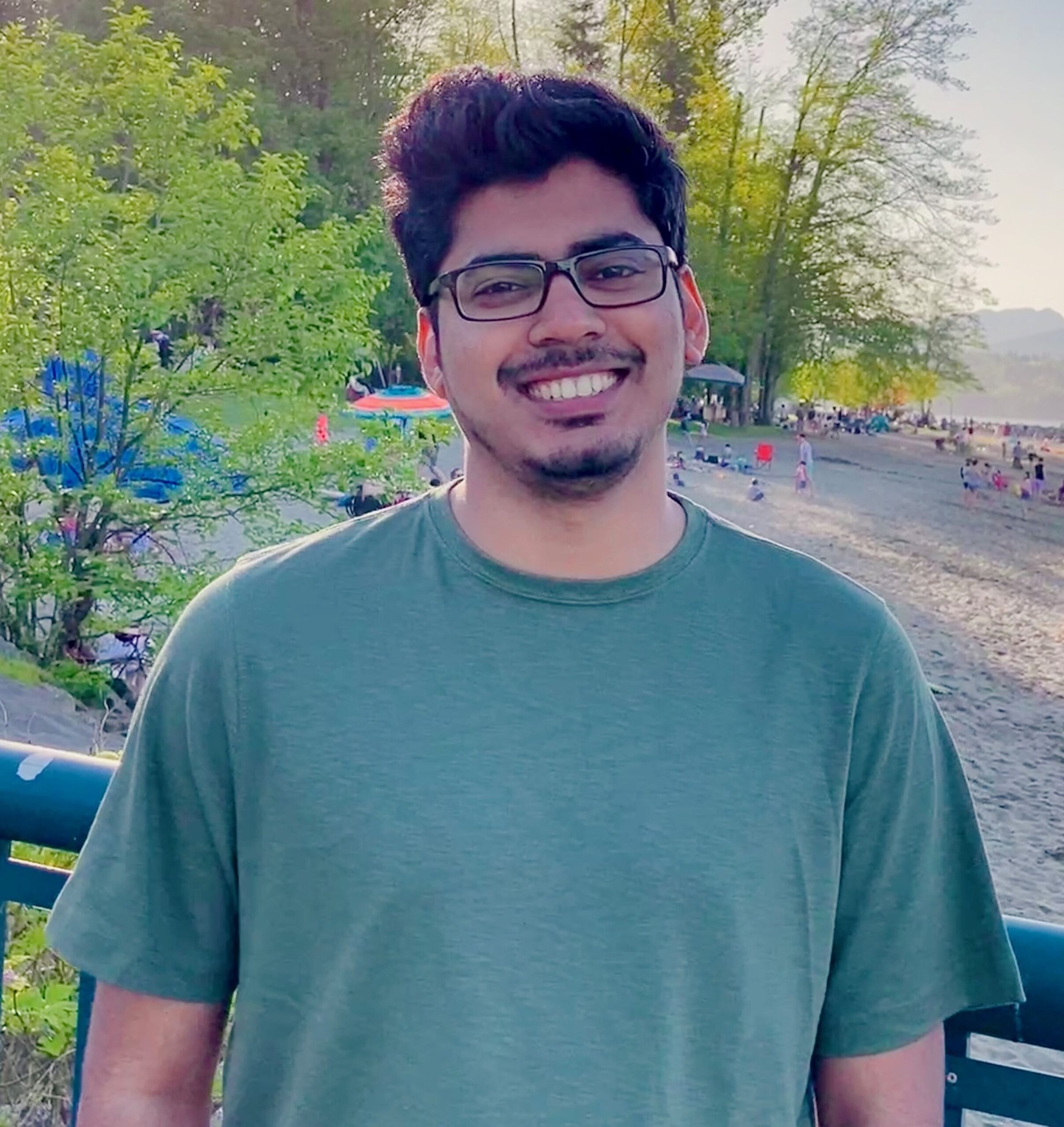
Ashique Thuppilikkat
Project Description:
Outdoor gig workers in Indian cities confront the acute intersection of climate change impacts and socio-economic marginalization. While urban cities grapple with scorching heat waves, hazardous air quality, and recurrent floods, gig workforce such as food delivery riders and ridesourcing drivers—disproportionately drawn from low-income, migrant, and caste-oppressed communities—experience compounded vulnerabilities. Lacking adequate social security protections, they endure both environmental hazards and systemic discrimination, including denied access to basic amenities (e.g., water and restroom) and exclusion from urban and labor policies.
Through participatory design workshops and interviews with Kolkata’s gig workers, supplemented by analysis of environmental data, Ashique’s project aims to develop (a) a community-generated map identifying real-time hazard zones, rest stops, safe spaces, and health resources for gig workers; and (b) a policy brief for worker unions and governments, offering actionable insights into environmental hazards, the intersection of climate change with working conditions, and socio-economic exclusions. Supported by the Connaught PhDs for Public Impact Fellowship, the public-facing deliverables will be disseminated in local languages (Bengali and Hindi) and hosted at www.streetlab.tech.
Ashique Ali Thuppilikkat (he/him) is a doctoral student in the Faculty of Information at the University of Toronto. He holds an MPhil in Political Science from Jawaharlal Nehru University in New Delhi, India. His research examines the role of technology in worker resistance and unionization amid the platformization of urban life. Specifically, he investigates how digital tools can support unions and workers in location-based labor platforms to organize and resist—or confront—the impacts of climate change on their working conditions. A recipient of the 2024 SDGs@UofT Student Awards Program, his research has also been supported by the School of Cities Graduate Fellowship. He is also the co-founder of SAFAR, a research-action center based in West Bengal, India.
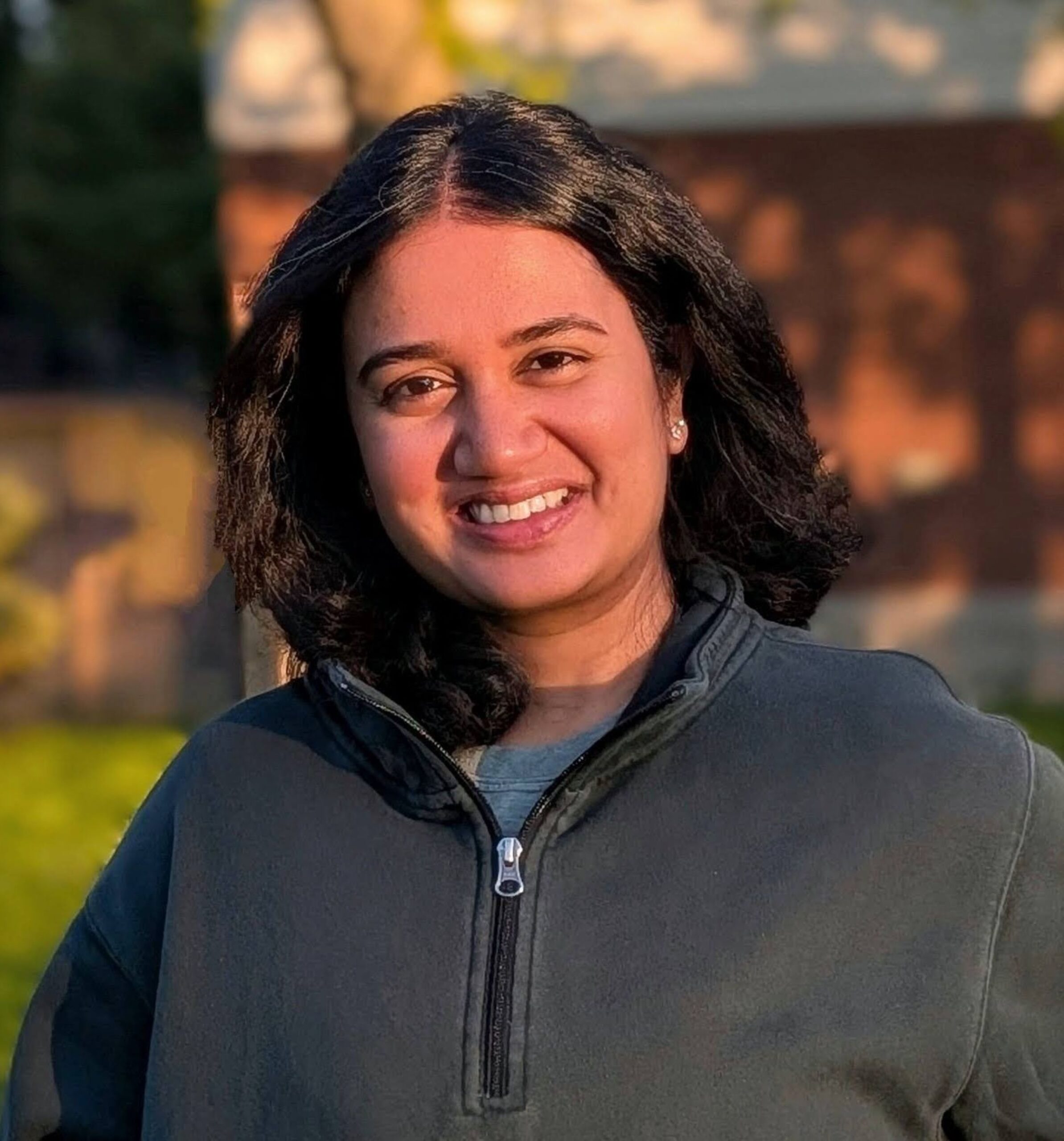
Shereen Xavier
Project Description:
Sheeren’s project explores how urban agriculture, wild pollinator conservation, and culturally significant food production intersect to support sustainable and equitable food systems. Focusing on urban farms in Scarborough, the initiative engages with local communities through workshops, digital tools, and resource guides that highlight the vital role of wild pollinators in enhancing crop yields and promoting food sovereignty.
Drawing on Shereen’s doctoral research into insect-mediated ecosystem services, including pollination and biological control, the project translates scientific insights into practical, community-driven strategies. By collaborating with urban farming programs such as the Malvern Family Resource Centre and the Centre for Immigrant and Community Services, it ensures the resources are culturally relevant and accessible.
The project emphasizes food sovereignty—supporting communities’ rights to define their own food systems—by empowering farmers to cultivate culturally important crops while fostering pollinator-friendly practices that boost productivity and biodiversity. This approach addresses urban food insecurity by improving access to fresh, culturally meaningful produce and strengthening ecological health. Ultimately, the initiative aims to bridge academic research and community action, fostering resilience and sustainability in urban food systems.
Shereen Swati Xavier is a PhD student at the University of Toronto Scarborough, where her research focuses on the role of urban agriculture in supporting beneficial insect communities and enhancing biodiversity. With academic training in entomology and forest ecology from institutions in India and the United States, her work spans ecological research, science communication, and community engagement. She has collaborated with farmers, educators, and policy stakeholders to promote sustainable land use and insect conservation. Rooted in a lifelong passion for nature and biodiversity, Shereen is committed to advancing ecological resilience through research that bridges science, practice, and public awareness.
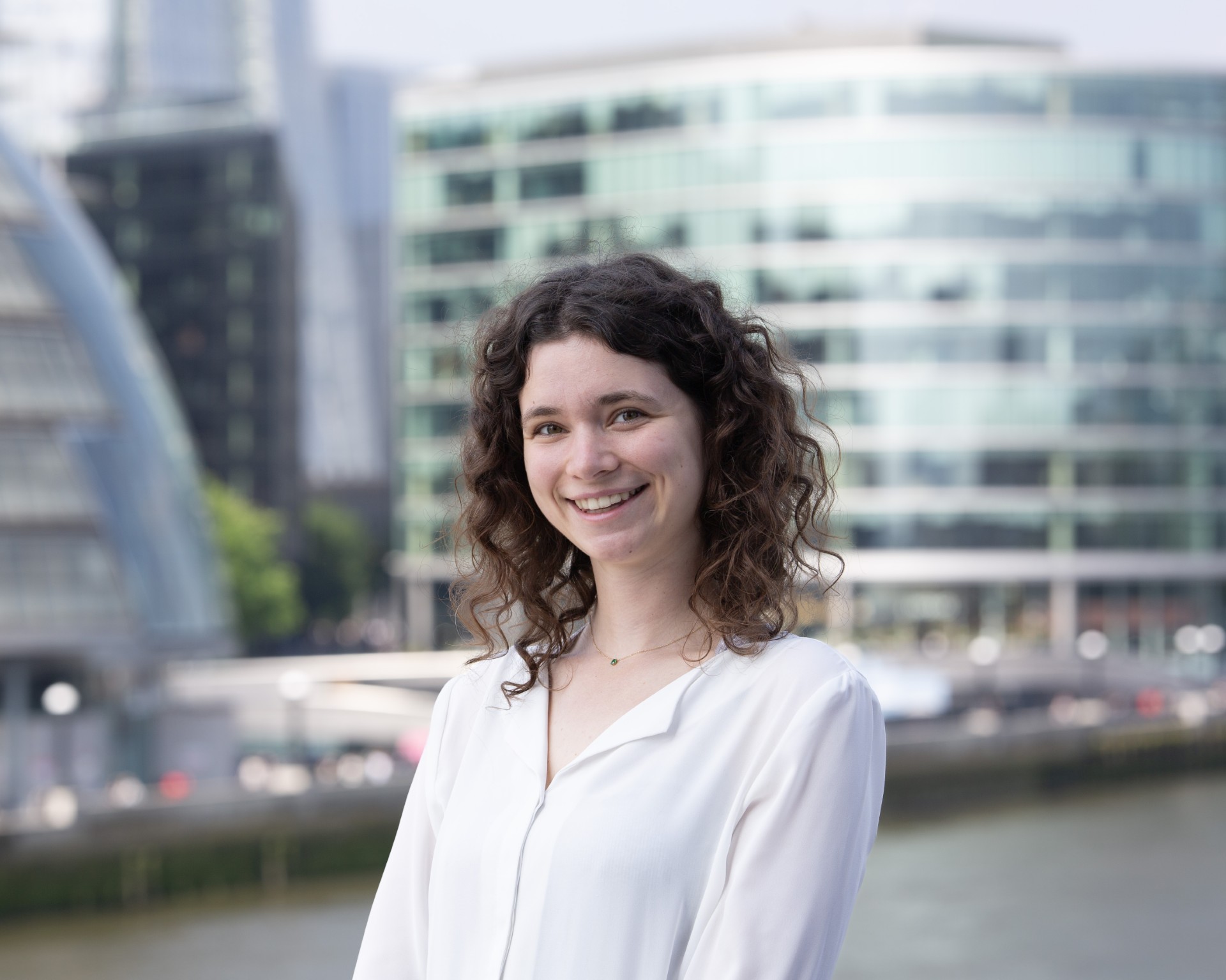
Hanne Bartels
Project Description:
Hearing loss affects millions of children worldwide and extends beyond the auditory system to challenge social and emotional functioning. Approximately two per 1000 newborns suffer permanent hearing loss, leading to developmental consequences. Unfortunately, late diagnosis is common. Hanne’s fellowship will address this issue by creating a new season of the Hear Here Podcast, based in Archie’s Cochlear Implant Lab. This season will be specifically designed to engage young parents and raise awareness about childhood hearing loss.
Episodes will feature expert guest speakers from various fields, including audiologists, otologists and neuroscientists. These experts will delve into several aspects of hearing loss, including its primary causes, the impact on the developing brain, early signs, and available treatment options. Additionally, the podcast will host interviews with families who have experienced the impact of hearing loss firsthand, offering an inspirational platform for the exchange of personal stories. By creating this important season of the Hear Here podcast, we hope to bridge the gap between scientific research and public understanding, thereby enhancing awareness of hearing loss and its implications for affected children and their families.
Hanne Bartels is a dedicated young physician from Belgium. Following her MD from the University of Leuven, her specific interest in pediatric otology has driven her to pursue a PhD at the University of Toronto’s Institute of Medical Science.
Aspiring to a career as a physician-scientist, she has participated in various research projects, resulting in conference presentations and publications. Her doctoral research, conducted at the Hospital for Sick Children under supervision of Dr. Karen Gordon, investigates the effects of asymmetric hearing loss on the developing brain. With her research, Hanne’s ultimate goal is to positively influence the lives of young patients facing asymmetric hearing loss.
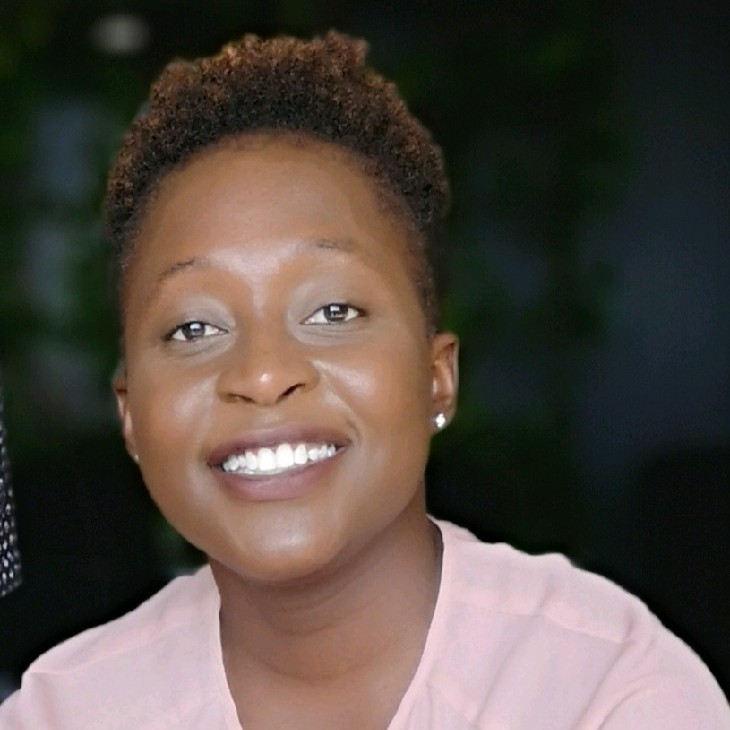
Rhonda Boateng
Project Description:
During the fellowship year, Rhonda will develop a public scholarship initiative aimed at engaging Black Canadian youth through digital art workshops. These workshops will combine experimental worldbuilding, creative coding, and interaction design with a thematic focus on navigating the mental health system. Participants will explore coding in various art forms, such as music, performance, and literature, using tools like p5, Processing, and live coding platforms. The goal is to help participants express their mental health experiences through art and technology.
Rhonda will oversee the initiative’s management, curriculum creation, communications, and evaluation, collaborating with digital artist Kofi Oduro to enhance the workshops’ content and accommodate more participants. To ensure inclusivity, the initiative will be promoted through social media and outreach to organizations serving Black youth, primarily in the Greater Toronto Area but welcoming participants nationwide.
Rhonda Boateng is a doctoral student in Health Systems Research at the University of Toronto’s Institute of Health Policy, Management & Evaluation. With a BSc in Neuroscience and an MSc in Global Health, she has extensive experience in health research. Rhonda’s roles as a Clinical Research Project Coordinator at the Hospital for Sick Children and Research and Policy Coordinator in Ghana have refined her mixed-methods research expertise. Her work focuses on health equity and systems research, combining academic rigor with practical insights. Rhonda’s passion for health research is matched by her commitment to community engagement and stakeholder collaboration.
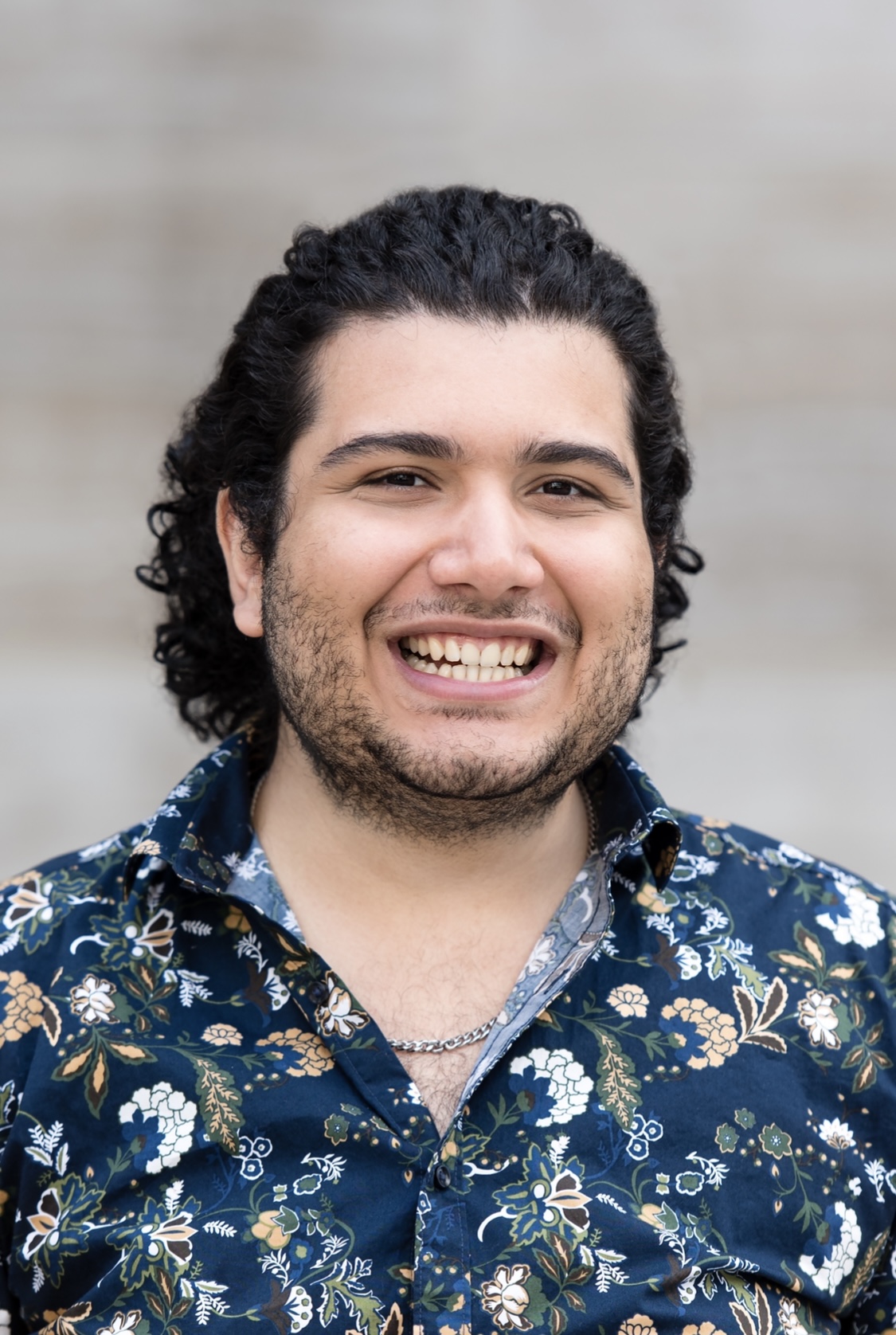
Mohammadamir (Amir) Moghaddam
Project Description:
The “Knowledge Beyond Campus Initiative” seeks to bridge the gap between advanced cancer research and public understanding. Over the fellowship year, the initiative will conduct six seminars to disseminate cutting-edge cancer research insights to diverse audiences, including patients, survivors, and the general public. The first seminar will focus on EDI training for graduate student speakers, ensuring inclusive and accessible presentations. Subsequent seminars will engage participants through discussions on the latest advancements in cancer therapeutics, fostering a two-way flow of knowledge.
Active patient involvement is a cornerstone of the initiative, with patients sharing their experiences and providing valuable feedback to shape ongoing research. Leveraging connections with healthcare non-profits such as the Canadian Cancer Society, the initiative will recruit participants and promote the seminars. Each session will be recorded and live-streamed, with captions in English and French, ensuring wide accessibility.
Throughout the year, feedback will be collected and impact measured, allowing for iterative improvements to enhance participant engagement. This initiative not only advances cancer research by highlighting patient perspectives and needs but also empowers patients and fosters public trust in scientific endeavors. By continually adapting to participant feedback, the initiative aims to create a dynamic and responsive platform that enriches both scientific research and public understanding.
Mohammadamir (Amir) Moghaddam is a Vanier Scholar, a Connaught International Doctoral Scholar, and a PhD candidate in Dr. Leo Chou’s lab at the Institute of Biomedical Engineering. His research focuses on cancer vaccine and therapeutic designs using DNA origami nanotechnology. Amir has published papers in leading journals and has secured more than $300,000 in competitive research funding and scholarships. As the President of the University of Toronto Graduate Students’ Union, Amir advocates for graduate student funding, housing security, and food security. He has been part of select Canadian Federation of Students lobbying committees, advocating for graduate students’ quality of life and research at federal and provincial parliaments.
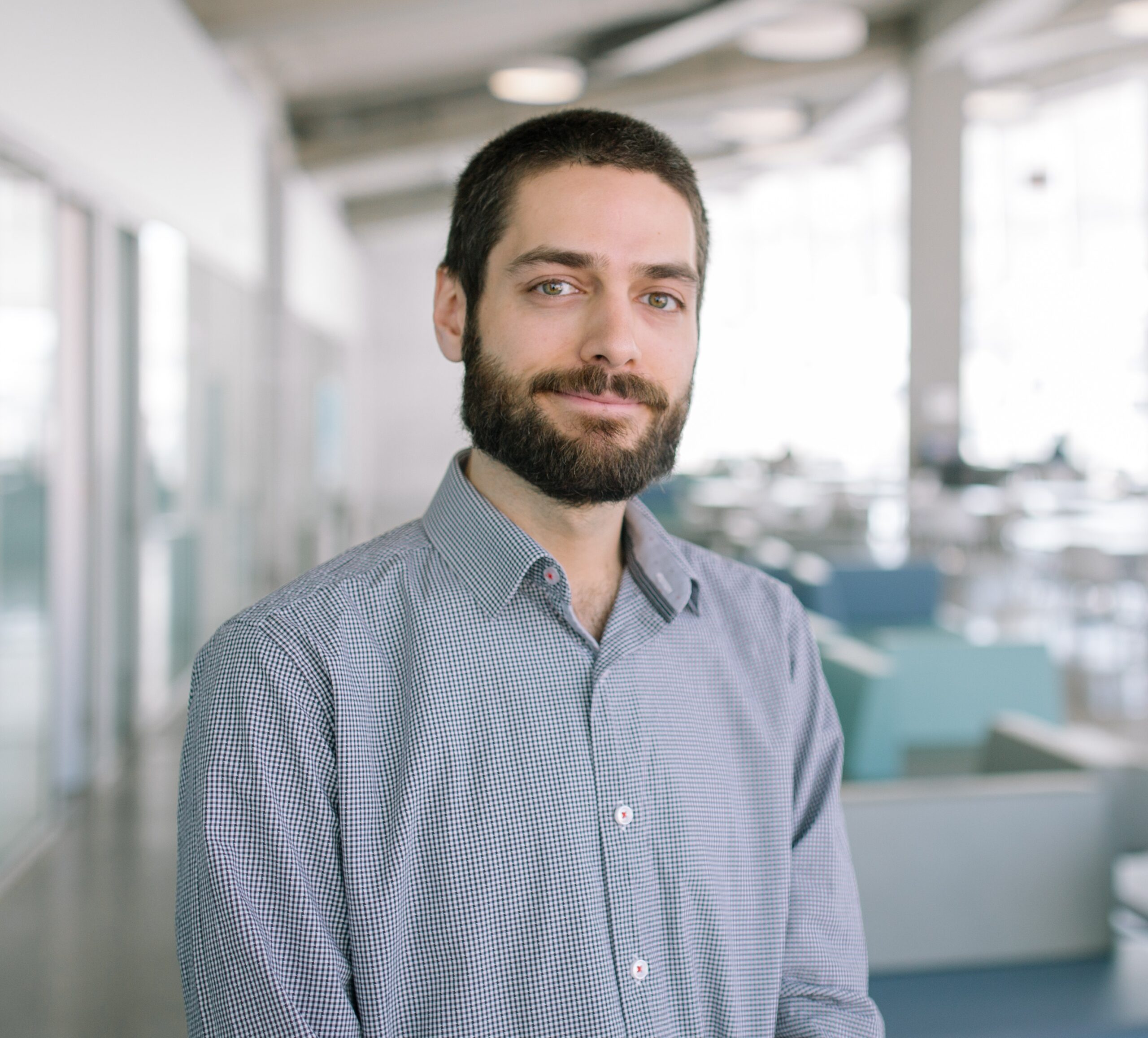
Mathew Iantorno
Project Description:
Mathew’s planned project will be a policy brief on the current state of retail automation in Toronto, Ontario. This document will present findings from his dissertation as well as his ongoing data visualization project Toronto 14-24, which employs ArcGIS to map the rapid expansion of these businesses over the past decade. Through onsite documentation of digital automats and unstaffed stores in Toronto, Mathew has already identified pressing equity-related issues caused by this automation of urban space. These range from store layouts that violate the guidelines of the Accessibility for Ontarians with Disabilities Act to forms of hostile architecture that exclude certain marginalized Canadians from patronizing these businesses. The aim of this policy brief will be to not only raise public awareness of the inequities of urban automation but also recommend new guidelines that oblige these autonomous businesses to provide minimum amenities and onsite human support.
Concurrently, this project will establish a small online research network to foster knowledge mobilization on the public impact of automation. Tentatively entitled the Automation, Media, and Technology Network (AutoMAT), this community will enable scholars and advocates to engage in timely discussion and analysis of these oft-disruptive technologies using decentralized digital communication platforms.
Mathew Iantorno (he/him) is a doctoral candidate in the Faculty of Information. His dissertation examines how novel forms of retail automation (like digital automats and delivery robots) reconfigure labour practices, consumer responsibility, and public space. This research project is currently supported by a SSHRC CGS and a Connaught PhDs for Public Impact Fellowship and has been previously supported by a Graduate Fellowship in Digital Humanities, a School of Cities Graduate Fellowship, and an Ethics of AI Fellowship. Mathew additionally designs pedagogy for classes within the digital humanities and engages in advocacy work through groups such as the Design Justice Network.
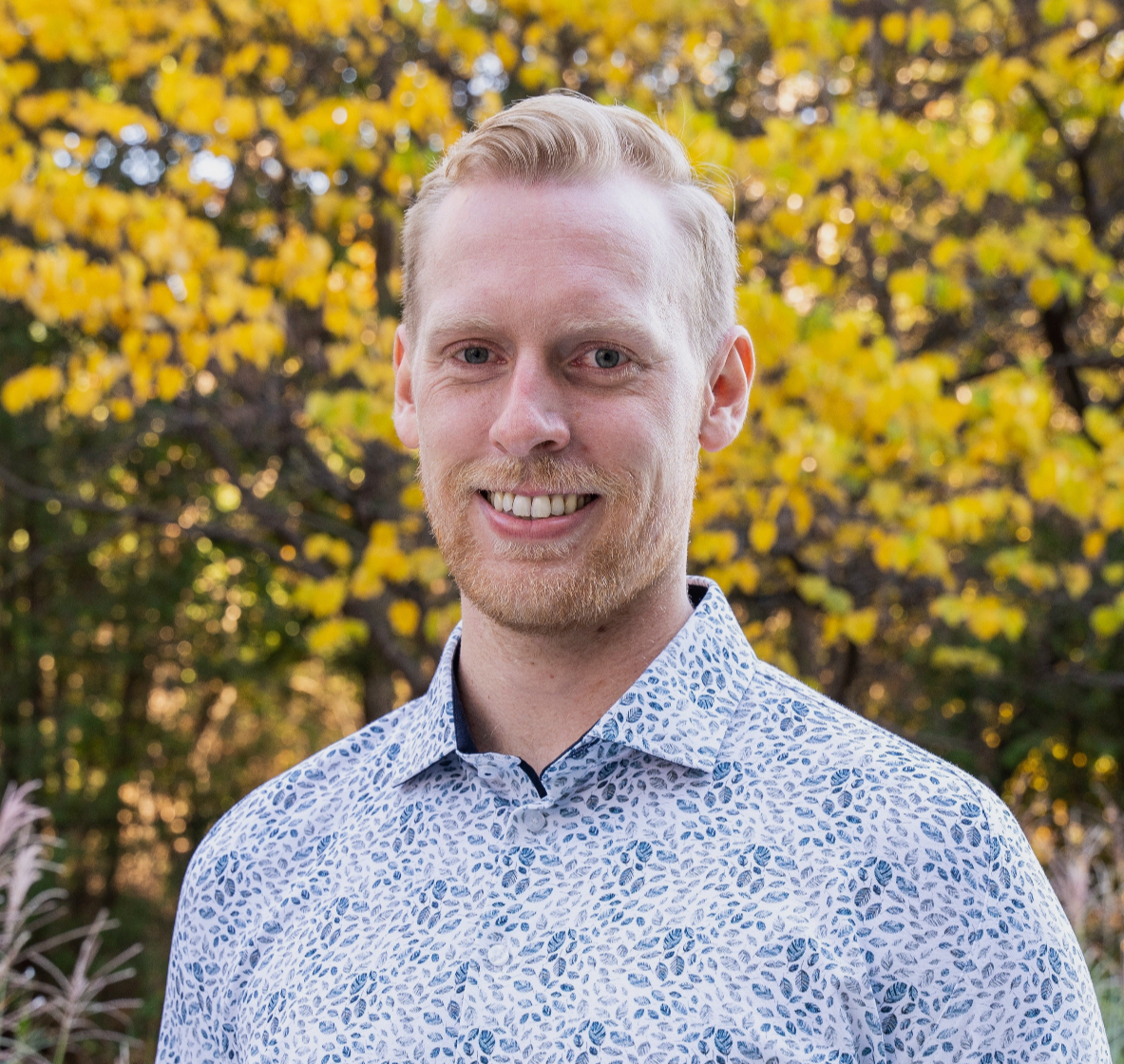
Nicolas Ivanov
Project Description:
Many students leave secondary school with a limited understanding of how science, technology, engineering, and mathematics (STEM) concepts are applied beyond the classroom. Current STEM-education practices often fail to expose students to STEM’s multifaceted nature and its diverse applications in professional and community spaces. This reinforces perceived barriers to STEM participation, particularly among groups that have historically been underrepresented within STEM fields.
The U of T Discovery educational program, a partnership between U of T engineering graduate students and Toronto District School Board teachers, aims to empower students to deconstruct these barriers by engaging secondary students in semester-long, project-based learning within U of T’s laboratory teaching facilities. This provides students with immersive learning experiences in realistic STEM environments through hands-on activities, self-directed learning, and problem-based projects with real-life applications.
Graduate students collaborate with teachers to develop and deliver educational programming that is rooted in cutting-edge research and accessible to secondary students. The program seeks to spark student interest, boost self-confidence in STEM, and enhance understanding of the post-secondary learning experience.
By studying the effect of program participation on students’ interest in pursuing future STEM opportunities and their learning outcomes, this project aims to identify effective strategies for creating impactful STEM learning experiences for secondary students.
Nicolas is a PhD candidate and NSERC Canada Graduate Scholar at the Institute of Biomedical Engineering. He holds a MASc in biomedical engineering from the University of Toronto and a BASc in electrical engineering from the University of British Columbia.
His research focuses on enhancing the clinical feasibility of brain-computer interfaces for children with disabilities. Specifically, his work seeks to develop better user-capability assessment tools and techniques to improve user performance through training.
Beyond his primary research, Nicolas is passionate about creating impactful learning experiences and has served as a director of the U of T Discovery educational program since 2019.
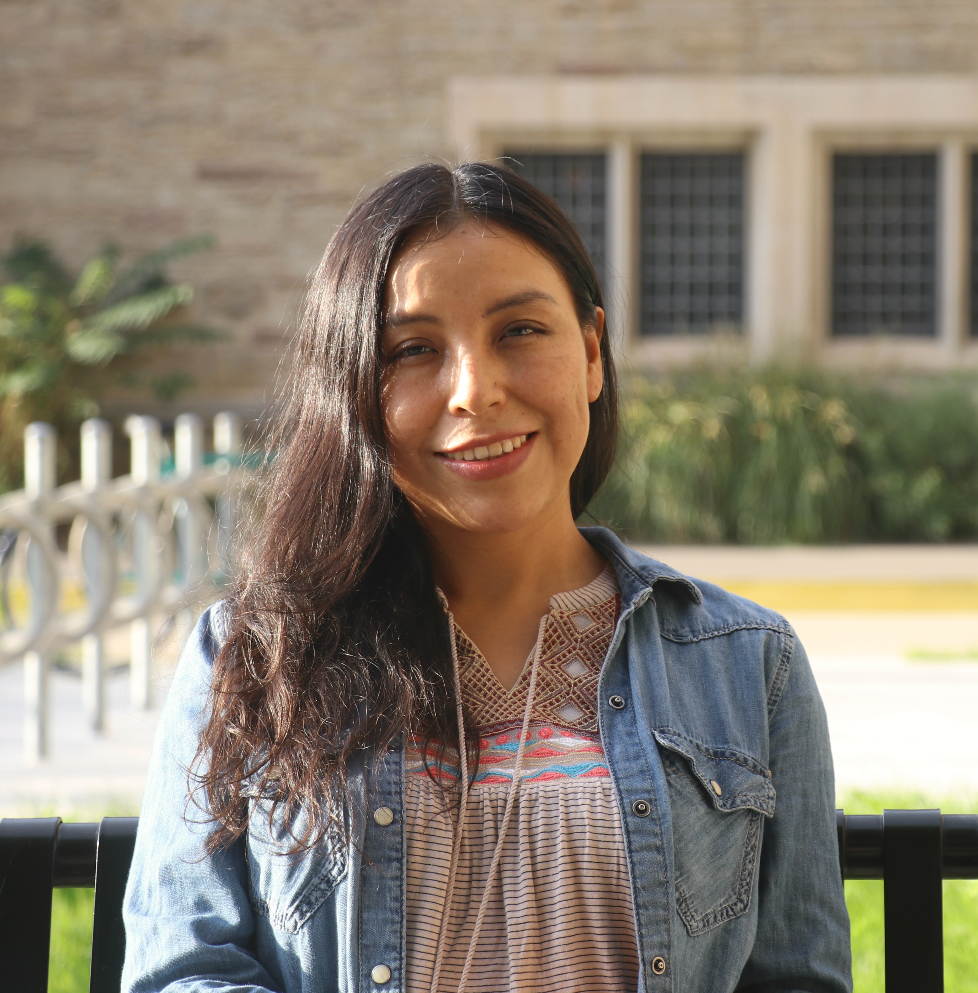
Yojana Miraya Oscco
Project Description:
In Peru, mining operations have largely benefited from the expansion of neoliberal policies, which have allowed mining corporations access to Indigenous territories, resulting in conflicts over land, livelihood, and environment. Yojana’s research focuses on how Andean Indigenous communities resist extractive industries through Indigenous institutions and forms of governance, known as Community Governance (Llaqta kamachiy) and community decision-making processes such as assemblies (Hatun rimanakuy). The goal of this project is to make visible Indigenous struggles through expanding community media in Indigenous Quechua communities in Peru. Specifically, the Connaught Fellowship will support a community-based podcast called Llaqta rimanakuy (community talk) and a digital knowledge base (website). Episodes of the podcast will be recorded in the communities where Yojana’s doctoral research takes place. The podcasts aim to share and archive personal stories, interviews, storytelling, and roundtable discussions. Four podcast episodes will be disseminated through radio comunitarias (communitarian radios), social media, and a community knowledge base, which is important in addressing and resisting the disruptions of extractive activities. The aim of these podcasts will be to archive personal stories, interviews, storytelling, and roundtable discussions while concurrently disseminating this information across Indigenous communities within Peru and worldwide to build connections and create solidarity across Indigenous communities based on topics that align with community matters that are often the most affected by mining companies’ exploitation.
Yojana Miraya Oscco, a native Quechua speaker from the Andes of Peru, is currently a Vanier Scholar and a PhD Candidate in Political Science She holds a Bachelor’s degree in geography from Universidad Nacional Mayor de San Marcos, Peru, and a Master’s in Environment and Community from California State Polytechnic University, Humboldt. She is a founding member of Kuskalla Abya Yala, an international non-profit organization dedicated to revitalizing native languages, culture, and Indigenous politics. She also co-hosts and produces the Kuskalla Podcast, which focuses on Indigenous politics, environmental challenges, land rights, and cultural resurgence. Yojana’s research interests include Indigenous Andean Politics, Cosmovisions, Environmental Extractivism, and Political Ecology. As a researcher on their ancestral community in the Andes of Peru, Yojana is working on different community-based projects that support Indigenous people in the context of mining extractivism and climate change.
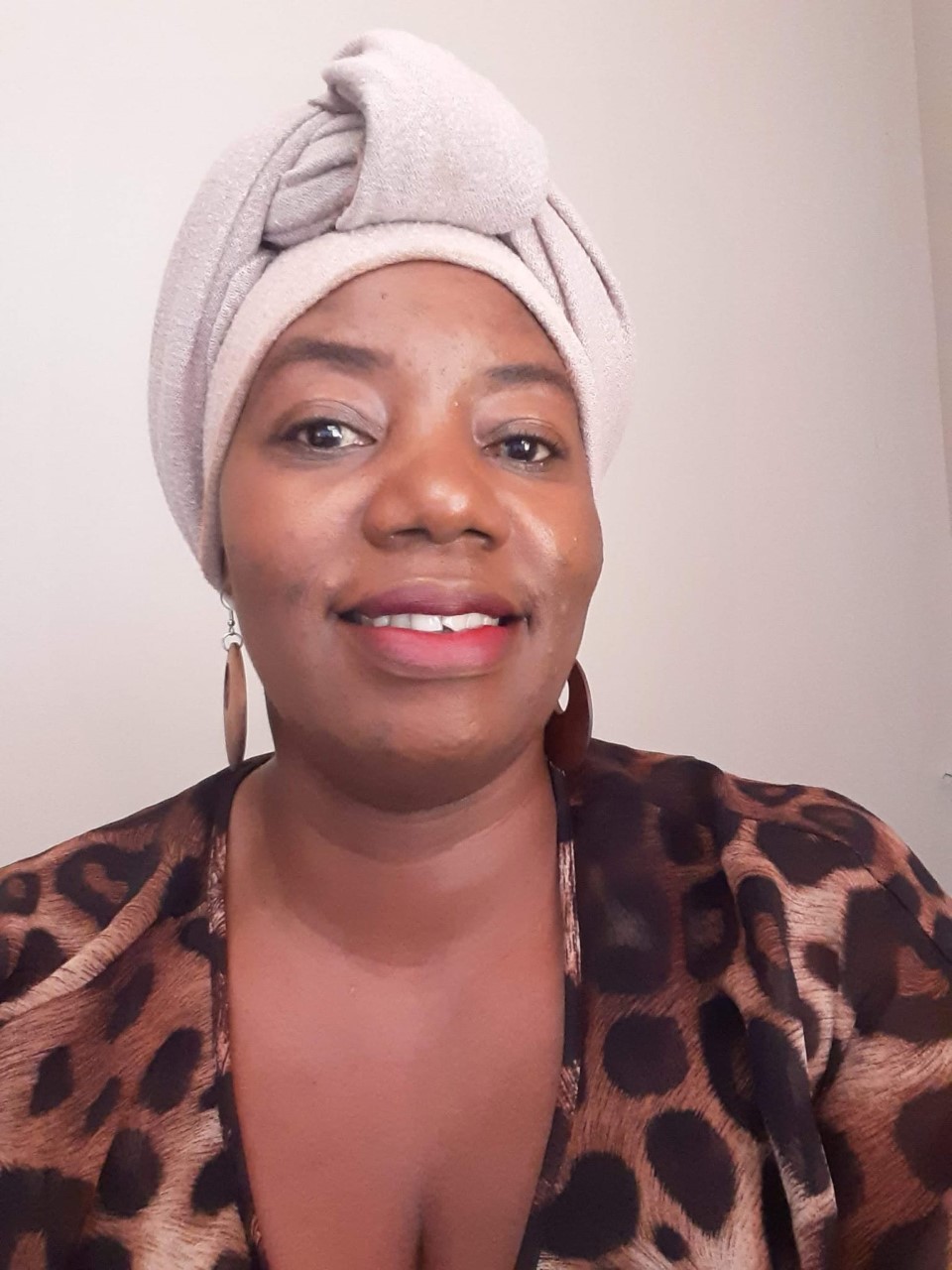
Kashoro Nyenyezi
Project Description:
Kashoro’s public scholarship project uses innovative radio and television programming to empower rural communities in Walungu-Bukavu, Democratic Republic of the Congo to combat gender-based violence (GBV). The project endeavors to educate, mobilize community action, and increase awareness regarding the widespread consequences of GBV in the region through the utilization of accessible media platforms.
The project will develop a series of radio and television programs that will comprise informative segments on support resources, legal rights, GBV prevention, expert interviews, and survivors’ testimonies. To ensure extensive access and comprehension, these programs will be transmitted in the languages spoken locally. Through partnerships with community leaders, local organizations, and survivors, the initiative will generate content that empowers and resonates with the community.
Through the widespread availability of radio and the growing reach of television, the project aims to challenge harmful cultural norms, decrease the social stigma associated with GBV, and furnish practical guidance to individuals impacted by such incidents. Additionally, community forums and call-in shows will be facilitated as part of the project to promote dialogue and community involvement. With the goal of empowering survivors to rebuild their lives and ensuring that women and girls are free from violence, this project seeks to establish a more informed and secure community.
Kashoro Nyenyezi is passionate about preventing Sexual and Gender-Based Violence (SGBV). She has been working with women and children who have experienced sexual and domestic violence in the Democratic Republic of Congo (DRC) since 2012. Her previous research focused on the HIV/AIDS epidemic among Congolese women in eastern DRC from 1996 to 2011. Through this work and her lived experience, she witnessed how gender-based violence during DRC conflicts profoundly affected the lives of many women and girls. This experience inspired her to advocate for survivors of SGBV, believing that empowering women is crucial for long-term sustainability and gender equality. Kashoro holds a bachelor’s degree in international studies and diplomacy, a master’s degree in public administration, and currently is a PhD Candidate in Social Justice Education at the University of Toronto, specializing in SGBV prevention.
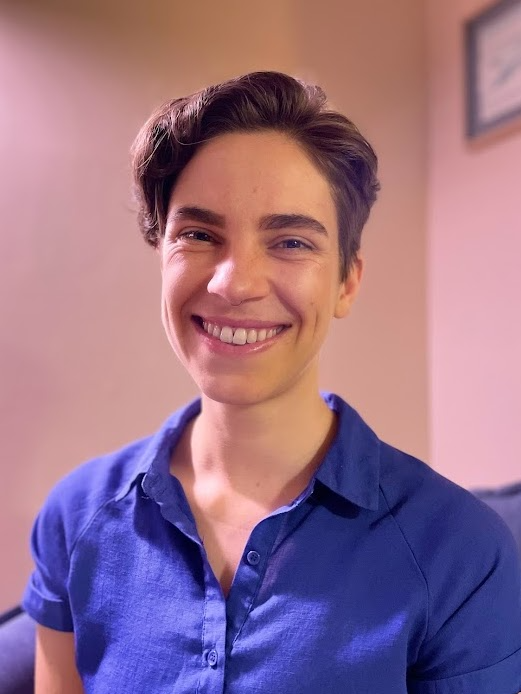
Adrian Petterson
Project Description:
Abortion access organisations in the United States are rapidly responding to shifting provisions of abortion care after the Dobbs v. Jackson decision of 2022 turned the legality of abortion in the country back to individual states. This project will convey abortion access organizations’ stories, showcasing their ingenuity and highlighting their need for ongoing support to ensure abortion access as a human right through an episodic podcast and design exercises for abortion access technologies.
This project will use ethnography and interviews, including insights from protests and volunteer events, and conversations with abortion access workers. The interviews used for the podcast will lead to participatory design exercises with the interviewees to co-theorize future designs for advocacy and care in reproductive justice. The podcast will include insights from both the field and design exercises.
Serving as a call to action, the podcast seeks to reverse the decline in contributions and inspire support for abortion access organisations from creators, designers, academics, and concerned citizens. Beyond raising awareness, the podcast aims to theorise a care model of digital activism and reproductive justice, providing insights for supporting care-oriented activism in a global context where human rights are increasingly at risk.
Adrian Petterson is a PhD Candidate and SSHRC Doctoral Fellow at the Faculty of Information, University of Toronto. They hold a Master’s of UX Design from the University of Toronto, and an MA&Sc in cognitive science from McGill University.
Adrian’s work focuses on how abortion access can be supported by technologies in ways that pave the way for more intersectionally inclusive reproductive health futures. They use interview and co-design methods, working alongside abortion access organisations to design for how technologies can be leveraged to support more inclusive, reproductive justice-oriented futures.
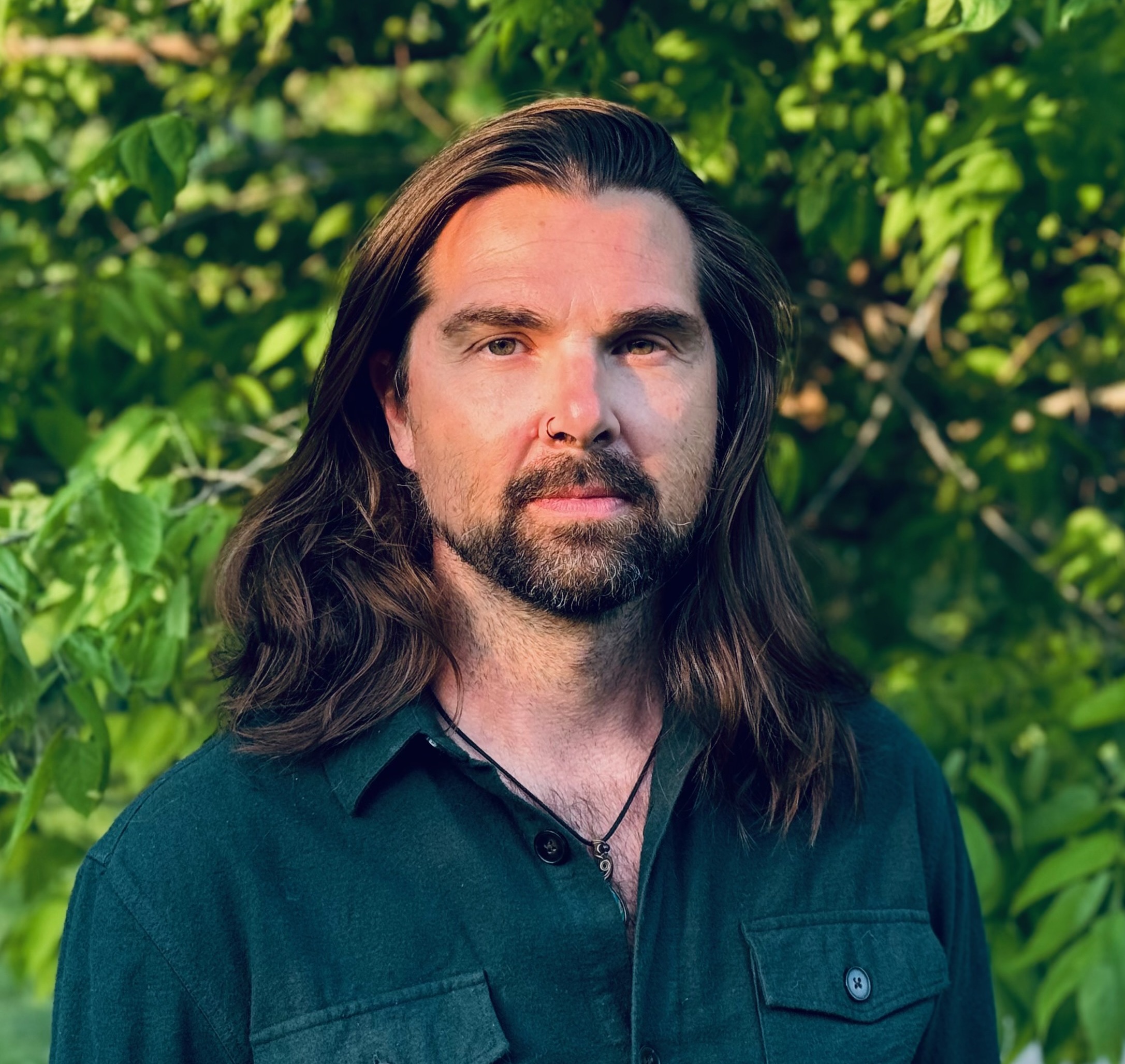
Paul Pritchard
Project Description:
Paul is collaborating with Dr. Dani Kwan-Lafond, a UTSC Sociology professor, to create an interactive teaching/learning tool using ARC-GIS Storymap software. This tool features Land-based learning and treaty educational activities at different sites along UTSC’s Ma Moosh Ka Win Trail and throughout the Highland Creek Ravine. Freely accessible online, users will be able to visit each site in person, or participate virtually, thanks to a 360-degree camera. The Storymap includes plant knowledge and Land-based teachings developed with two community partners: Josh Eshkawkogan, an Anishinaabe Elder, Knowledge Keeper, and Anishinaabemowin language speaker from Wiikwemkoong Unceded Territory; and Isaac Crosby, a Black/Indigenous plant Knowledge Holder, steward of UTSC’s Indigenous Garden, and member of the Ojibways of Anderdon. Content for the Storymap will include photographs and videos (including footage from a 360-degree camera and drone) and audio files featuring sound bites from the Land and translations into Anishinaabemowin. Content will be permanently archived through UTSC’s Digital Scholarship Unit, following the First Nations Principles of Ownership, Control, Access, and Possession (OCAP). This initiative aims to broaden access to Indigenous epistemologies and pedagogies and contribute to advancing Indigenous sovereignty and land rights in university curricula. It aspires to promote anti-colonial ways of relating and belonging to the Land, while urging users to imagine better ways to uphold treaty rights and responsibilities.
Paul Pritchard is a PhD candidate in Sociology. His dissertation project investigates the expansion and substantive quality of Indigenous curricular content at the University of Toronto to understand how Canadian universities are responding to the Truth and Reconciliation Commission of Canada’s Calls to Action. Paul’s contributions to indigenizing undergraduate education, particularly related to developing Land-based experiential learning opportunities, have been recognized through multiple teaching excellence awards. Paul is Michif (maternal) and of Welsh descent (paternal), a Citizen of the Métis Nation (Red River Métis) and member of the Manitoba Métis Federation. Outside of academia, you can find him adventuring with his dog or working on his off-grid cabin in the woods.
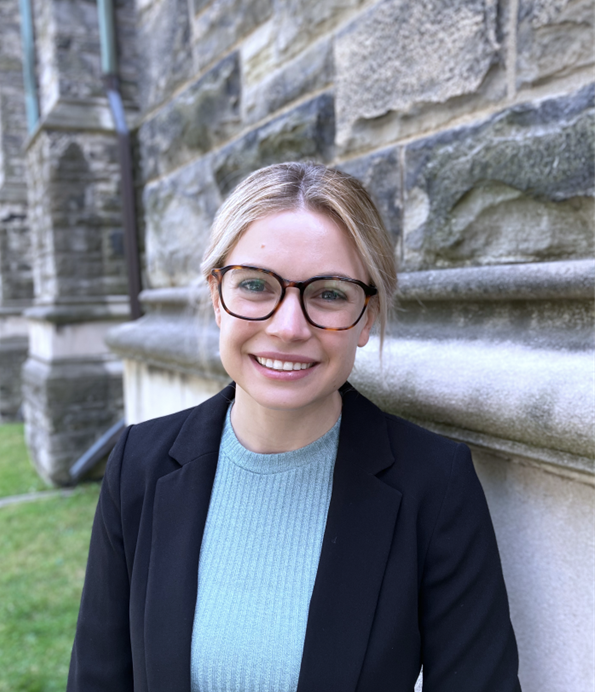
Jenna Quelch
Project Description:
Despite Canada’s healthcare system often being touted as a unifying symbol and a point of national pride, Canadians experience vastly different access to health services. For example, while Ontario and Quebec have fully funded in vitro fertilization (IVF) programs, some provinces provide only grants or tax credits for treatment, while others provide no funding whatsoever. Although IVF funding is just one example, it highlights the fact that Canada’s healthcare system is rife with variation as to what is considered medically necessary and who is deserving of health services, with inequities around gendered and women’s health services being most pronounced.
Jenna’s research examines how provincial-territorial health systems conceptualize women’s health and how different definitions of medical necessity contribute to inequities in health access. Her research examines how and why funding and service availability for IVF, abortion, and gender-affirming care differ across the country.
With the support of the Connaught Fellowship, Jenna’s mixed-methods dissertation will create public-facing reports examining policy variations and policy recommendations for equitable health access across provinces and territories.
Jenna Quelch is PhD candidate in the Department of Political Science at the University of Toronto with a Collaborative Specialization in Public Health Policy at the Dalla Lana School of Public Health. She has held the RBC Graduate Fellowship in Public and Economic Policy and has twice been awarded the Ontario Graduate Scholarship.
Jenna’s research focuses on the politics of parenthood and reproduction. Her dissertation examines the gendered politics underlying variable access to reproductive health care across Canadian provinces. Her other research projects focus on childcare policies across Canada and abroad, as well as healthcare access among Indigenous communities. This latter work has been conducted as part of the Indigenous Women’s Health Lab at the University of Toronto.
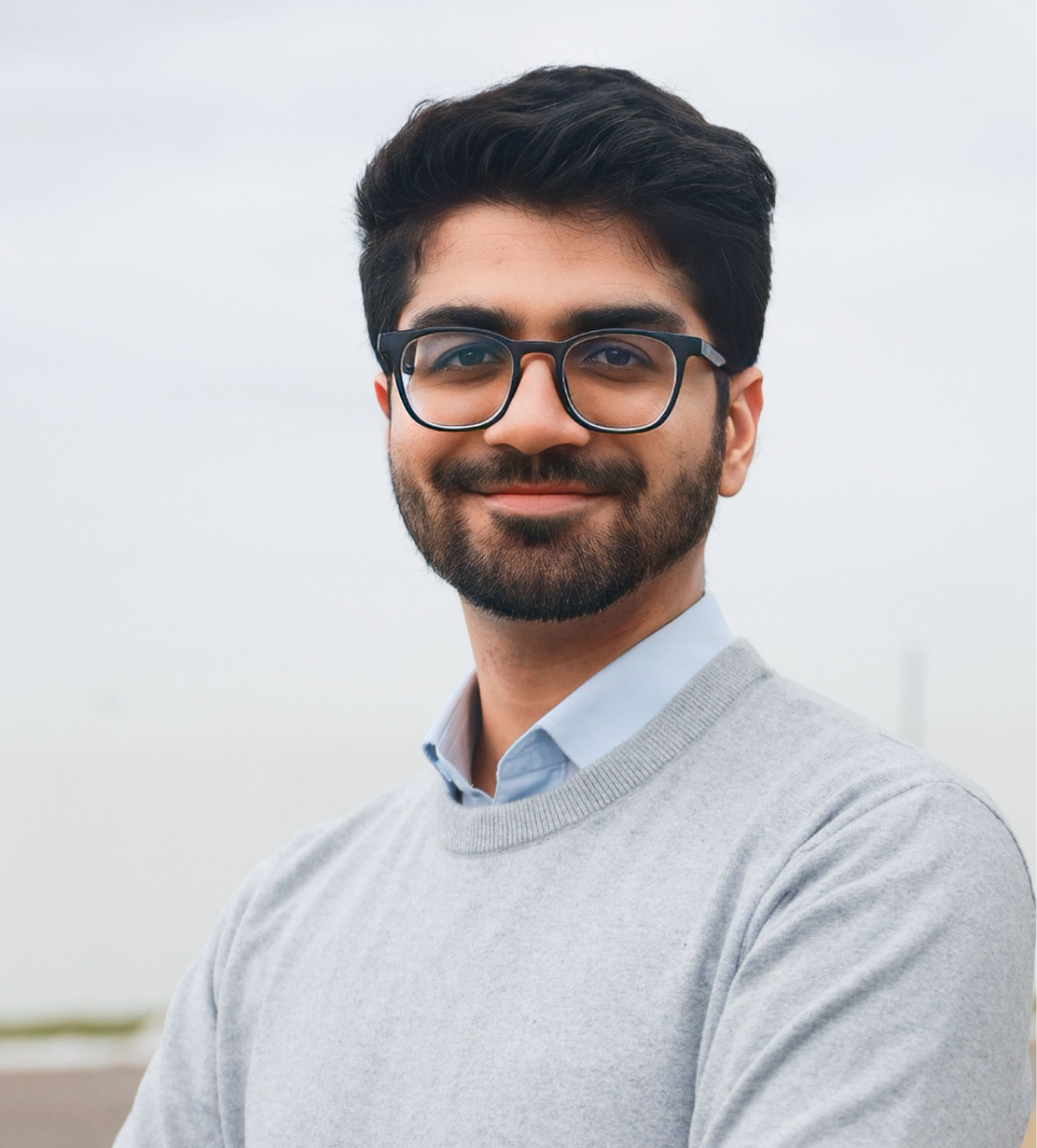
Shivam Sharma
Project Description:
Shivam’s public scholarship initiative aims to address the critical need for science communication in matters impacting human health, particularly focusing on diabetes management. With approximately 5.7 million Canadians living with diabetes and facing risks such as heart and kidney diseases, his project focuses on education and community-building for diabetic patients and their support networks.
This project entails the development of a gamified experience in the form of a diabetes-themed card game: Metabolic Mayhem. Played during monthly gaming events, it serves as an interactive tool to impart essential knowledge about diabetes management, human metabolism, and risks of diabetes. This game also gives participants an opportunity to connect, share insights, and collectively navigate the challenges of diabetes management, fostering a supportive community.
Utilizing comic visuals and metaphoric characters, the game caters to a wide audience, including younger individuals diagnosed with diabetes. The intentional choice of a card game promotes social interaction and inclusivity across age groups, combating social stigma, isolation, and mental health challenges linked to diabetes. Continuous feedback from patients enriches the project, ensuring its relevance and effectiveness. Overall, this initiative aims to have a meaningful public impact, positively influencing lifestyle choices and mental well-being while improving overall health outcomes.
Shivam is a PhD candidate at the Faculty of Dentistry, focusing on developing light-activated smart biomaterial for accelerated diabetic wound healing. He received a BSc from University of Delhi and an MSc from IIT Bombay. Shivam has authored seven publications in nanomedicine and tissue engineering, and worked with the Bill & Melinda Gates Foundation to design insulin micro-needle patches for diabetic patients in India. He is a science storyteller, using illustrations as a tool to educate and inspire, and winning 2nd place and the People’s Choice Award in UofT’s 2022 3-Minute Thesis competition. Moreover, he volunteers with Let’s Talk Science, an NGO focusing on STEM skills development in youth.

Mercedes Sobers
Project Description:
Mercedes’s project is a Black Wellness Exhibit that highlights the resilience and strength that exist within the Black community.
Canada lacks comprehensive research on how Black individuals perceive and navigate mental health. The absence of race-based mental health data creates a vague understanding of how racial and ethnic identities shape mental well-being, obscuring the true scope of mental health issues within Canada’s Black community.
Mercedes’s doctoral research aims to better understand the mental health needs and service utilization among Black Canadians and to identify ways to enhance mental health services. However, research focusing on marginalized or racialized groups too often employs a deficit approach, emphasizing the lack or inequities experienced within these communities. To balance her dissertation, she is launching a strengths-based initiative: the Black Wellness Art Exhibit.
This exhibit will artistically explore three key questions, showcasing how Black individuals foster well-being in their lives and those of their loved ones. By amplifying Black voices, experiences, and expertise, this project will encourage self-reflection, dialogue, and the identification of factors that promote mental wellness. The explorative questions will delve into the meaning of mental wellness, the practices that enhance mental health, and strategies for improving mental health within the Black community.
With a passion for mental health equity and a commitment to data-driven solutions, Mercedes (she/her) is dedicated to improving access to and experiences within the mental health care system.
Mercedes is a PhD candidate in Epidemiology at the Dalla Lana School of Public Health, where she is currently researching the mental health of Black people in Canada and their access to care. She is also a researcher at the Centre for Addiction and Mental Health, where she conducts research to eliminate disparities in mental health.
Through her work, Mercedes is committed to advancing mental health equity by examining the social determinants of mental health and identifying barriers to care. Whether through advocacy, policy change, or research, she strives to create measurable improvements in the lives of those who are underserved by the health care system.
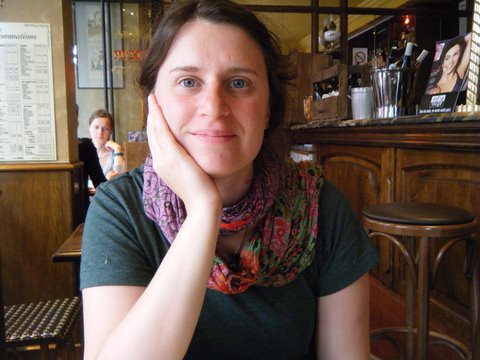
Rhonda Solomon
Project Description:
Rhonda’s project will create a YouTube channel where the stories and experiences of people living with disabilities are told. The focus will be on how people with disabilities access the urban landscape, with a particular emphasis on the lack of accessible restrooms in public spaces. Without access to restrooms that accommodate all bodies, including bodies that require assistive toileting equipment such as hoists and adult-sized changing tables, people with disabilities and their families/carers often experience not only social exclusion, but also the indignity and health risks of being changed (or changing someone) on the restroom floor. For children with disabilities, social exclusion is particularly harmful because it can cause global developmental delays and broader health impacts.
There is a critical need for people with disabilities to tell their stories of how the lack of universally accessible public restrooms leads to exclusionary urban landscapes and fewer opportunities for social engagement and integration, especially for disabled children. The YouTube channel will create a user-friendly platform for these voices to be heard, and for Rhonda to draw on her positionality and insight as a disabled academic to frame questions and contextualize stories in a way that creates the largest public impact and opportunity for social change.
Rhonda is a PhD Candidate in the Department of Geography, Geomatics, and the Environment at the University of Toronto Mississauga. Her research considers the accessibility of public toilet spaces in North America through a critical disability studies lens, exploring how the lack of public washrooms designed to accommodate the toileting needs of children with disabilities impacts disabled children and their families.
Rhonda is engaged in her SSHRC-funded project “Lying on a restroom floor: Disabled childhoods with no place to go” as well as work producing knowledge that will inform Canadian transit service providers’ policies concerning the provision of equitable transit access. Rhonda has published peer-reviewed work as well as a report on disability and public engagement for the City of Toronto. As an autistic academic, she is dedicated to bringing neurodivergent voices to research and scholarship.

Lily Takeuchi
Project Description:
Despite striking evidence of both sex differences in neurological disease and social disparity in the burden of care, representation of women in neurology research has been limited. Women remain an underrepresented group within the field of neuroscience, due to historical and institutional barriers. Lily’s public scholarship initiative will focus on educational outreach on complex topics in neuroscience, bringing educational tools to marginalized communities and empowering the public to understand and advocate for personalized care and sex equity in scientific research.
Lily’s work will involve the creation of mini-laboratory kits including everything needed to conduct a simple experiment such as low-cost versions of laboratory supplies, an instructional booklet, and a complementary video highlighting researchers from historically underrepresented groups in neuroscience. Each video will highlight researcher’s areas of investigation, the societal impact of their work, and how it can be demonstrated through a simple experiment. The inspiration for these kits is to make concepts and techniques in neuroscience accessible to those who may be experiencing barriers to STEM education such as those living in rural areas, or those without access to scientific equipment and training. Kits will be distributed to partnering communities and K-12 schools and outcomes data will be collected to gain a better understanding of how educational tools in STEM can be used to target the academic pipeline early to promote access to STEM careers in marginalized communities.
Lily (she/her) is a PhD candidate in Biomedical Engineering under the supervision of Professor Craig Simmons. Lily’s doctoral research aims to improve neurological drug discovery through the development of in vitro models of Alzheimer’s disease using patient stem cells. Over her academic career, Lily has co-authored 10+ peer-reviewed publications and is the recipient of 10+ research awards including the NSERC Doctoral Scholarship. Lily has served as a former Board of Director and Vice President of the Society for Canadian Women in Science and Technology. Through her work, she aims to support the creation of an environment for historically underrepresented groups to pursue STEM without barriers.
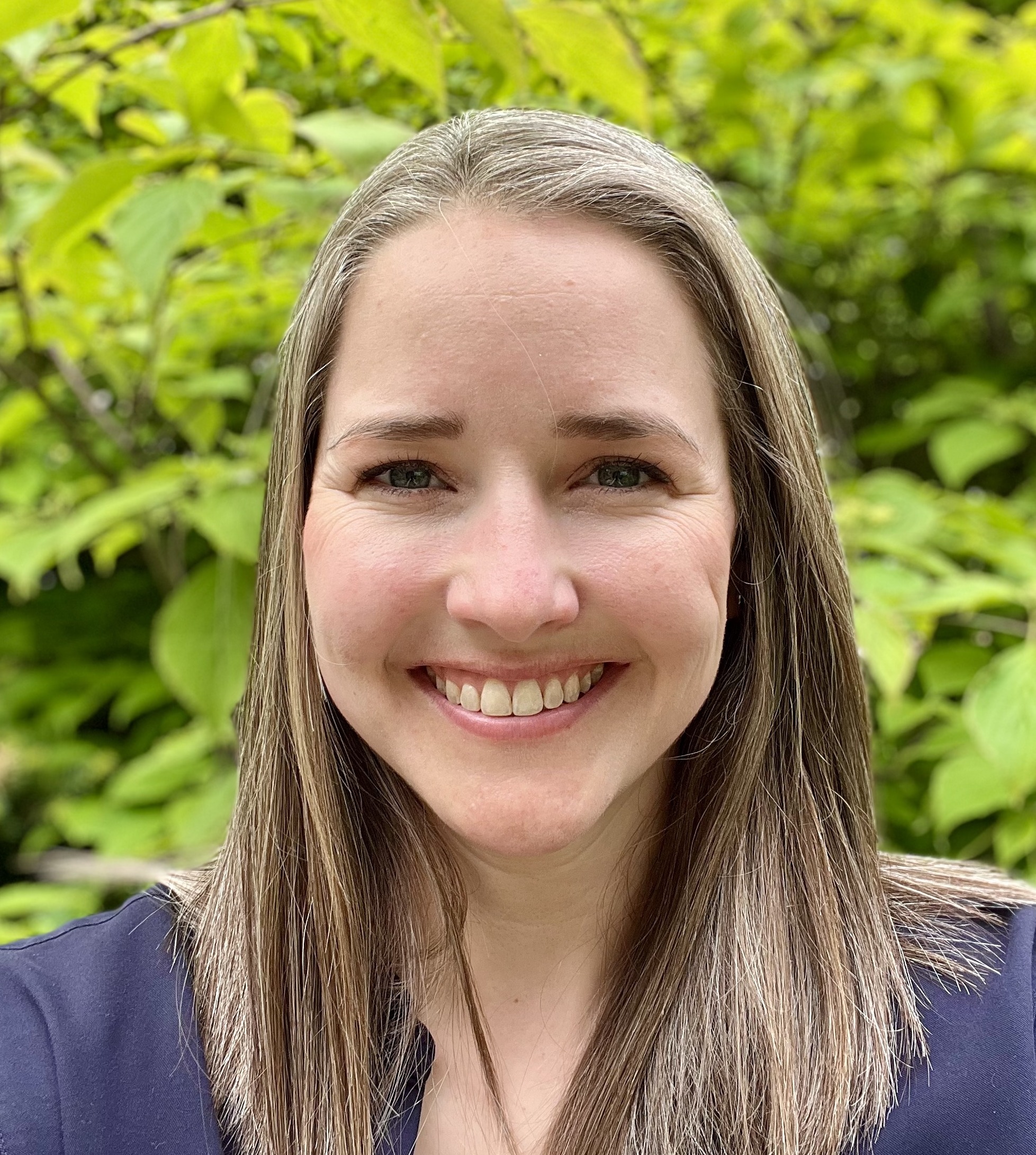
Sarah Urquhart
Project Description:
Environmental education often emphasizes familiarity and connection with place as an essential precursor to engagement and activism. However, place-based learning often narrowly conceptualizes ‘place’ as singular, localized, and depoliticized, which reproduces dualistic colonial framings that separate place from humans and dismisses experiences in other non-local contexts. In times of increasing migration and displacement from global conflict and the climate crisis, there are many adolescents whose life experiences challenge these normative understandings in place-based learning.
This research and public scholarship initiative centres the stories and photographs generated through a photovoice participatory inquiry with newcomer youth (co-researchers) at an urban secondary school in Toronto. Narratives and photographs will explore the place relationships that inform youth engagement and that emerge from experiences with place-based environmental learning in Green Industries technological courses. Youth co-researchers will curate and determine the format of a creative community showcase to share their stories, photographs, and emerging themes.
Sarah Urquhart is a PhD candidate in Curriculum & Pedagogy and SSHRC Doctoral Fellow at the Ontario Institute for Studies in Education, University of Toronto. Prior to this, she worked as a secondary educator in Mexico City, Hong Kong, and Japan. Currently, Sarah is a course instructor and coordinates professional learning opportunities in environmental and climate change education.
Sarah’s doctoral research uses an anti-colonial orientation and participatory approach to centre the experiences and narratives of newcomer youth as they engage in environmental education in Toronto. Her interests are in fostering community engaged, place-based, and justice-oriented environmental and climate change learning in K-12 and teacher education contexts.
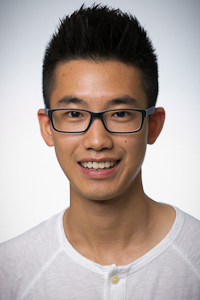
Ben Li
Ben Li is a vascular surgery resident and PhD student at the Institute of Medical Science, University of Toronto. His research focuses on using machine learning to predict outcomes in patients undergoing major vascular surgery.
Ben has published over 40 peer-reviewed papers, given over 40 conference presentations, and received over $600,000 in research funding from sources including the Canadian Institutes of Health Research, Ontario Ministry of Health, and University of Toronto.
As a Connaught PhDs for Public Impact Fellow, Ben hopes to learn how to apply advanced machine learning technology to health care in a way that achieves meaningful public impact.
Vascular surgery patients are at high risk for complications given their significant comorbidities and the nature of their operations involving major vascular systems. Up to 30% of patients undergoing vascular surgery will suffer an adverse event, which remains among the highest for all surgical patients. Current tools for predicting post-operative outcomes are limited by the need to manually input data, non-specificity to high-risk populations, and lack of long-term predictions. My goal is to develop automated machine learning (ML) algorithms that use pre-operative patient characteristics to predict peri-operative and long-term outcomes following major vascular surgery.
I plan to achieve this goal by working with a multidisciplinary team of data scientists, engineers, and clinicians to train ML algorithms using a variety of data sources including local hospital electronic health records, population-level administrative data, and national/international vascular surgery registries. Through this work, we will develop rigorous and versatile ML algorithms applicable to patients locally, provincially, across Canada, and around the world. These risk prediction tools can be deployed into clinical practice to identify high-risk individuals and mitigate adverse events by guiding patient selection for surgical interventions and peri-operative management, ultimately improving outcomes for vascular surgery patients.
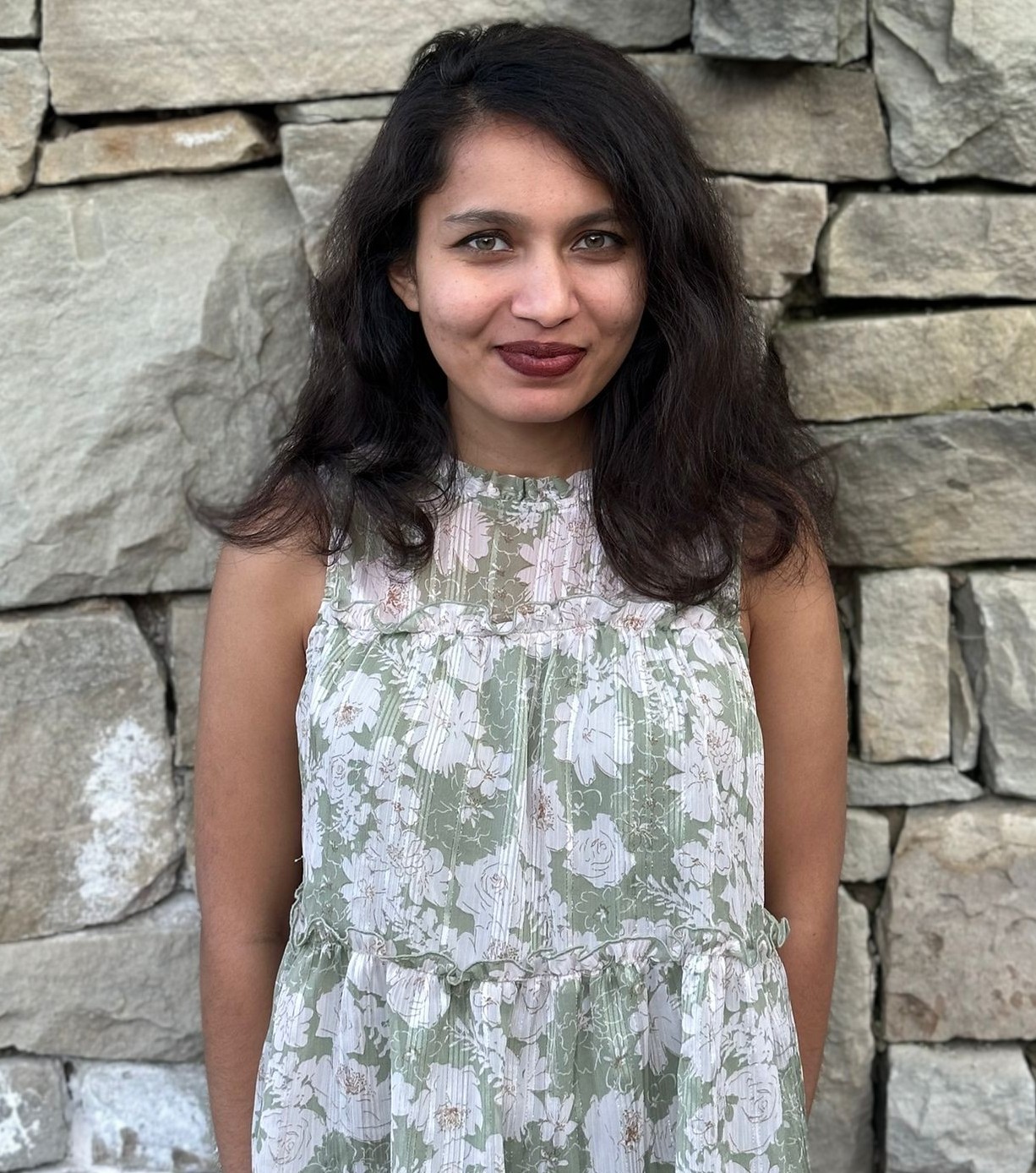
Farah Tahsin
Farah is a Ph.D. candidate at the Dalla Lana School of Public Health. Her thesis examines the work of being a patient with chronic conditions of low Socioeconomic status and how to use technology better to reduce patients’ workload.
Farah is also currently a research associate at the Northern Ontario School of Medicine where her work focuses on trauma-informed interventions for individuals with complex PTSD and substance use disorder, opioid-agonist treatment patterns among northern communities and secondary data analysis.
Her long-term research goal is to develop a research program in the field of patient-centred technology innovation. To broaden the scope of patent-centered technology design, she is interested in bringing a sociological lens in technology research to explore how structural and social factors shape digital divide and health inequity in Canadian settings and globally.
With the emergence of Covid-19 and the subsequent rapid adoption of telehealth in the primary care, it is recognized that systematically marginalized populations often experience heavy burden while using health technologies due to systematic barriers and having poorer access to resources. However, since treatment burden is a novel topic in the healthcare lexicon, many patients and providers do not know how to engage in a conversation about treatment burden.This can lead to inappropriate use of telehealth, resulting in negative health outcomes.
During my fellowship, I intend to create a series of animation series to engage the public in the conversation about the concept of treatment burden, and telehealth equity. To do so, I will create a series of animated videos on this topic. I will collaborate with patients, health professionals, and policymakers to co-design this animated series. During this co-design process, the participants can decide which topics need to be highlighted in the series and how to deliver key information. In order to reach a broad audience, I will post this series on organizational websites (e.g., community health center websites) and social media.
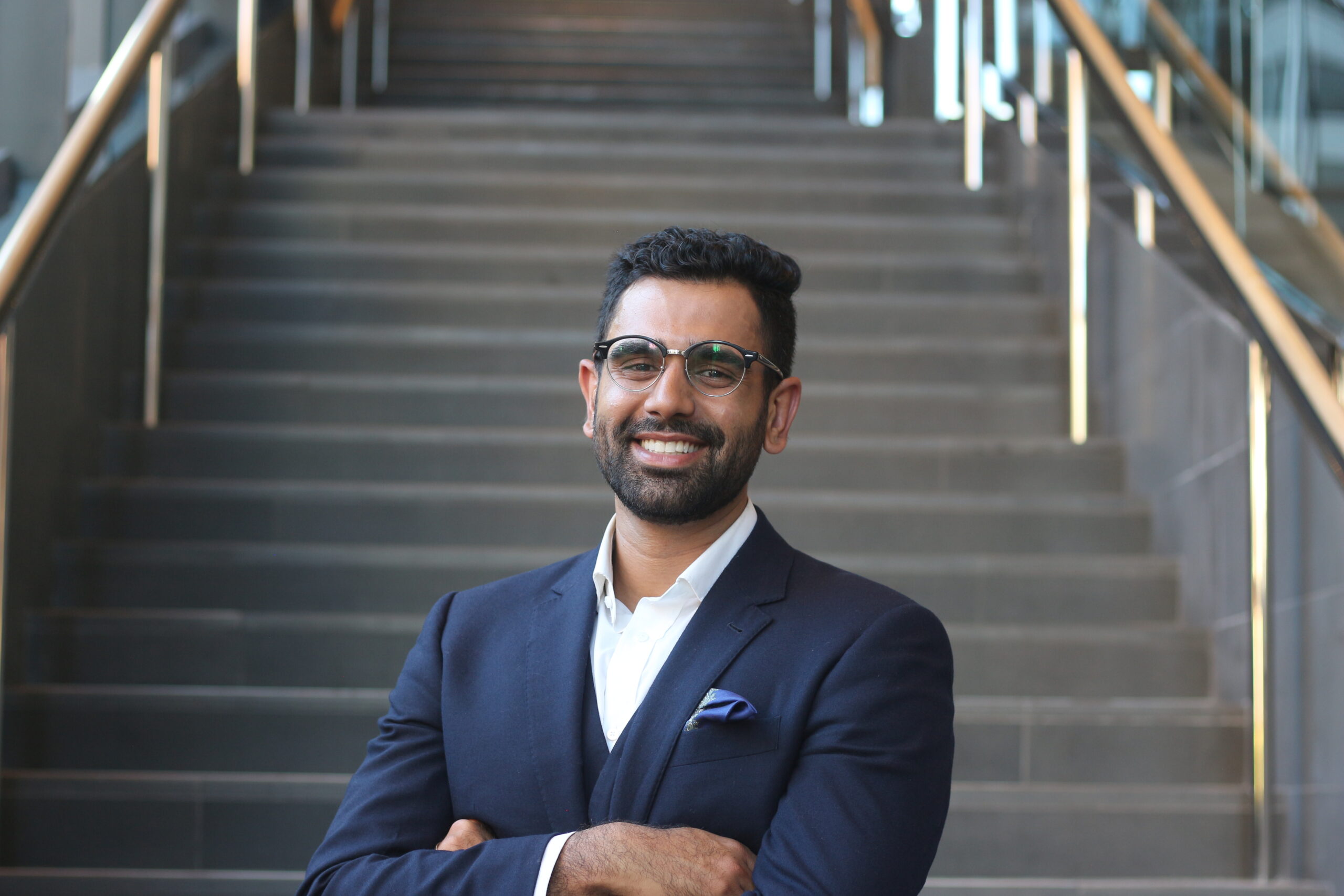
Joseph Sebastian
Joseph Sebastian is a PhD Candidate, Vanier Scholar, and incoming Massey College Junior Fellow in the laboratory of Dr. Craig A. Simmons, focusing on the application of biomedical ultrasound imaging in regenerative medicine for pre-clinical research. His work uses ultrasound to non-invasively probe the acoustic, mechanical, and contractile properties of hearts-on-chips, an alternative to animal models in pre-clinical cardiac drug testing. Joseph has authored >15 publications in top international journals such as The Proceedings of the National Academy of Sciences, Biomaterials, and Photoacoustics and received >300K in competitive research funding. Joseph’s tenure of the Connaught PhD for Public Impact Fellowship will focus on public communication of his interdisciplinary work in pre-clinical drug testing and public education on the alternatives to animal studies for pre-clinical drug testing.
Joseph is passionate about mentorship, acting as a Residence Life Staff at the University of St. Michael’s College; pedagogy, serving as a teaching assistant for >20 undergraduate courses in the FASE; and extra-curricular leadership, acting as the Director for Professional Relations at the Graduate Management Consulting Association. Outside of academia, Joseph is a triathlete, marathon runner, tennis player, violinist, and classically trained baritone.
Current cardiac drug screening and testing methods lack the power to eliminate ineffective and harmful drug candidates to treat heart failure. Miniaturized three-dimensional heart models show great promise to better mimic human biology, disease, and drug responses. My research aims to use a new type of ultrasound imaging to identify drugs that can reverse cardiac stiffening and arrythmias, pre-cursors to heart failure, in a miniature heart model. Current contractile and stiffness measurement techniques for miniature heart models are invasive, low-throughput, and incapable of long-term monitoring as they remove the heart model from its biological environment.
To address these limitations, we are developing a non-invasive ultrasound system to assess the contractile function and stiffness of miniature heart models without disturbing the model. Ultimately, we expect the ultrasound system to have broad applications for non-invasive contractile and mechanical assessment of different types of heart models, from single muscle cells to engineered heart tissues, assisting researchers with screening the most appropriate drugs for heart failure treatment before testing them on Canadians.
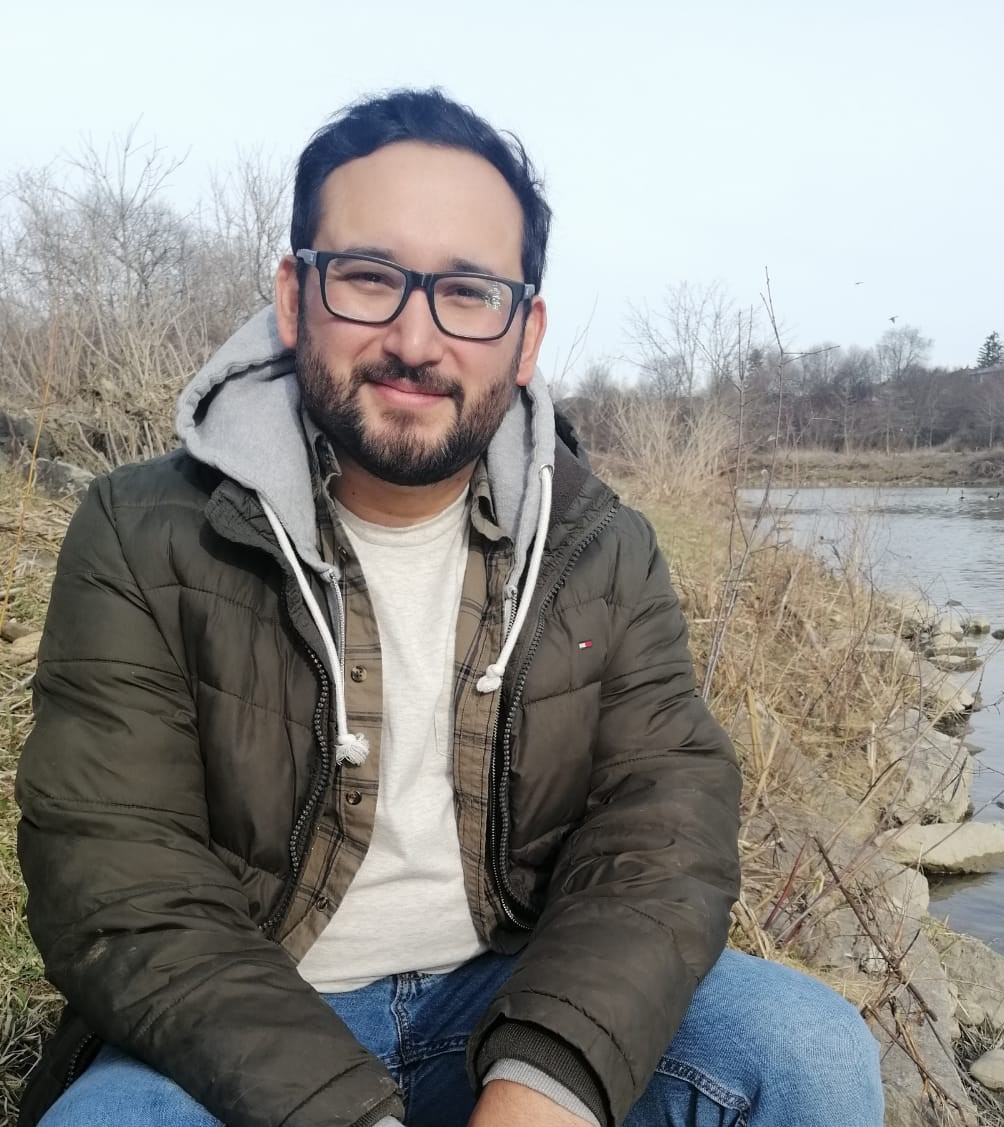
Juan Carlos Jimenez
Juan Carlos Jimenez is a PhD Student in Human Geography at the University of Toronto’s Department of Geography and Planning. His research focuses on youth migration, youth activism, and rural livelihoods in El Salvador, examining the economic and environmental processes shaping life trajectories, and the emotional geographies of trauma in the aftermath of civil war, neoliberal post-war reconstruction, and displacement. Juan Carlos is currently working on two SSHRC funded research projects. First, through the ‘Surviving Memory in Post-War El Salvador’ research project at Western University, which is an international research collaboration documenting the history of the Salvadorian Civil War (1980-1992) and preventing future violence, using decolonial and participatory methodologies and engaging community-driven research projects with survivors of historic violence. Second, through the project entitled ‘Index-Based Agricultural Insurance, Climate Vulnerability, and Food Security in Rural El Salvador’ with Dr. Ryan Isakson, which evaluates agrarian livelihoods under the combined stressors of climatic and economic crises, and the role of microfinancing and climate insurance for smallholder farmers in contributing to climate resilience.
As a community-based researcher, Juan Carlos works with the young Central American people in Canada to explore experiences with migration, the legacies of the civil war, and community responses to trauma using arts-based methods. Juan Carlos has worked in El Salvador, Nicaragua, and Canada in community driven initiatives.
Catalyzed by gang violence, political instability, poverty, and climate change, the recent influx of Central American migrants to the United States has thrust the region into the spotlight. Tapping into this popular imaginary, my research will analyze the exodus of young actors from rural settings in El Salvador, giving attention to the motivations to migrate as well as the hardships and trauma emerging from leaving home and forming trans local lives. I will be working in the municipalities of San Jose las Flores, Nueva Trinidad, and Arcatao, in the department of Chalatenango. These areas witnessed severe conflict during the Salvadorian Civil War (1980-1992), with residents fleeing to neighbouring Honduras to refugee camps and repopulating the area in the late 1980s.
With this Connaught Fellowship, I will be facilitating a Photovoice project with rural youth in these three municipalities. Photovoice is a research method that brings participants together to analyze community strengthens, barriers, and hardships using photography and written reflections. Participants then collectively reflect on these issues and plan social actions to respond to these hardships. I will be facilitating Photovoice workshops with young people who have stayed in place, and online with young people who have migrated to urban centers or the United States. My goal is to facilitate transnational dialogues around youth migration, mental health, and community activism, and the economic, social, and climatic realities that shape decision to migrate or stay-in-place. This project will culminate in the organizing of public showcases of these arts-pieces and creation of a Photovoice booklet for residents and policymakers.
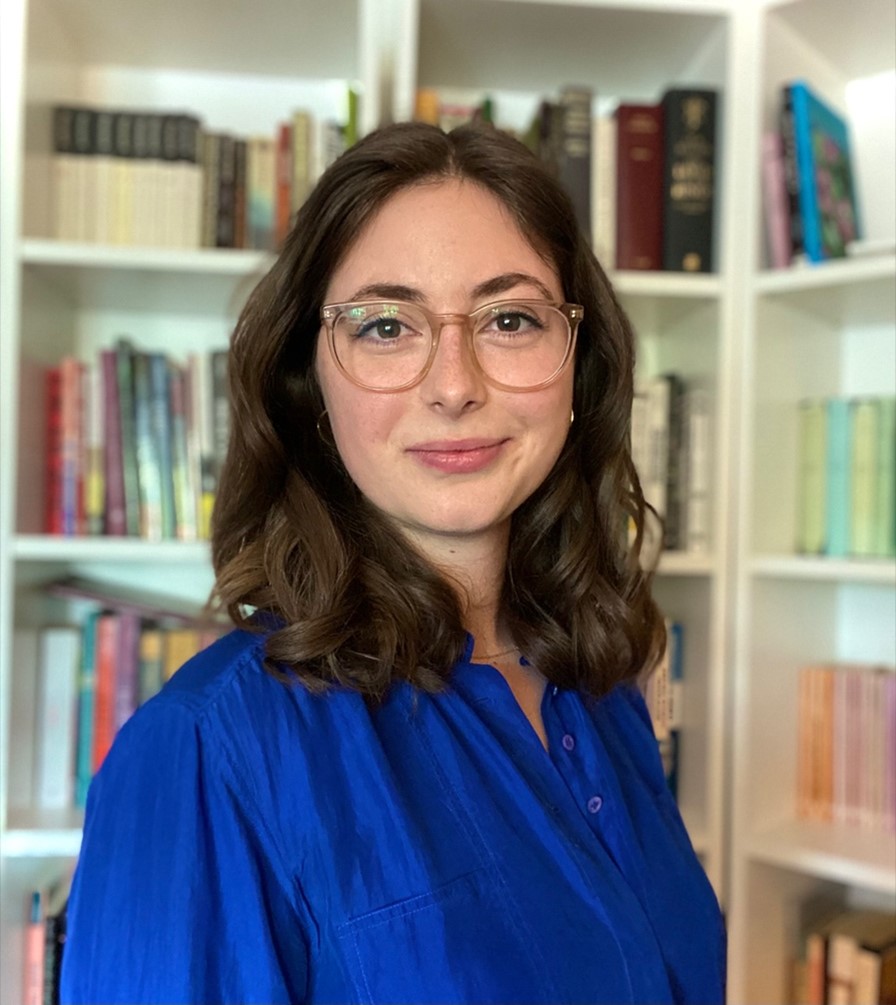
Madalyn Hay
Madalyn Hay is a doctoral student in the Department of Political Science. She holds a BAH in Contemporary Studies and Classics from the University of King’s College, Halifax, and an MA in Political Theory from the University of Chicago.
Madalyn’s doctoral research is on urban land use and the role that Community Land Trusts (CLTs) play in ensuring equitable, sustainable, and inclusive urban development. Her research investigates the social and political benefits that CLTs provide through subjecting land use to community based democratic governance. Her work also seeks to better understand collective forms of property ownership and how they challenge dominant paradigms of private property and neoliberal urbanism.
Though Madalyn mainly works within Political Theory, her research transcends narrow disciplinary boundaries, drawing on Comparative Politics, Human Geography, Urban Studies, and Legal Theory. Her method is largely inspired by Grounded Normative Theory which aims to produce theoretically robust and empirically informed frameworks to make sense of contemporary political practices.
As cities all over the world face a housing affordability crisis, Community Land Trusts (CLTs) are gaining recognition as attractive models for ensuring perpetually affordable housing in urban centers. While the economic benefits of the CLT model are clear, the social and political benefits are less so. Madalyn’s research is therefore concerned with how CLTs promote social solidarity and participatory democracy and the implications of this for urban development. What kind of democratic practices and social relationships are created by CLTs and how do they promote community empowerment? Furthermore, how might CLTs challenge dominant paradigms of neoliberal urbanism to promote more equitable, sustainable, and inclusive urban development?
Madalyn’s research will contribute to the understanding of how CLTs create alternative urban governance structures that prioritize community needs and participation and deliver economic, social, and political benefits. By paying specific attention to the social and political benefits of CLTs, Madalyn’s research will contribute to the broader discourse on the right to the city.
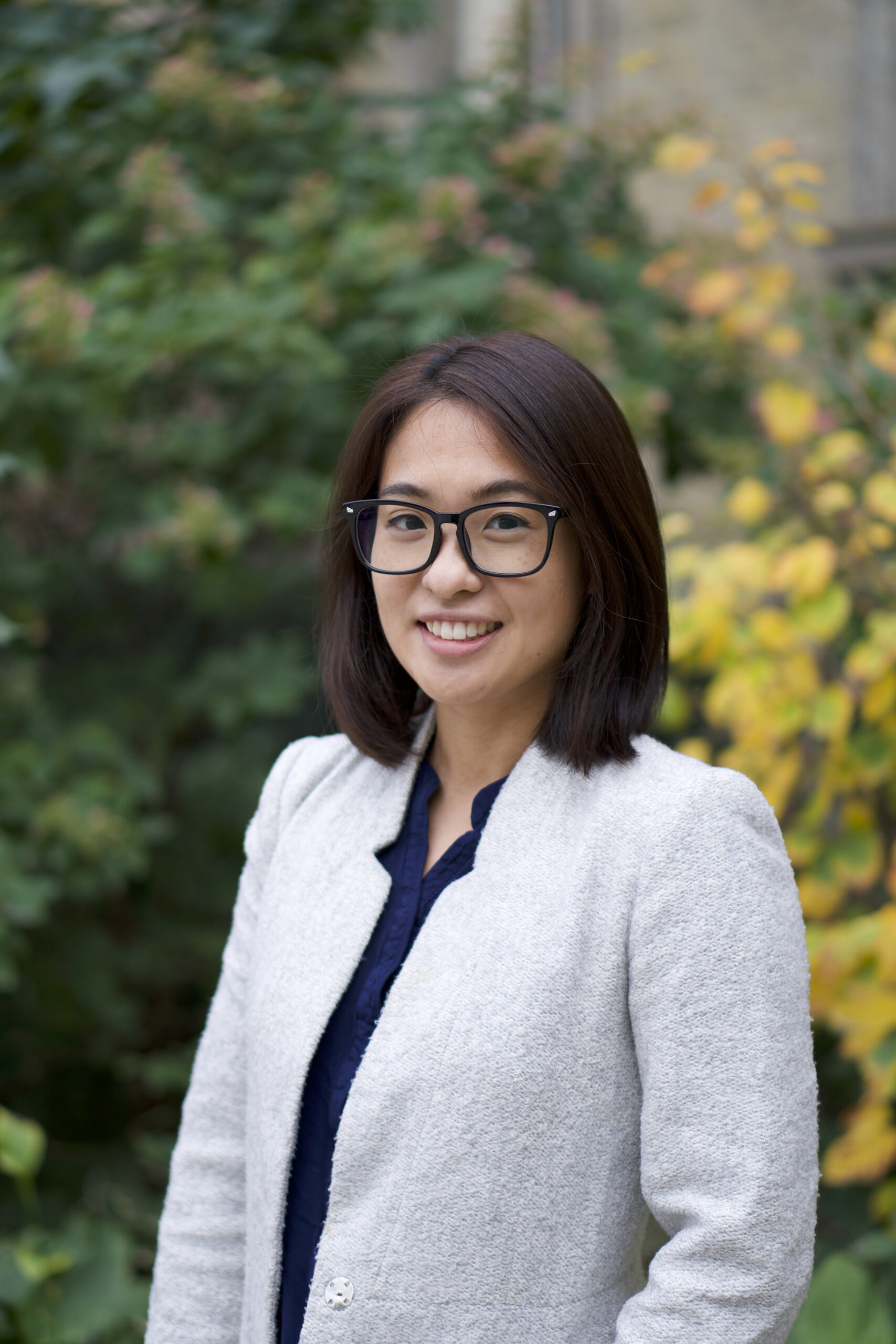
Michelle Tam
Michelle WY Tam (she/her) is a PhD Candidate at the Dalla Lana School of Public Health, a SSHRC Doctoral Fellow (2021-2024), and a Connaught Public Impact Fellow (2023-2024). Michelle holds a Master of Arts in Gender Studies from Queen’s University. Her doctoral research is focused on assisted reproductive technologies and access for racialized sexual and gender minority people. Her research interests include LGBTQ2S+ health, sexual and reproductive health, reproductive technologies, reproductive justice, critical race theory, queer theory, mixed-methods, and qualitative research. Additionally, Michelle is a research team member of the Re:searching for LGBTQ+ Health Team, University of Toronto, and a Clinical Research Coordinator at The Hospital for Sick Children (SickKids).
This project aims to understand experiences of accessing assisted reproductive technologies (ART) for 2SLGBTQIA+ Black, Indigenous, and people of colour (BIPOC) seeking to expand their families. It is estimated that more than 25% of fertility clinic users in urban areas of Canada identify as 2SLGBTQIA+. Inequitable ART (e.g., invitro fertilization, insemination, and surrogacy) access for 2SLGBTQ+ communities has been evidenced, yet scant research has examined the complex experiences of 2SLGBTQ+ BIPOC communities. Using a reproductive justice approach, which argues that intersecting identities and experiences of inequalities shape decision making around reproduction, we will investigate the experiences of reproductive access for 2SLGBTQIA+ BIPOC people. This project will examine clinical practices as well as policies, regulations, and laws surrounding ART.
We will conduct interviews with 2SLGBTQIA+ BIPOC people who have undergone or were seeking ART in Ontario, Canada. Additionally, we will conduct interviews with key informants who have been involved with the medical and/or legal processes of ART.
Findings from this study have the potential to impact policies and practices for 2SLGBTQIA+ BIPOC communities in ways that more effectively address their reproductive needs and pathways to family expansion.
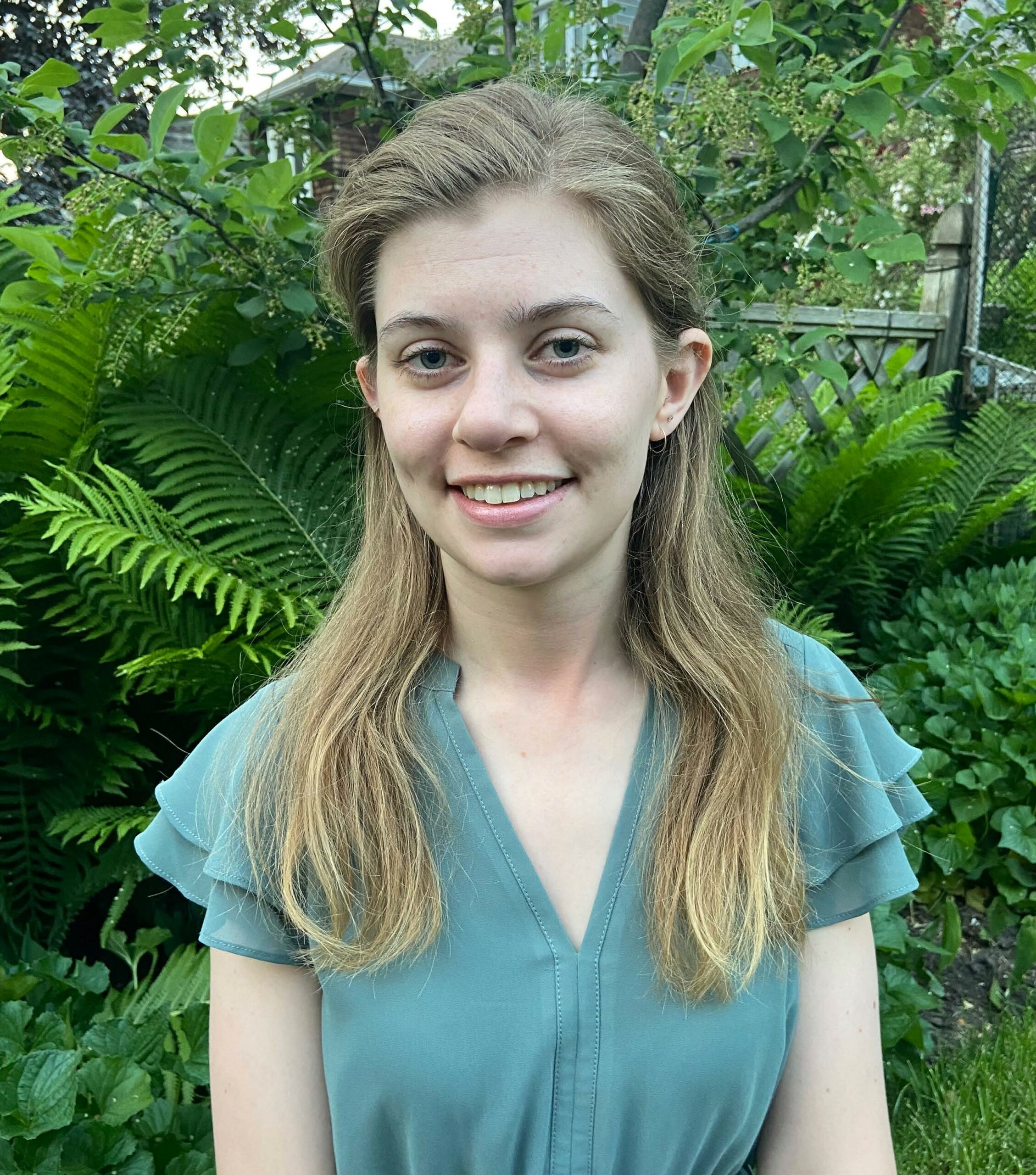
Markelle Morphet
Markelle (she/they) is a third year PhD student in the Department of Ecology and Evolutionary Biology under the supervision of Dr. Nicholas Mandrak at the Scarborough campus. They are of settler descent, growing up in central Ontario.
Their research focuses on fish conservation, specifically comparing the efficiency of fish community sampling methods in partnership with the Saugeen Ojibway Nation (SON) on Lake Huron and Georgian Bay. Markelle’s projects follow SON guidelines on working together in an ethical space, while considering both Western and Indigenous Ecological Knowledge systems.
Markelle enjoys volunteering with U of T science communication groups and literacy organizations. The rest of their time is spent playing sports outdoors.
Previous work has included investigating impacts of wastewater effluent on fish behaviour and zooplankton assemblages at McMaster University.
Coming soon!

Robert Hechler
Robert Masaki Hechler is a Japanese Canadian and German PhD student working with Dr. Martin Krkosek at University of Toronto’s Department of Ecology and Evolutionary Biology. He is broadly interested in understanding how environmental stressors impact biodiversity and does so using a combination of experimental, field, molecular and bioinformatic approaches. Robert obtained a BSc from the University of British Columbia and MSc from McGill University, where he developed a non-invasive method of monitoring biodiversity health using the genetic material organisms shed into the environment. Robert is also an active community member who led the creation of a U of T research award for racialized undergraduates evaluated on research motivation and skills gained through lived experiences, rather than GPA.
Monitoring the health of organisms via genetic analyses is crucial for biodiversity conservation, but conventionally requires intensive animal handling and tissue sampling. Experimental work demonstrates that genetic material naturally shed by organisms into the environment can serve as a non-invasive alternative to conventional tissue samples, but this remains to be tested in nature. My project investigates whether this environmental RNA (eRNA) can reveal the health status of wild Pacific salmon by comparing signals of salmon tissue to that of eRNA from stream water. This work is conducted in collaboration with the Musgamagw Dzawada’enuxw Fisheries Group and is of local importance as it provides insights into the health of salmon in Musgamagw Dzawada’enuxw watersheds. As all organisms shed genetic material into the environment, eRNA also has potential applications beyond salmon and could enable researchers to broadly monitor biodiversity health in response to environmental change.
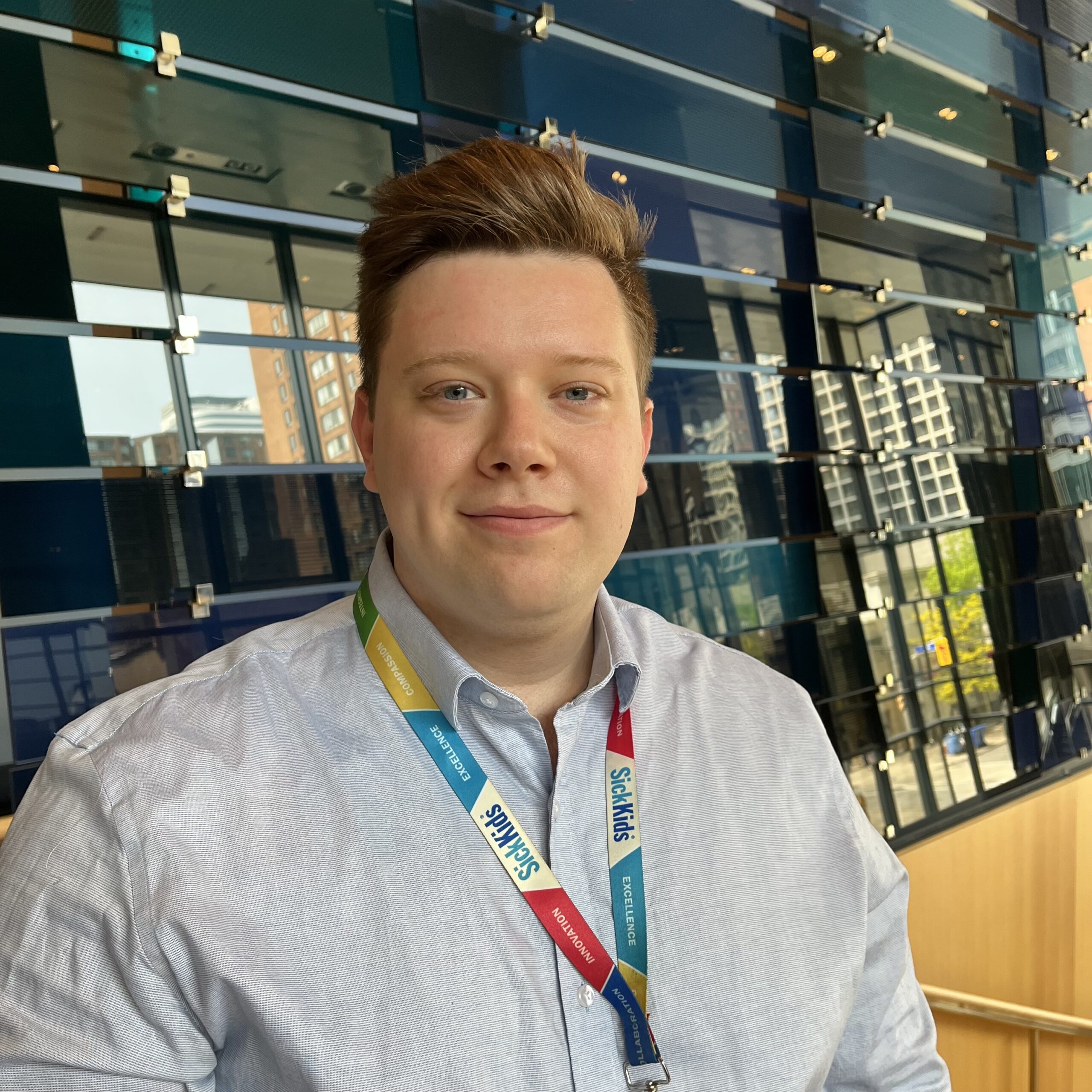
Ryan Marks
Ryan Marks is a PhD candidate in Molecular Genetics at the Hospital for Sick Children. His research focuses on developing translational applications of CRISPR-mediated genome editing for the treatment of paediatric neuromuscular conditions, with a primary interest in Duchenne muscular dystrophy. Prior to his doctoral training, Ryan completed both a BSc(H) in Life Sciences with Distinction and a Canadian Institutes of Health Research-funded MSc in Immunology at Queen’s University. Ryan has published high-impact papers demonstrating the preclinical efficacy of various CRISPR genome editing strategies and is actively involved with Cure Rare Disease, a non-profit biotechnology organization spearheading clinical trials of CRISPR therapies for rare genetic disease. He is a passionate educator who enjoys mentoring students both in the laboratory and through his teaching appointments, as well as engaging patients and families with the latest advancements in his field. He plans to use this fellowship as an opportunity to further advocate for rare disease patients and to advise on policy that facilitates equitable and ethical implementation of genome editing technologies as they transition into clinical application.
Our team has made significant progress in the development of CRISPR genome editing approaches for the treatment of paediatric genetic conditions. CRISPR is a programmable DNA-cutting enzyme developed to function similarly to a set of “molecular scissors” allowing geneticists to excise regions of DNA responsible for causing genetic disease to provide a permanent, potentially curative intervention. While CRISPR has revolutionized the way we think about treating genetic disease, the utility of the technology is limited by our inability to perform more refined therapeutic manipulation of the genome.
Prime editing is a CRISPR-derived genome editing technology capable of precisely introducing all types of small DNA insertions, deletions, and substitutions—we now have tools that allow us to directly rewrite sequence changes into the genetic code. Our study involves engineering the prime editor complex to improve its compatibility with clinically validated viral delivery methods, in addition to systematically enhancing the expression, stability, and efficiency of prime editing. Our ultimate goal is to demonstrate the preclinical efficacy of prime editing to correct patient-representative mouse models of Duchenne muscular dystrophy. This proof-of-concept study will yield significant improvements in genome editing fidelity and safety, with broader implications for the treatment of disease-causing variants in many conditions beyond Duchenne muscular dystrophy.
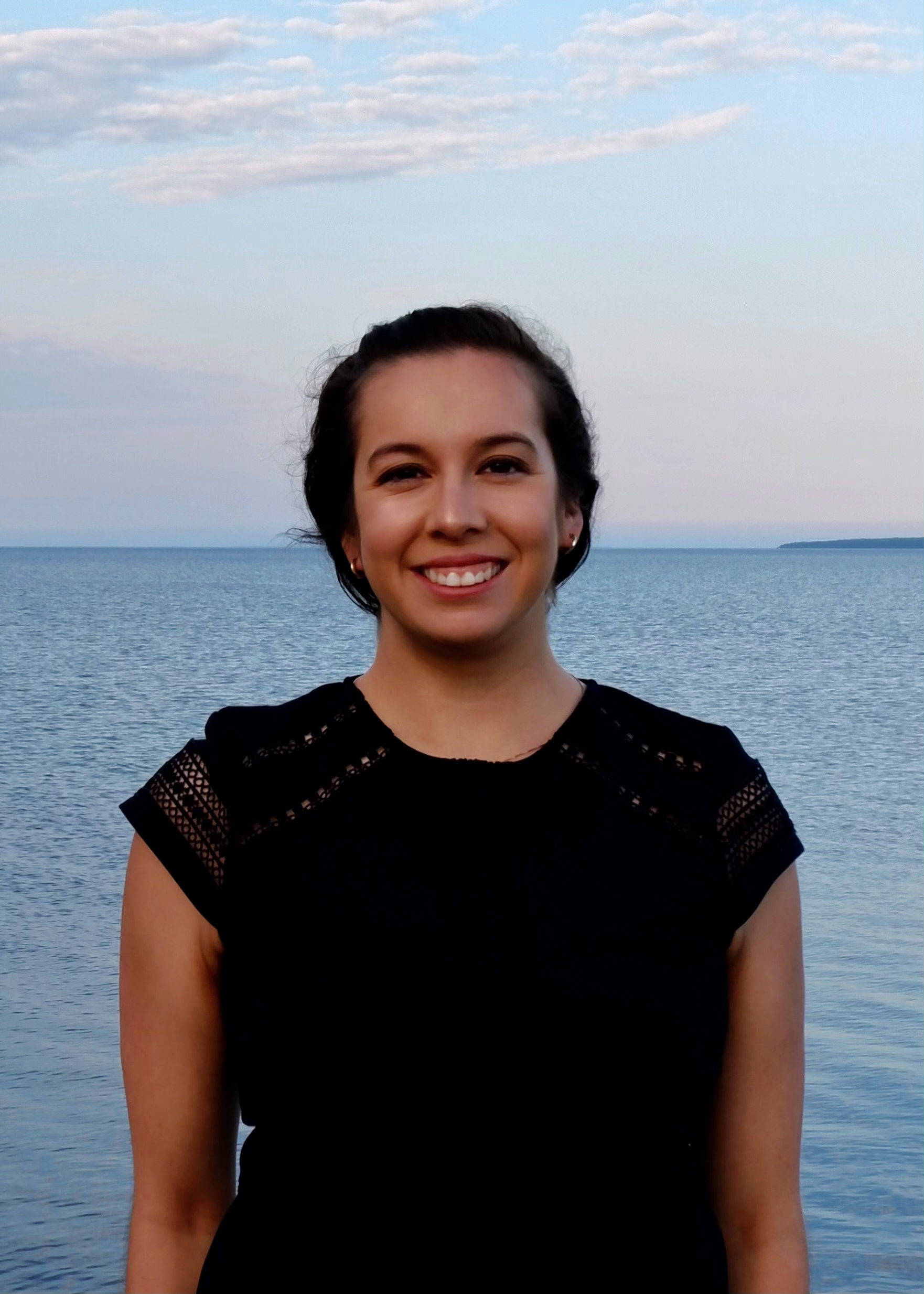
Shanna Peltier
Shanna Peltier (she/her) is a proud Anishinaabe kwe who grew up in Wiikwemkoong Unceded Territory located on the beautiful Mnidoo Mnis (Manitoulin Island), Ontario. Shanna is a Ph.D. candidate in the School and Clinical Child Psychology program at the Ontario Institute for Studies in Education – University of Toronto.
Shanna is a Canadian Institutes of Health Research Vanier Scholar (2020-2023) in Societal and Cultural Dimensions of Health, and she recently became a Connaught Public Impact Fellow (2023-2024). Her research seeks to give rise to culturally considerate and socio-politically entangled theories of complex death, namely Indigenous suicide. She aims to co-generate Indigenous community-led social actions on complex death, which address colonial violence and promote wellbeing. Her doctoral dissertation aims to explore how the Anishinaabe health philosophy of mino-bimaadiziwin – “Good Living/The Good Life” – may prevent suicide and promote life within Indigenous communities. Shanna is a research assistant within the Critical Health and Social Action Lab, wherein she works closely with the Network Environments for Indigenous Health Research (NEIHR) Ontario.
Coming soon!
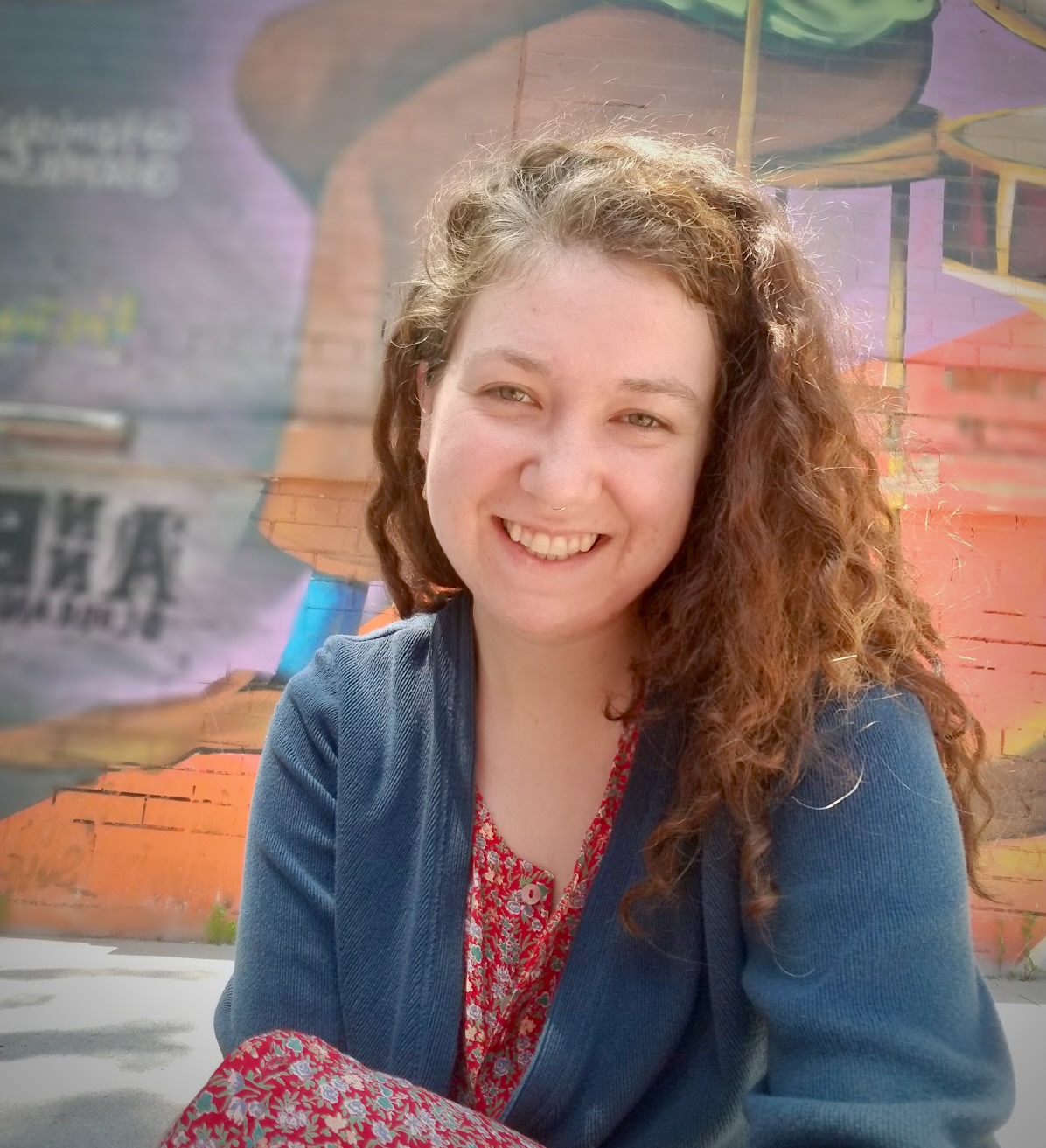
Sophie Marois
Sophie is a PhD student in Sociology at the University of Toronto. Her main research interests lie at the intersection of cultural and political sociology, feminist and critical race studies, and the sociology of punishment. She is the recipient of a Canadian Graduate Scholarship (SSHRC), which supports her dissertation project on the commemorative politics of religiously and racially targeted violence in Canada. In addition to her dissertation, Sophie is involved in a number of research projects on responses to mass violence, collective memory, and terrorism. Off campus, she is a board member of the Ligue des droits et libertés—section de Québec and a volunteer organizer for annual commemorations of the 2017 mosque massacre in Québec City. She holds an MA in Sociology from Laval University.
On January 29, 2017, six Muslim worshippers were killed, and five others gravely wounded when a white man opened fire at the Québec City Islamic Cultural Centre, shortly after the end of evening prayers. Four years later, on June 6, 2021, four members of a Muslim family were killed while they were taking an evening walk in their London, Ontario neighbourhood. The assailant, a young white man at the wheel of a truck, is alleged to have targeted them because of their faith. These massacres are part of what activists and scholars have denounced as a surge in attacks against racial and religious minorities in Canada.
My dissertation research investigates public responses to these targeted attacks, with a focus on commemorations of anti-Muslim violence in recent Canadian history. More specifically, I aim to understand 1) how and why different actors mobilize around distinct memory projects of these attacks, and 2) what competing worldviews, solidarities, and political agendas these actors promote or reject. This line of inquiry builds on recent scholarship in cultural and political sociology that investigates sociopolitical tensions and conflicts through the study of commemoration. My research aims to contribute to this literature by interrogating the transformative potential of commemorative efforts in building solidarities and tackling deep-rooted exclusions in the aftermath of racially or religiously targeted massacres.
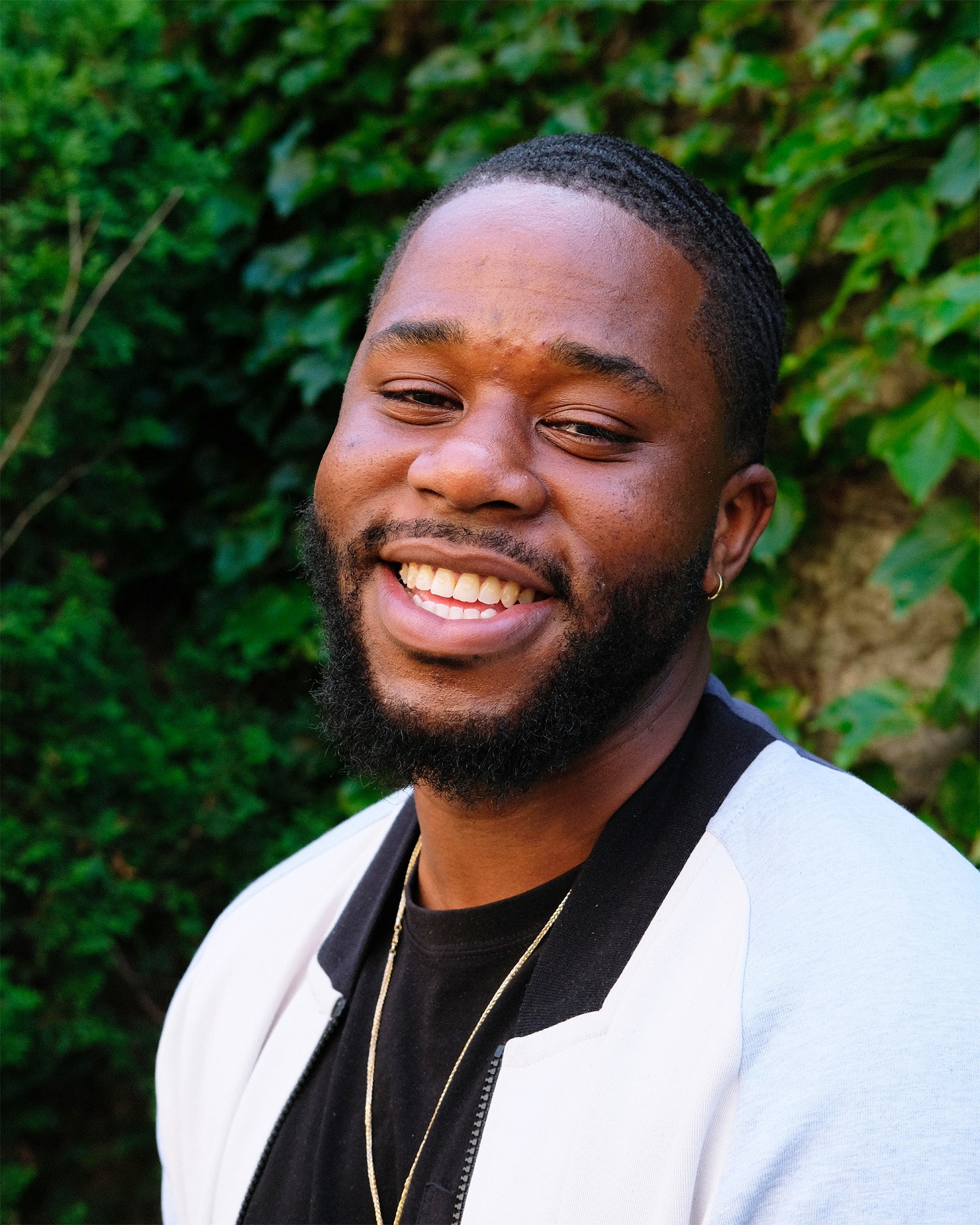
Travonne Edwards
Travonne Edwards is an assistant professor in the School of Child and Youth Care at Toronto Metropolitan University. He is also a fitfth-year PhD of Social Work Candidate in the Factor-Inwentash Faculty of Social Work program at the University of Toronto. He currently holds an advanced diploma in Child and Youth Care (CYC) from Sheridan College, and a Bachelor and Master of Arts in CYC from Toronto Metropolitan University.
Travonne is an experienced critical and community-based youth worker with a demonstrated history of working in various social services related settings including child welfare and protection, education and supportive housing for youth experiencing homelessness. Travonne has been awarded the Doctoral Social Sciences and Humanities Research Council award for his research efforts. His program of research aims to understand how state systems operate and how Black communities experiences them to one day improve their realities and outcomes. He currently works as a project director of a research project which partners with the Ontario Association of Children’s Aid society One Vision One Voice, which is a program led by the Black community to address the overrepresentation and disparities faced by Black Canadians.
Black families regularly endure unhelpful and unnecessary maltreatment referrals to child welfare agencies. There is a widespread and unchallenged belief in child welfare practice that maltreatment reports and subsequent investigations are benign experiences, but evidence to support this belief is limited. Black community members have demonstrated that educators, police, and other professionals who serve young people are disproportionately reporting Black families to child welfare, including families who are not responsible for actual maltreatment.
Presently, Ontario is investigating Black families at disproportionate and disparate rates, and many of these families never receive services or supports after an investigation. These investigations are intrusive activities including home visits and the collection of private information from the investigated family. Though a large proportion of Black families are investigated, less is known about the harm of investigations that do not provide any support (e.g., supervision, service referrals), as well as the threat of apprehension experienced by Black families in these interactions. Given that the disparity of overreporting is known but the impact of unnecessary maltreatment investigations is not, my research project will fill this gap in knowledge.
My research will investigate child protection workers perspectives on the impacts of unnecessary investigations on Black families and how unnecessary investigations shape Black families’ perceptions of the child welfare system. The objective of my research project is to aid in the relational repair between Ontario’s child welfare system and the Black community by providing data that documents the impacts of investigations, and once the impacts are clear, to shift policy and practice amongst the child welfare and allied systems.
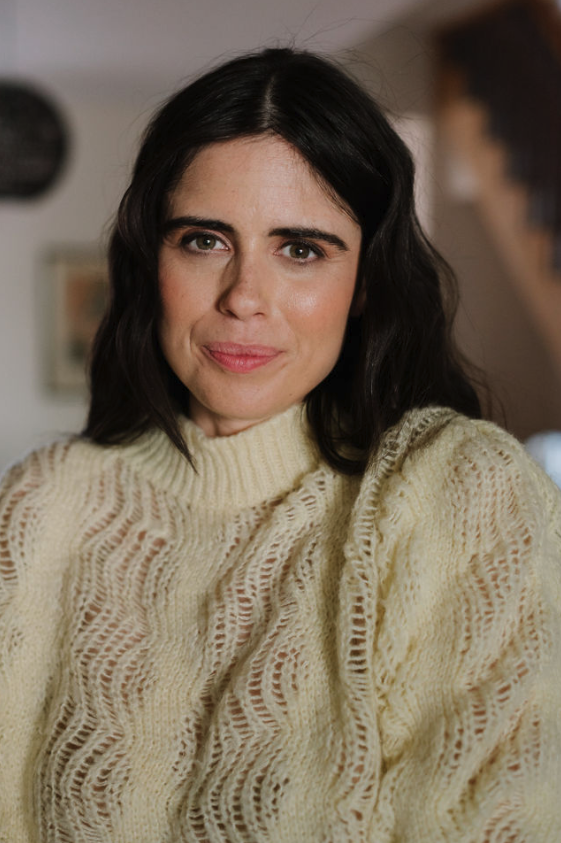
Olivia Doggett
Olivia Doggett is a PhD candidate between the Faculty of Information and the School of Environment at the University of Toronto. She is a SSHRC Doctoral Fellow, a Connaught Public Impact Fellow and a Climate Positive Energy Graduate Scholar.
For her dissertation, Olivia uses a mixed methods research design combined with critical design methods to investigate the social, political, and ecological circumstances of how migrant farm labour and agricultural technologies shape large-scale commercial farming practices and to interrogate how these labour production systems can be redirected to support more sustainable and socially equitable agricultural practices. Her research outcomes are directed to promote community-based knowledge sharing and interventions that support migrant farmworkers and alternative growing practices. Prior to her doctoral studies, Olivia worked as a design strategist and researcher in financial and non-profit services. She holds a B.A. in Cultural Studies from McGill University and a Master of Information in Information Systems and User Experience Design from the University of Toronto.
The viability and security of our food systems is a serious concern for the survival of our planet. Faced with projections for worsening climate change impacts, increased food insecurity, and a widening labour shortage, the Canadian government is turning to agricultural technologies (agtech) as a means of addressing imminent and critical food system challenges. My dissertation investigates this current landscape, focusing specifically on the social, political, and ecological circumstances of how migrant farm labour and agtech shape farming practices in Canada, and how these labour systems may be redirected to support sustainable and equitable food systems.
Throughout the Connaught PhDs for Public Impact Fellowship Program, I will coordinate a series of participatory design workshops with migrant farmers, growers, technologists and policy makers. Through these workshops, I hope to identify policy and design recommendations and interventions for agtech that are inclusive of migrant farmer expertise and values, and that support sustainable, localized agricultural practices.
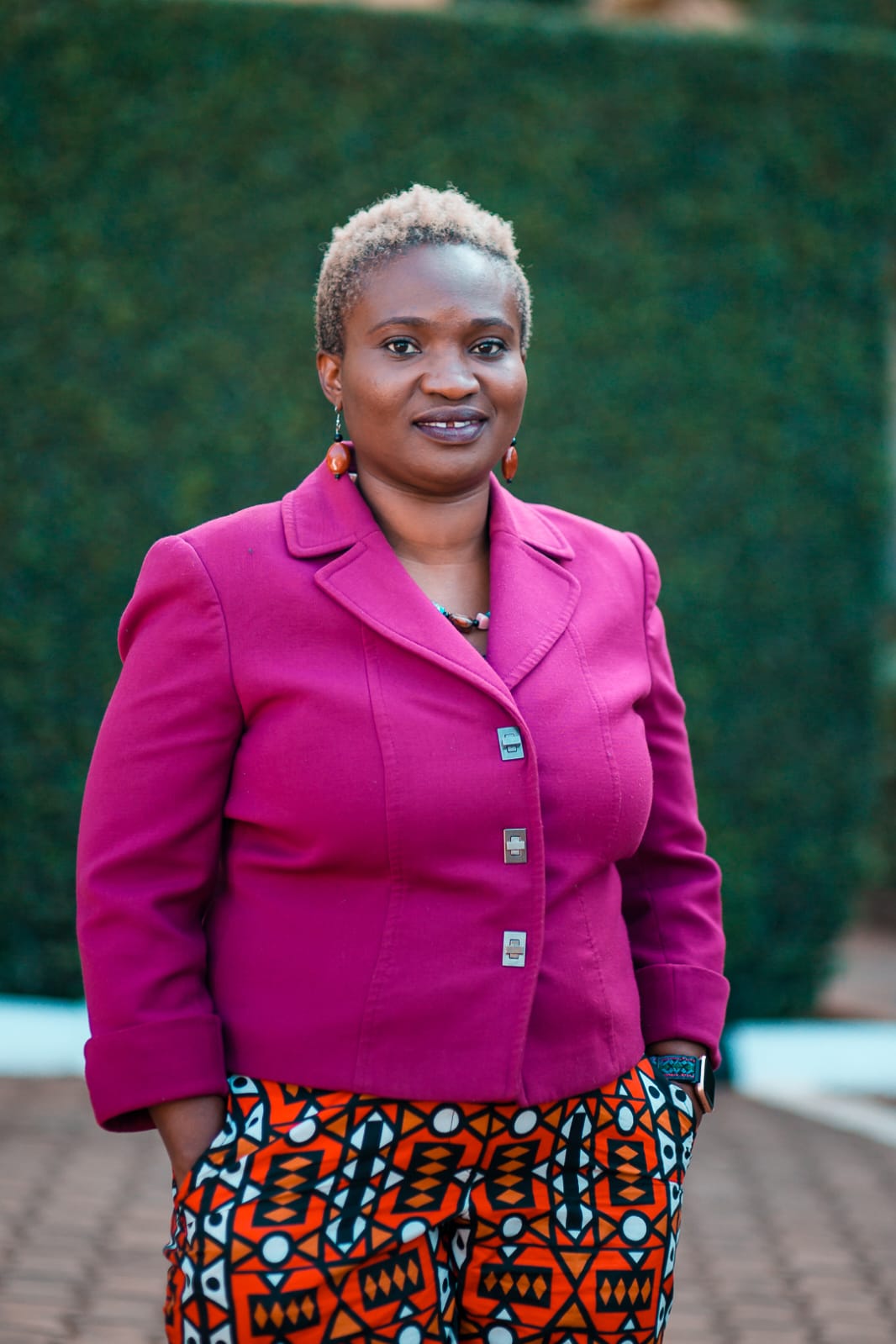
Wumi Asubiaro Dada
Omowumi Asubiaro Dada (Wumi) is a PhD candidate at the Centre for Criminology and Sociolegal Studies. Prior to her Ph.D studies, she worked as a human rights lawyer on issues of social inequality, gender-based violence and inclusion. She received a Bachelor of Laws degree from Lagos State University, Nigeria, was called to the Nigerian Bar, and obtained a Master of Law Degree from the University of Pretoria in South Africa. Wumi has worked in law and public policy for the past 21 years to design and manage projects for non-governmental organisations, government agencies and international development agencies. As a feminist, she makes significant personal and technical contributions to the women’s movement in Nigeria and Africa. She co-convenes the Feminist Womanifesto- one of the biggest platforms for feminists organising in Nigeria and sits on the boards of BAOBAB For Women Human Rights, Gatefield Africa, Abode Community Centre (Canada) and the Centre for Redefining Alternative Civic Engagement for Africa.
Wumi’s PhD project advances new understandings of the women’s practices and advances multidimensional understandings of conflict prevention with gender and power at the centre. The project argues that despite women’s exclusion from formal (and even) informal peace building and conflict prevention mechanisms, their preventative practices, often unintelligible to predominant political thought, have the potential to serve unending cycles of conflict in postcolonial states such as Nigeria. The main goal of Wumi’s project is to raise the value of women’s preventative work in conflict situations by reinscribing new practices and norms in government policies and projects.

Yanfei Lu
Yanfei Lu (吕彦霏) is a Ph.D. student at the Linguistics department. Since her Honours BA and MA at Western University, her research has been focusing on revitalizing and documenting the endangered North American Indigenous Language, Oneida.
Yanfei is currently collaborating with the Twatati Adult Oneida Immersion program and the Indigenous Languages Technology project team at the National Research Council of Canada (NRC) to develop a digital verb conjugator to help learners acquire Oneida more efficiently.
Yanfei is also a research assistant of the Indigenous Language Revitalization Team at U of T as well as a cohort member of the WhereWeStand project of the Canada Excellence Research Chair in Migration and Integration program at the Toronto Metropolitan University.
Oneida is the language of the Oneida people. It currently has a very small number of native speakers that the UNESCO Atlas of the World’s Languages in Danger has marked Oneida as critically endangered. Thousands of years of traditional knowledge of the Oneida people are passed down through language. If the Oneida language is no longer spoken, the survival of various aspects of Oneida art and culture will be threatened as well. Meanwhile, the lack of resources and the significant differences between the structures of Oneida and English pose many challenges for adult learners who are native speakers of English.
The goal of my doctoral research is to help learners acquire Oneida easier, faster, and better by 1) analyzing how adult learners acquire the sentence, word, and sound structures of Oneida; and 2) developing resources and tools based on the interests and needs of the Oneida learners and the Oneida communities.
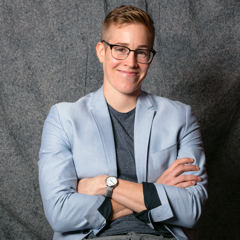
Ali Greey
Ali Greey is a doctoral candidate in the Department of Sociology. Their doctoral research examines queer, trans, and non-binary youth agency and activism in K-12 schools.
In 2021-2022, Ali led the Beyond Bullying Project to study youth gender and sexuality in schools. Ali has also published on the experiences of trans and non-binary athletes and media representations of the Movement for Black Lives.
Ali is the co-editor of two volumes: Justice for Trans Athletes and Trans Athlete Resistance and is a co-author of the forthcoming book Trans Athlete Embodiment.
Ali is a SSHRC-Bombardier scholar and a retired member of the Canadian national Olympic Boxing team. Ali is actively involved with Athlete Ally, a non-profit devoted to advancing LGBTQ2SIA+ inclusion in sport.
Ali is also currently working with TransPulse and the Canadian Centre for Ethics in Sport to assist national sporting organizations in making sport more trans-inclusive.
Ali’s doctoral work examines how K-12 schools are adapting practices that rely on binary understandings of gender (boys/girls) in response to the growing visibility of trans and non-binary youth.
Ali investigates how 1) trans and non-binary youth are reshaping these practices and structures, demanding that their schools accommodate and anticipate trans and non-binary students; and 2) how administrators and teachers are responding to the growing visibility of and activism from trans and non-binary youth in their schools.
Ali will use ethnographic research in two private schools in Toronto, schools in which students, teachers, and administrators are actively grappling with questions of how to accommodate and anticipate the increasing number of out and visible trans and non-binary youth. Youth Advisory Boards (YAB) are also an important part of their research. Ali will consult with 3 YABs throughout project design and dissemination.
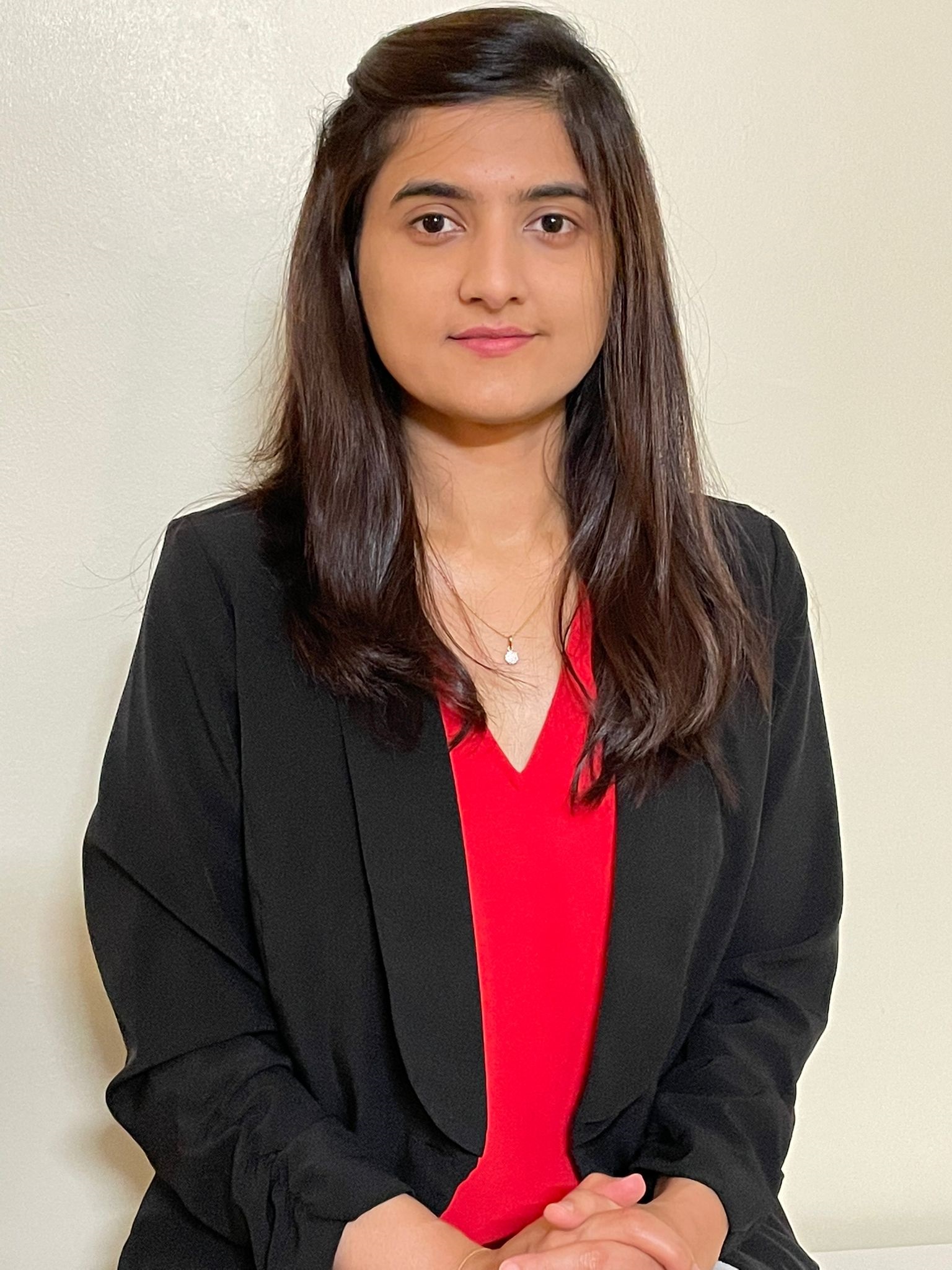
Anam Shahil Feroz
Anam Shahil Feroz is a Ph.D. Candidate at the Institute of Health Policy, Management and Evaluation, University of Toronto. She has received her BSc in Nursing and MSc in Health Policy and Management from Aga Khan University, Karachi, Pakistan. Shortly after, she began working actively in the field of public health to address health systems issues of access, affordability, and quality of healthcare services.
Her current topic of research for her Ph.D. is inspired by seeing countless pregnant women die of preeclampsia and eclampsia. Her doctoral research work will contribute to the United Nations’ Sustainable Development Goal 3.1 of reducing maternal mortality ratio less than 70 per 100,000 live births and will also provide insights into methods and findings that can be applied to improve maternal health outcomes in other developing countries, that may face similar challenges.
As an early career researcher, she has published 55 papers (21 publications as the first author) in high-impact peer-reviewed journals in the field of maternal health and digital health research.
My Ph.D. research will explore how feasible it is to implement a mobile phone-based telemonitoring program for pregnant women at high risk for preeclampsia in Karachi, the largest city in Pakistan.
Phase 1 will focus on the preparation for the feasibility study, including the development of a telemonitoring program using user-centered design principles as well as a comprehensive implementation plan.
Phase 2 will execute the implementation plan and assess the feasibility of implementing the telemonitoring program for high-risk pregnant women. Phase 2 will include 50 pregnant women at high risk for preeclampsia who will monitor blood pressures at home using the provided blood pressure machine and submit the readings and symptoms through the app to receive self-care instructions based on the entered data.
This will be the first study to explore the feasibility of having pregnant women in Pakistan use a telemonitoring system to support high-risk pregnancies. Lessons learned in this feasibility trial will be used to determine the appropriateness of a future large-scale effectiveness trial, as well as how best to implement such a trial.
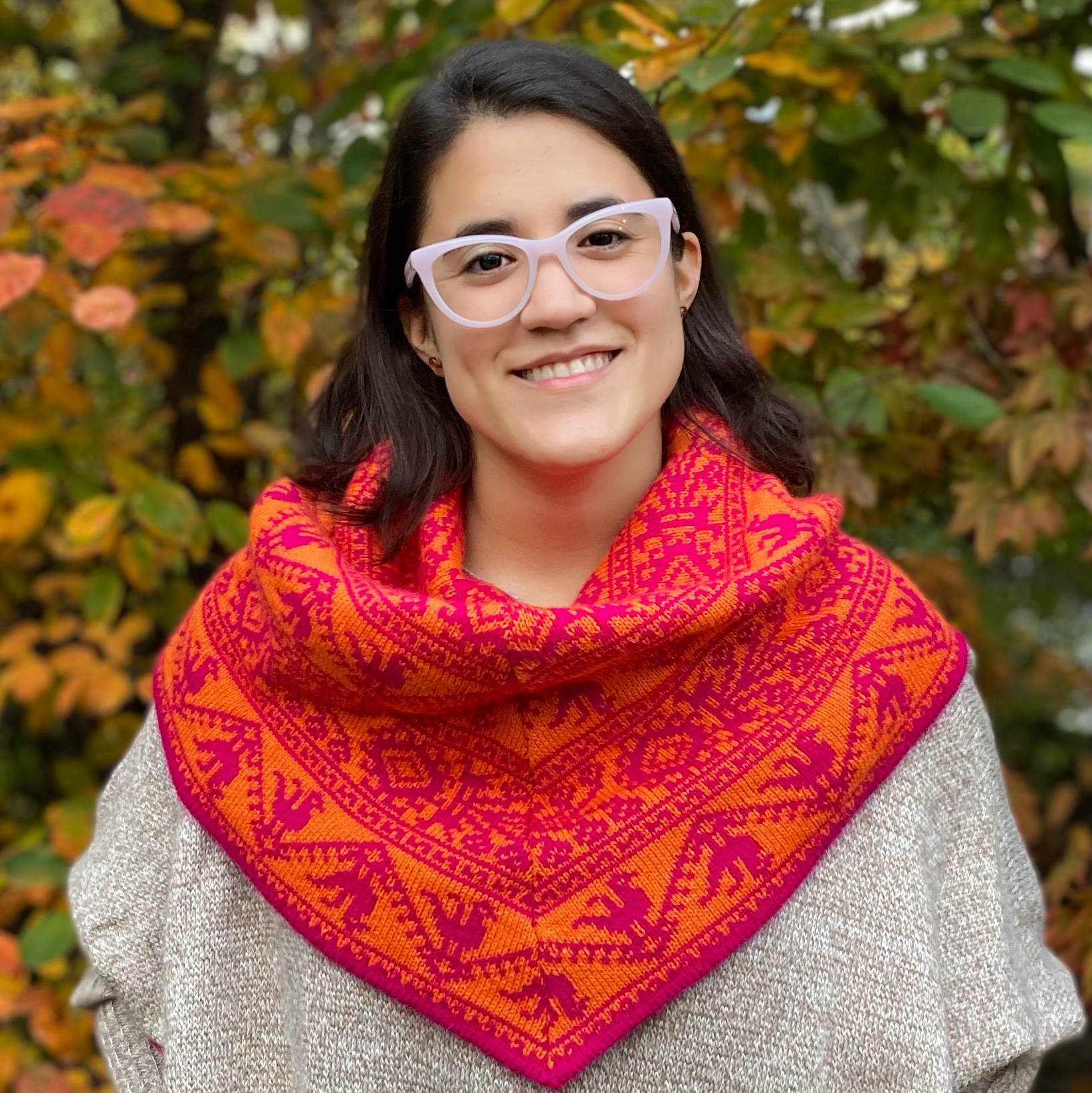
Andrea Román Alfaro
Andrea is a Peruvian Ph.D. candidate in sociology at the University of Toronto. She is a Vanier Canada Graduate scholar, a Mary H. Beatty fellow, and a Connaught Public Impact Fellow. She holds an M.A. in Sociology from the Pontificia Universidad Católica del Perú and a B.A. in sociology and government from Skidmore College.
Currently, Andrea is working on her dissertation titled, Mothering in the Margins: Violence, care, and survival in Callao. In her dissertation, she examines the dynamics and politics of violence in Callao, Peru, from women’s perspectives. Andrea has published in Spanish and English.
Before her Ph.D., she worked in Peru as a course instructor and researcher, where she taught social science courses and did research on education, gender and inequality. She has published in Social Justice and Curriculum Inquiry. Her current areas of interest include the sociology of violence, punishment, criminalization, gender, and healing.
In November 2021, the Peruvian government declared the district of Callao, Peru, in a state of emergency due to increased criminality for the second time. This policy curtailed constitutional rights, allowing the deployment of the police and military to fight against crime. However, this policy has not changed the conditions that make violence possible since government decisions are based on stereotypes that portray residents as suspicious and violent.
My project seeks to challenge the perceptions of a marginalized urban community in Callao, Peru – perceived as violent – and give young people the tools to define themselves and their community differently. Using drawing, photography, and film, we will work with 25 kids between 10 and 14 to process and express their experiences through art. We will collectively curate an exhibit for community residents and the public. The project encourages participants to challenge how the public perceives their community through creative outputs.
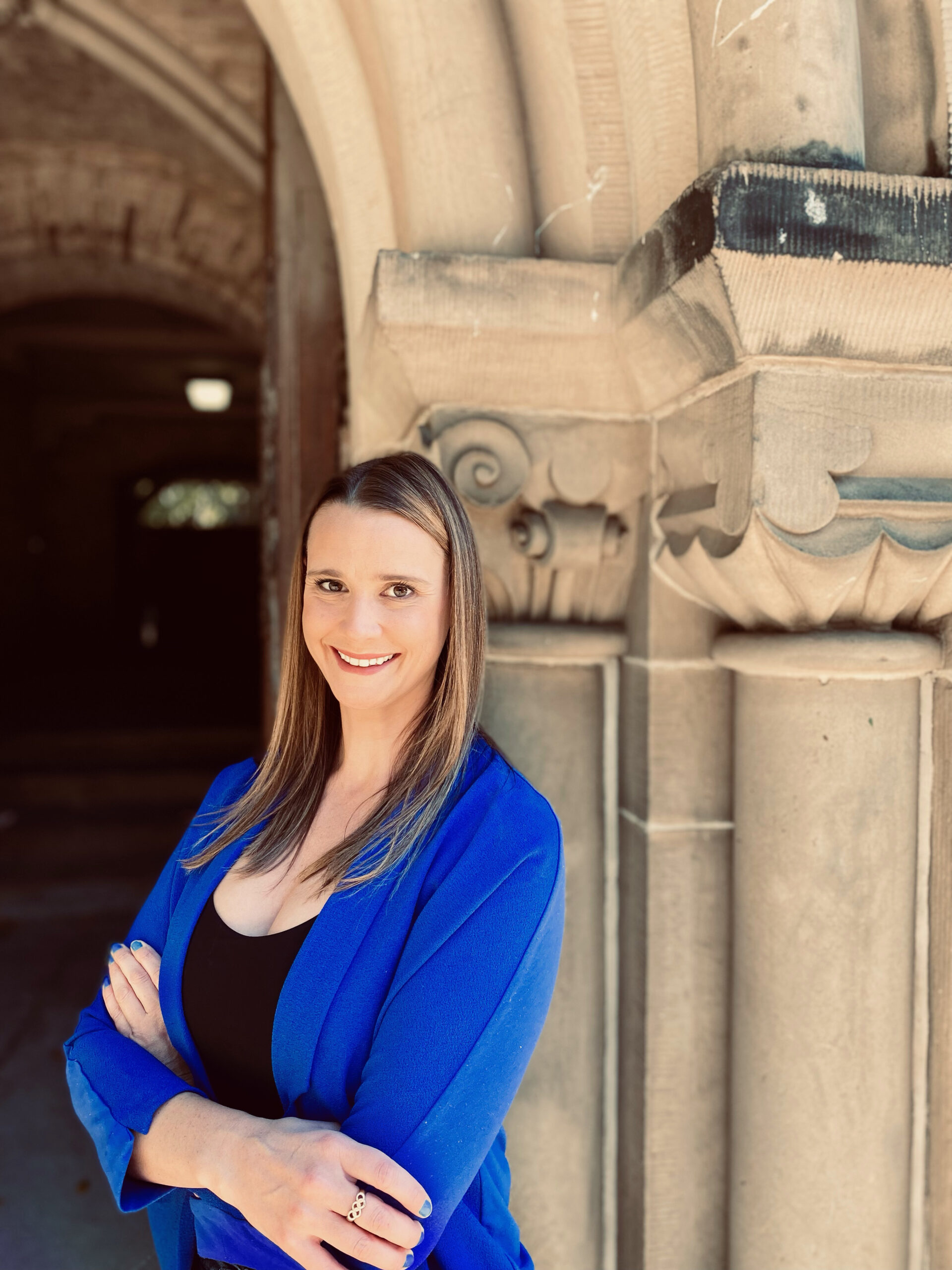
Erin Willson
Erin is a PhD Candidate in the Faculty of Kinesiology and Physical Education. Her research focuses on preventing, addressing, and understanding abuse in sport. Her passion for this topic was inspired by her own experience representing Canada at the 2012 Olympic Games in the sport of artistic swimming.
She embodies research to practice approach to her work, which can be seen with her role on the Board of Directors of AthletesCAN, the association of Canadian National Team athletes. In this role, she advocates for National Team athletes within the Canadian sport system to ensure Canadian sport is as athlete-centred as possible. This includes addressing issues of safe sport (abuse and discrimination), athlete representation, and sport policy.
In recent years, there have been several reports of athletes experiencing Gender-Based Violence (GBV) in sport. In Canada, athletes from rowing, artistic swimming, bobsled, and gymnastics have spoken publicly about the abusive cultures in their sports. There is limited research on GBV and its effects, particularly on mental health and withdrawal from sport among Canadian youth athletes. My dissertation study intends to fill this gap.
This study will be conducted in two phases. First, an anonymous, online survey will assess the rates of GBV and reported effects (mental health, satisfaction with sport, intent to leave sport). Second, interviews will be conducted with athletes from equity-deserving groups to better understand how identity factors (race, gender, sexual orientation, ability) influence experiences of GBV.
By advancing our understanding of the landscape of GBV in Canadian sport, recommendations for preventing and addressing GBV will be made.

Jaime Grimm
Jaime Grimm is a second-year Ph.D. student in Ecology and Evolution under the supervision of Martin Krkosek (U of T) and Andrew Bateman (Pacific Salmon Foundation). As a first-generation university student with mixed European and Manitoba Saulteaux heritage, she grew up in coastal British Columbia.
She is driven by the need to find socially and ecologically-just solutions to wildlife conservation issues, especially in terms of recognizing Indigenous rights and sovereignty. She enjoys being outdoors and in water as much as possible, as well as knitting and reading SciFi.
Prior to beginning Her PhD, she completed a master’s degree in Invasion Ecology from McGill University and worked as a researcher for the Wildlife Conservation Society Canada.
My research uses a combination of field work, environmental DNA analysis, and mathematical modeling to explore the distribution of fish pathogens in coastal British Columbia. By identifying the areas and environmental conditions associated with elevated levels of pathogens, we can better understand and mitigate risks to wild salmon. In addition, this research will inform the spatial management of aquaculture facilities to minimize the spread of disease among farms.
My work takes place in partnership with, and on the unceded lands of many coastal First Nations, including the Ahousaht First Nation, the Tla-o-qui-aht First Nation and the Mowachaht / Muchulaht First Nations. Additional project partners include Fisheries and Oceans Canada, the Pacific Salmon Foundation and Cedar Coast Field Station.
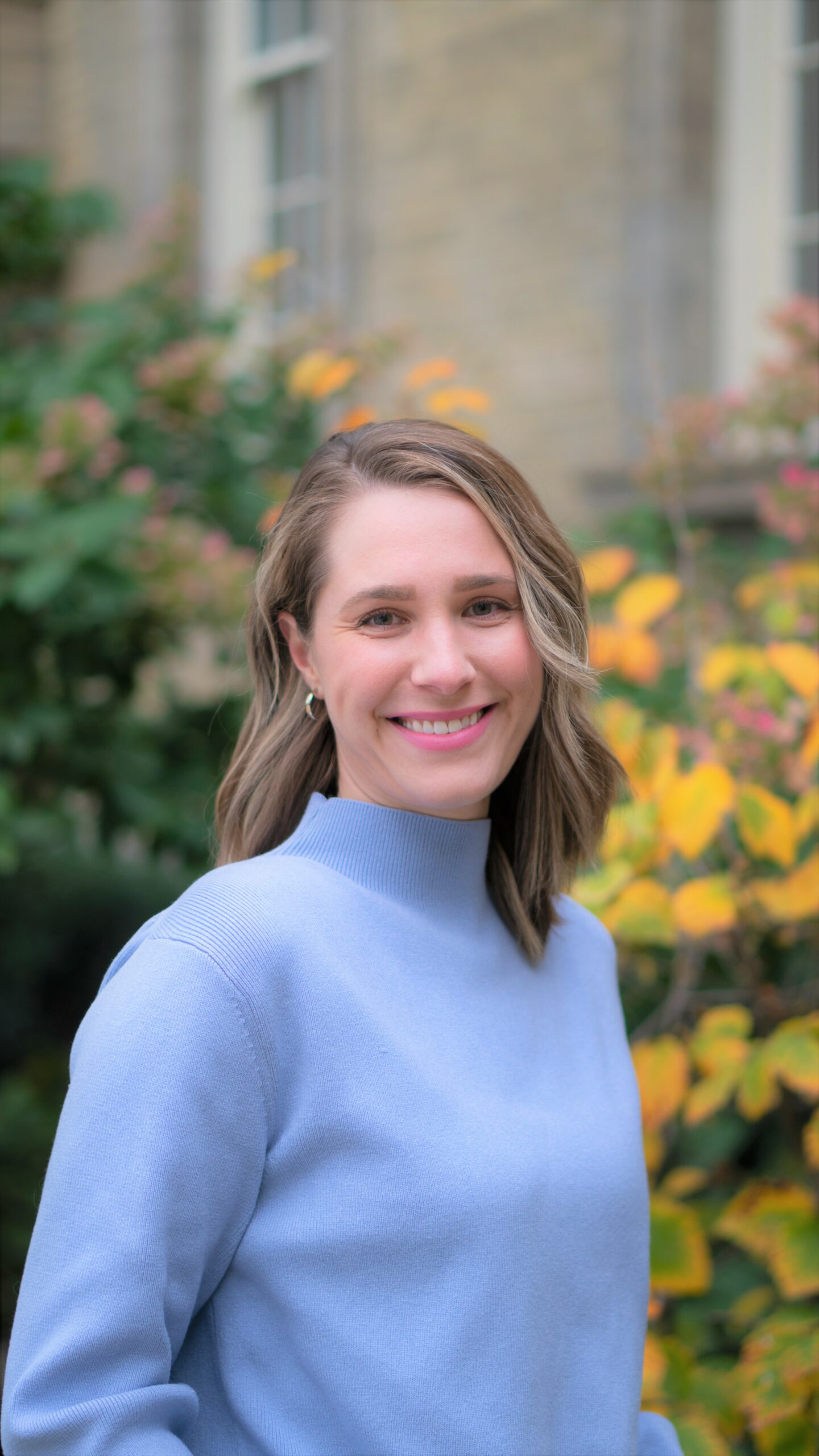
Madison Giles
Madison is a PhD candidate at the Dalla Lana School of Public Health and a Vanier Canada Graduate Scholar (2019 – 2022) and Connaught Public Impact Fellow (2022 – 2023). Madison is committed to conducting qualitative or mixed methods research in collaboration with community that examines the micro, meso, and macro aspects of a person’s sexuality.
Madison is currently a Course Instructor and the Research Manager of a national working group collating resources on sexuality and disabled youth. She also has experience as a Research Coordinator with Bloorview Research Institute, Ontario HIV Treatment Network, and #CripRitual. During her MSc, she was the Principal Investigator of a community-based research project that evaluated a sexual health education program for Indigenous youth. Madison mobilizes knowledge through scientific and community-facing knowledge products (e.g., art galleries).
Madison’s long-term research goal is to teach and lead research that aims to ensure everyone can thrive as sexual beings.
Access to sexuality resources are critical for the wellbeing of young Canadians. Unfortunately, the needs of some groups of youth are not being met, such as youth with physical disabilities (ywpd). Many ywpd do not receive information related to sexuality and there are limited resources that are disability-specific. Therefore, it is essential to hear from ywpd regarding their experiences and needs for their sexuality.
To do this, we are conducting a community-engaged arts-based study that works with ywpd to explore their sexuality. Intersectionality framework was employed to centre on the experiences of diverse youth (e.g., BIPOC and 2SLGBTQIA+ youth). A virtual adaptation of the method of body mapping was used, which helped 11 ywpd reflect on their sexuality and express themselves through art and conversation.
Findings from this research have the potential to initiate a paradigm shift in how ywpd are perceived, represented, and interacted with as sexual beings.
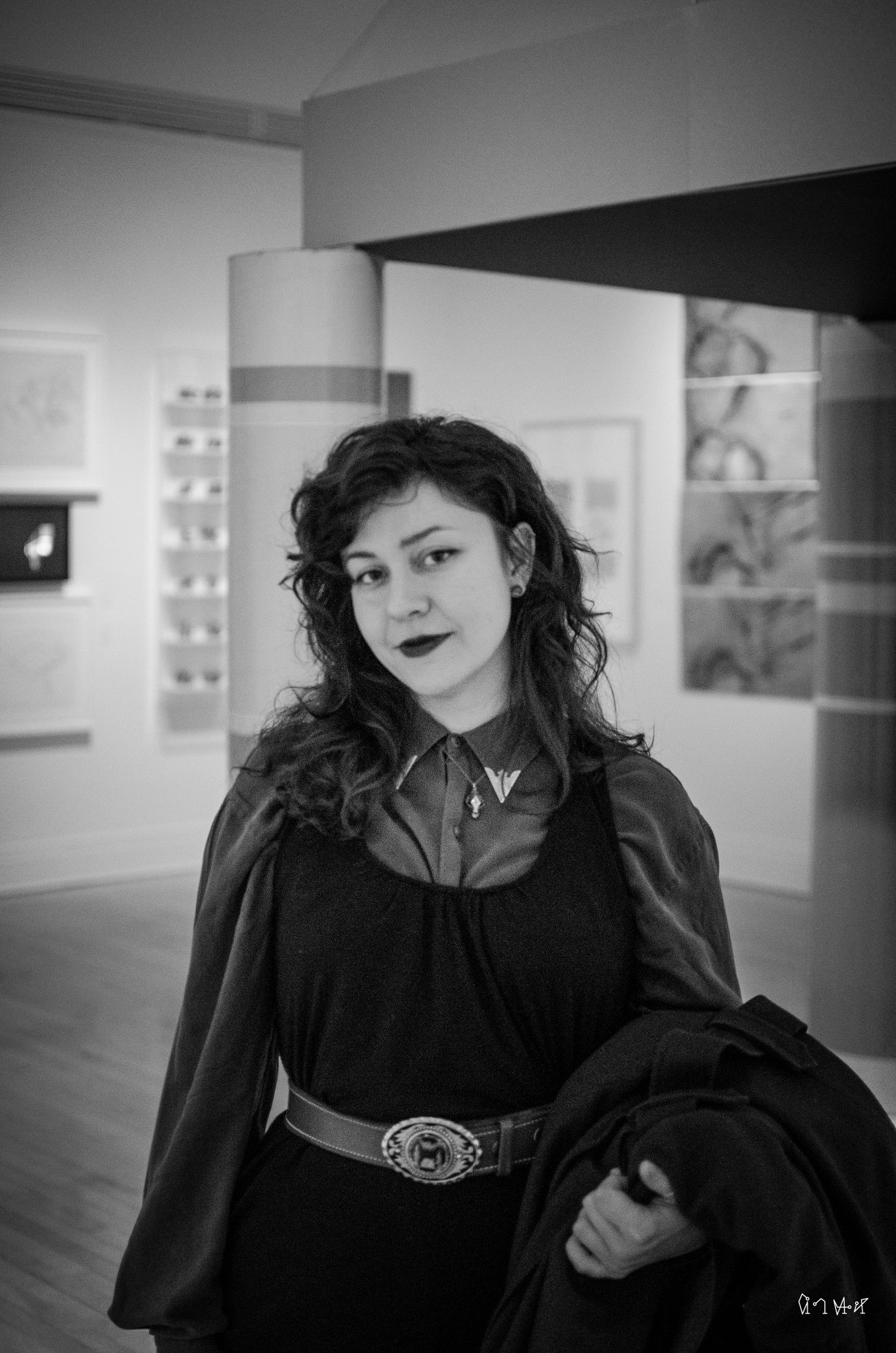
Maggie MacDonald
Maggie is a SSHRC-funded Ph.D. candidate at the University of Toronto’s Faculty of Information, where she researches the ongoing platformization of the pornography industry. She holds a graduate specialization in Sexual Diversity Studies and is research assistant to the Bonham Sexual Representation Collection, Canada’s largest archive of sex work and adult film history.
Maggie has published work on digital methods, deepfakes, labour governance, and the changing dynamics of porn’s cultural production under platforms. Learn more at internetmaggie.com.
My doctoral research examines transformations in pornography brought about by platforms using the case of Pornhub.com and the site’s parent company MindGeek. Over the past decade, Pornhub and similar sites have influenced popular discourse and transformed production standards in porn. My work considers the development, influence and regulation of massive technology companies that now mediate our entertainment online and manage user data to reconfigure social interactions, cultural production, and work. Using a blend of critical policy and discourse analysis, ethnography, and digital methods, I hope to produce the first comprehensive scholarly review of Pornhub’s operating model and the many competing discourses surrounding it.
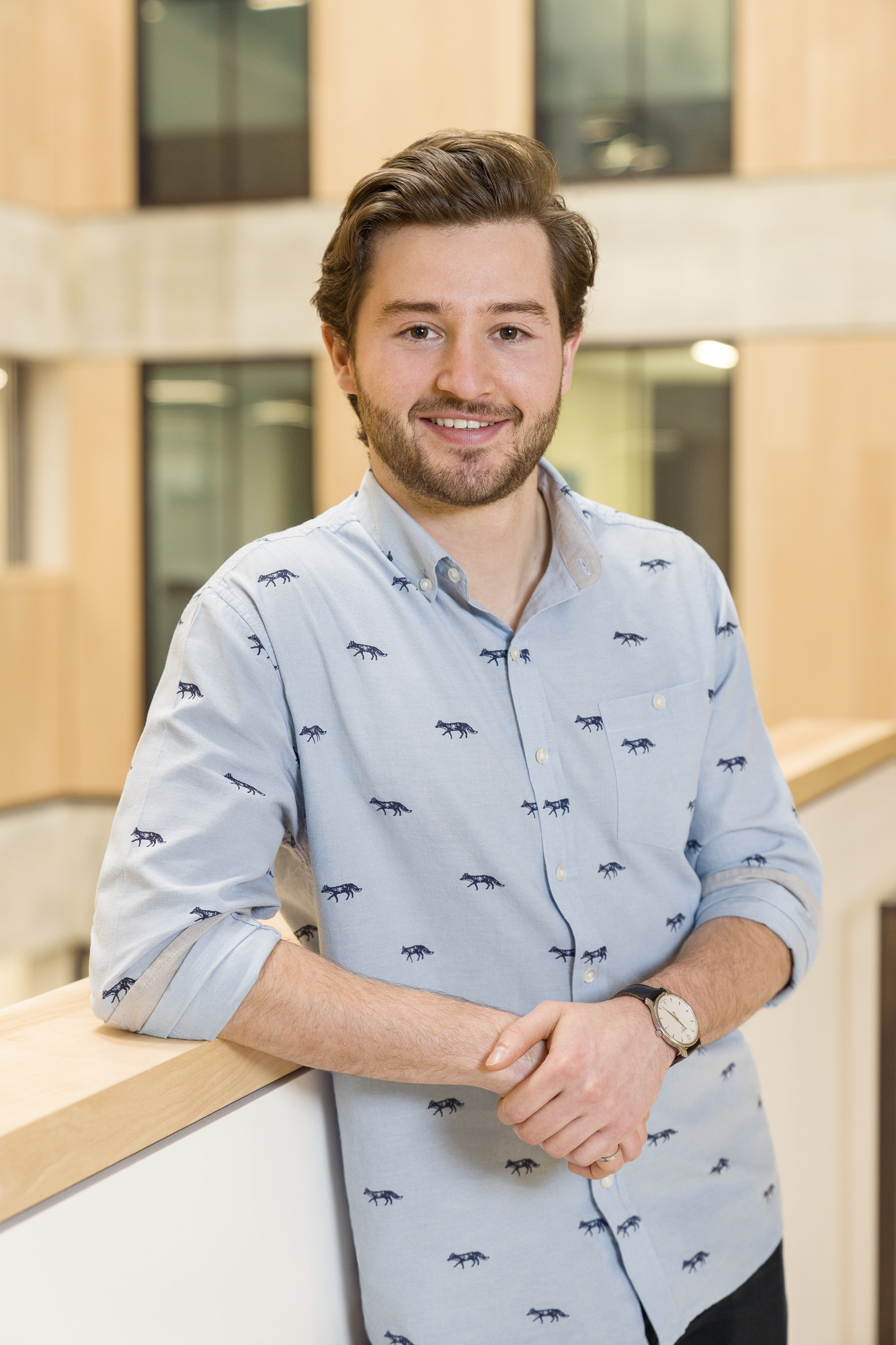
Peter Serles
Peter Serles is a PhD Candidate, Vanier Scholar, and Course Instructor studying the mechanics of nano-3D printed devices and structures. His research combines nanomechanical design with machine learning, live cell dynamics, and ballistic defence to leverage the high performance of nanomaterials for a wide variety of end applications.
Peter has authored more than 15 peer-reviewed papers in top international journals such as Advanced Materials, Science Advances, and Materials Today and has held research positions with the National Research Council of Canada and the Institut National des Sciences Appliquées de Lyon.
Peter is a Junior Fellow of Massey College and is an advocate of evidence-informed policy who volunteers with the Canadian Science Policy Centre and the Journal of Science Policy and Governance. He received an M.A.Sc. from the University of Toronto and a B.E.Sc. from Western University where he was awarded the Canadian Society for Mechanical Engineers Gold Medal.
Nanoscale-3D printing has revolutionized the design capabilities and flexibility of small-scale structures and devices with feature resolution down to 200 nm recently becoming a reality. This design freedom unlocked by nano-3D printing enables a unique opportunity to create a variety of next-generation functional components for healthcare, electronics, aerospace, or defence applications. These structures and devices range from replicating the local microenvironment that a cell would experience in the brain to help it grow, to ultra-strong and lightweight structures designed by machine learning algorithms that make use of the increased strength of nanoscale materials, to print-in-place electronic devices like accelerometers or gyroscopes for phones and computers.
Through mechanical design, prototyping, and failure analysis, this next generation of small-scale devices can be crafted with superior accuracy and performance enabling wide-reaching impacts in almost every field.
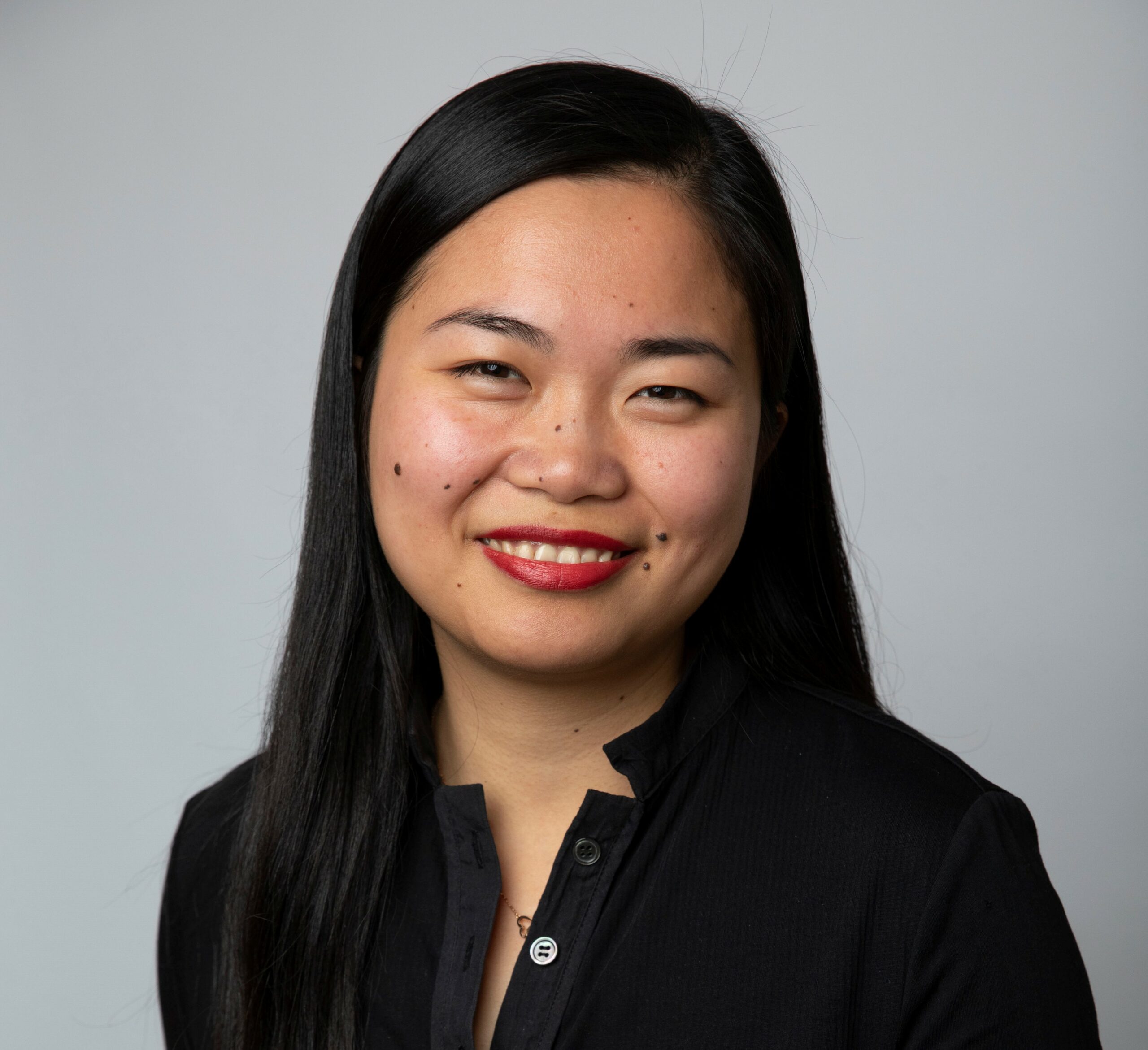
Q. Jane Zhao
Q. Jane Zhao is a Health Services Research PhD student with Dr. Andrew Pinto and the Upstream Lab. Forever compelled by the nuance of story, their work focuses on the intersection of health policy and health equity. Their interests lie in primary care, community-based research, rural health, and the history of medicine. From a policy and evaluation perspective, their thesis will explore the impact of primary care access on health, particularly on people living with complex conditions in rural and remote Ontario.
They are a settler, first-generation immigrant, writer, and climber. They are a recipient of the School of Cities Urban Graduate Student Fellowship Award (2021-2022), a graduate of the Narrative Medicine Masters at Columbia University, and studied neuroscience at McGill University.
Talk to them about Donna Haraway, comics, and climate change.
As an applied health services researcher, I am passionate about using science to illuminate stories of those less heard, whether these are stories of people living with chronic pain or systemic narratives of function (or dysfunction) in Canada’s healthcare system.
For my Connaught Public Impact Fellowship, I am excited to explore the perception of two Toronto communities around Anchor Institutions – public, place-based organizations embedded within cities that “invest in their surrounding communities as a way of doing business.” Building on existing community networks in Northwest Toronto and Scarborough, I aim to engage community members to guide local decision-making and identify local solutions. Both communities are poorer, more racialized, and under-represented in research.
To disseminate my work, I plan to host one community townhall session and launch a website. Drawing on the field of graphic medicine, I also plan to draw a comic to facilitate knowledge translation and share my findings.
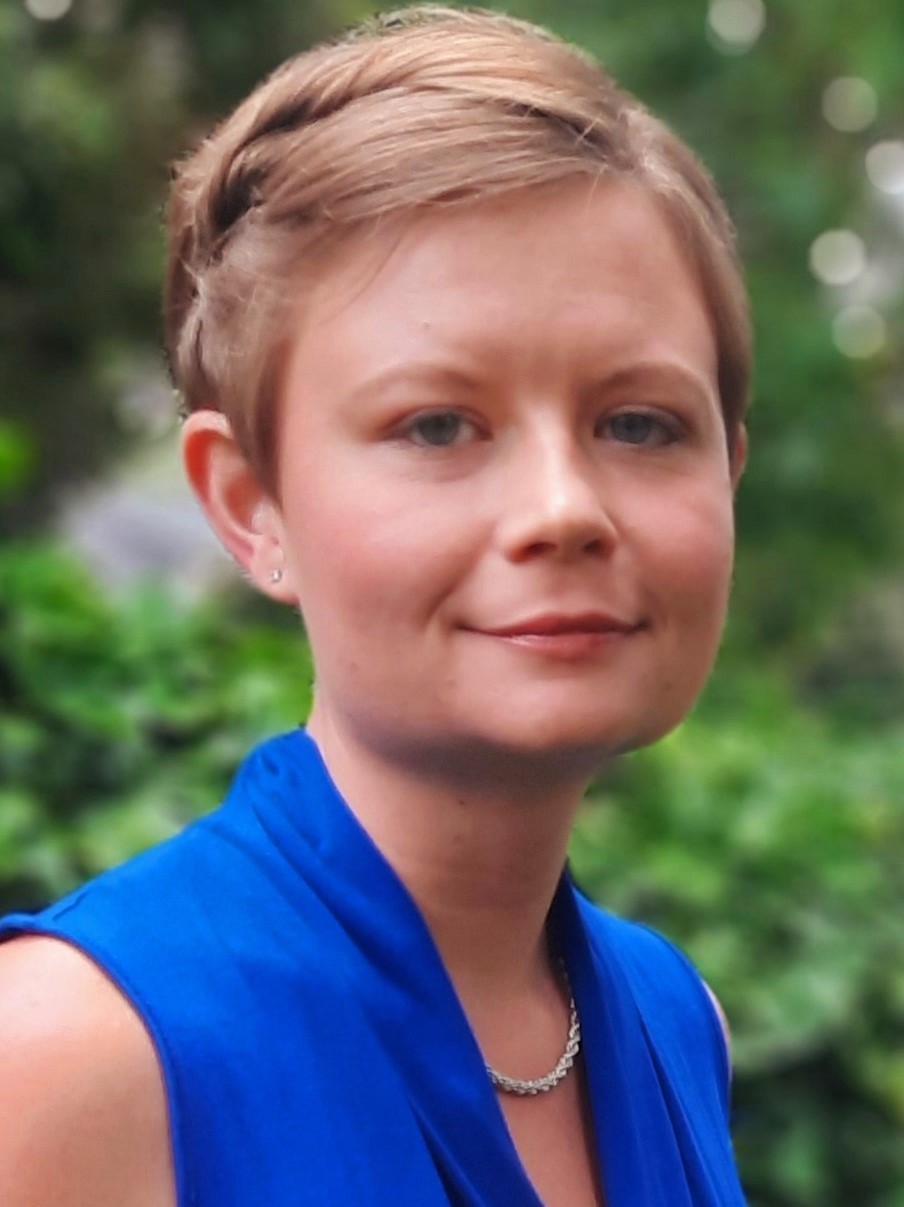
Rebecca Lennox
Rebecca Lennox is completing a Ph.D. in Sociology at the University of Toronto. Her doctoral research uses focus groups, conversational interviews, and discourse analysis to investigate cis and trans women’s fear of violent crime in urban public places. Rebecca has published on street harassment, gendered public safety, and qualitative research methods.
She holds a Master of Arts in Sociology from Simon Fraser University and a Bachelor of Arts (High Honors) in Sociology and Social Studies from the University of Regina.
Public health messaging (PHM) addressing sexual violence is quotidian in Canada and largely focuses on the actions of prospective violence victims, rather than those of bystanders or perpetrators. While the pervasiveness of victim-centered PHM may have profound impacts on women’s mobility and fear of crime in public places, little is known about how women respond to such messaging.
During my term as a Connaught fellow, I will examine how race, class, and gender intersect to shape women’s responses to gendered safety messaging produced by police, media, and educators. I will focus on the experiences of women marginalized by racism, poverty, and transphobia.
The goal of my research is to produce usable knowledge for policy makers and frontline anti-violence advocates that uncovers the effects of victim-centered safety messaging on diverse women’s mental health and mobility, and that highlights the urgent need for community-based, trauma-informed service provisions for sexual violence survivors.
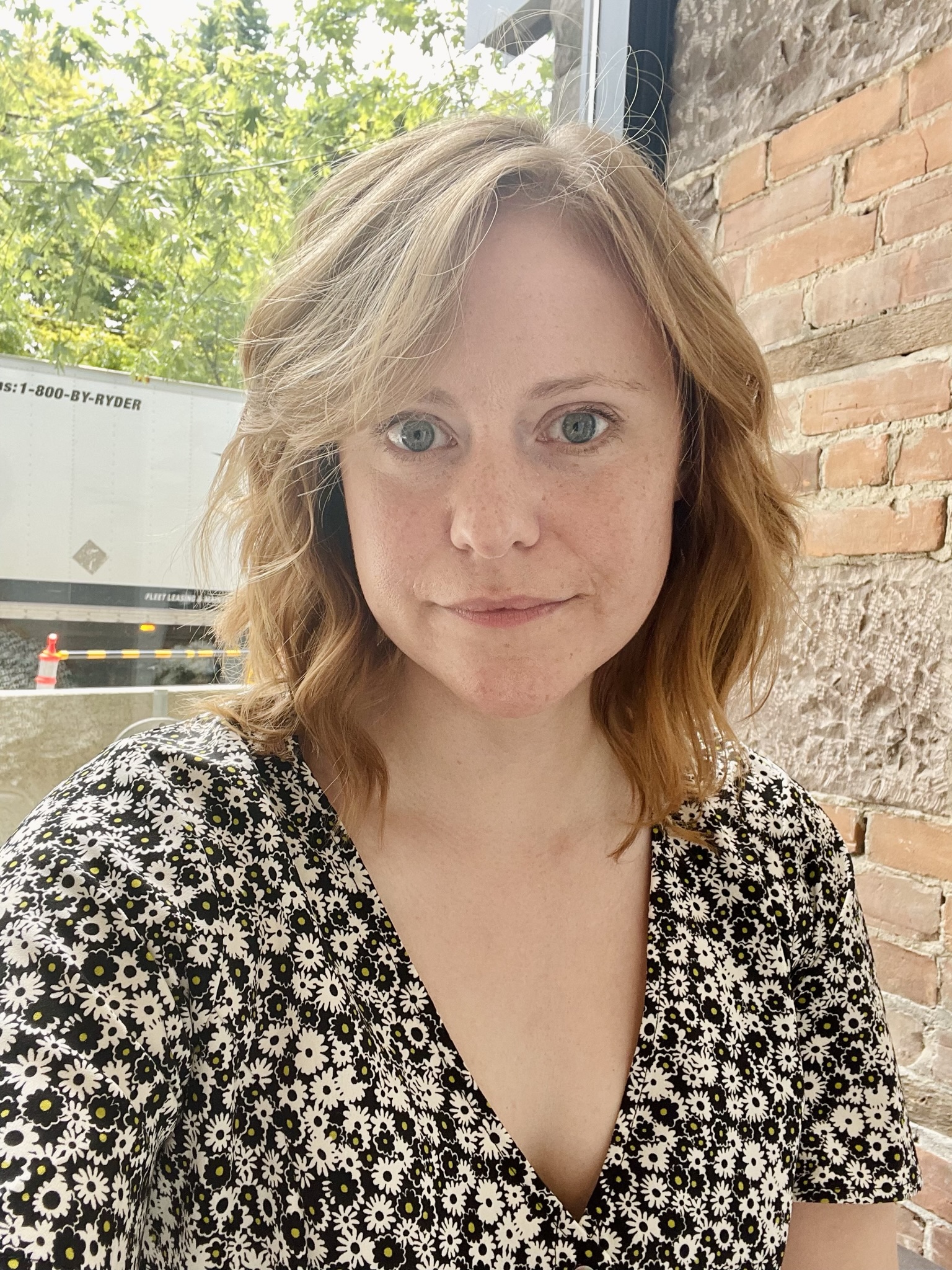
Rose Schmidt
Rose Schmidt, MPH, is a PhD candidate at the Dalla Lana School of Public Health, University of Toronto. Her mixed-methods research focuses on harm reduction and trauma-informed approaches to perinatal substance use. She addresses gender-based determents of health inequity and integrates social epidemiological methodology into applied policy research.
The goal of my project is to identify the different trajectories of opioid and opioid agonist treatment (OAT) use during pregnancy and distinguish the elements that lead to these different trajectories. In my mixed-methods thesis, I will conduct a time-series analysis using population-level administrative health data to examine the impact of new clinical policy guidance recommending buprenorphine over methadone and 2) COVID-19 on the uptake of OAT in Ontario. Then, I will conduct qualitative interviews with women to explore the influences on their different trajectories into and out of opioid and OAT use and their ideas for improving services.
My project is guided by a community advisory board. The outcomes will lead to a greater understanding of how factors at multiple levels impact decision-making during pregnancy will help us build the right tools, programs, and supports to save lives.
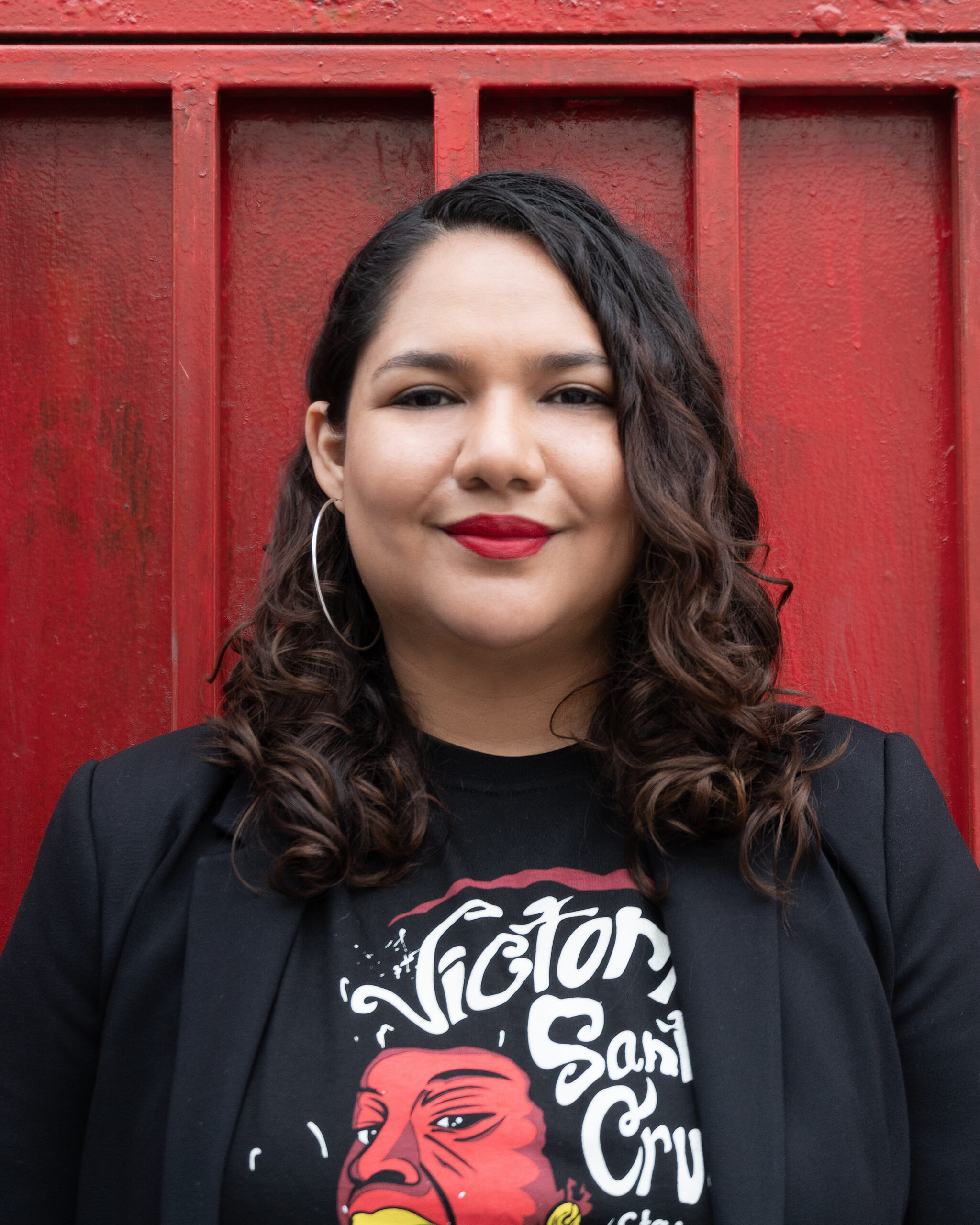
Roxana Escobar Ñañez
Roxana Escobar Ñañez is a 5th year Human Geography PhD candidate at the University of Toronto. She is an international student from Peru. She has a bachelor’s degree in Philosophy and an M.A. in Political Science from the Pontificia Universidad Católica del Perú. Since her master’s in Social Justice Education at the Ontario Institute for Studies in Education (OISE-UofT), Roxana’s research focuses on the livelihoods of the Afro-Peruvian population in Peru.
Currently, Roxana’s Ph.D. dissertation seeks to understand the ways in which the music and performance of Afro-Peruvian women in Lima have played a significant part in the city’s cultural identity.
In my dissertation, I plan to analyze Afro-Peruvian women’s spatialities in criollo culture to re-center Afro-Peruvian women within Lima’s cultural landscapes. Criollo culture is a mix of popular traditional expressions from the coast of Peru, mainly associated with Lima’s working class. There is an intrinsic relationship between criollo culture and blackness in Peru, which locates Afroperuanas within the Peruvian national imagination. Despite Afro-Peruvian women’s active participation in Lima’s cultural life since the 18th century, their presence in the city’s cultural geographies has been overlooked by the academy and the Peruvian mainstream. My project aims to historize contemporary Afro-Peruvian women’s performance practices in criollo culture as integral to producing urban domestic and public spaces. In documenting the historical and geographical conditions that undergird the production of criollo identity in Lima, I seek to contribute with a study that expands the current understanding of the Black geographies of Latin America.
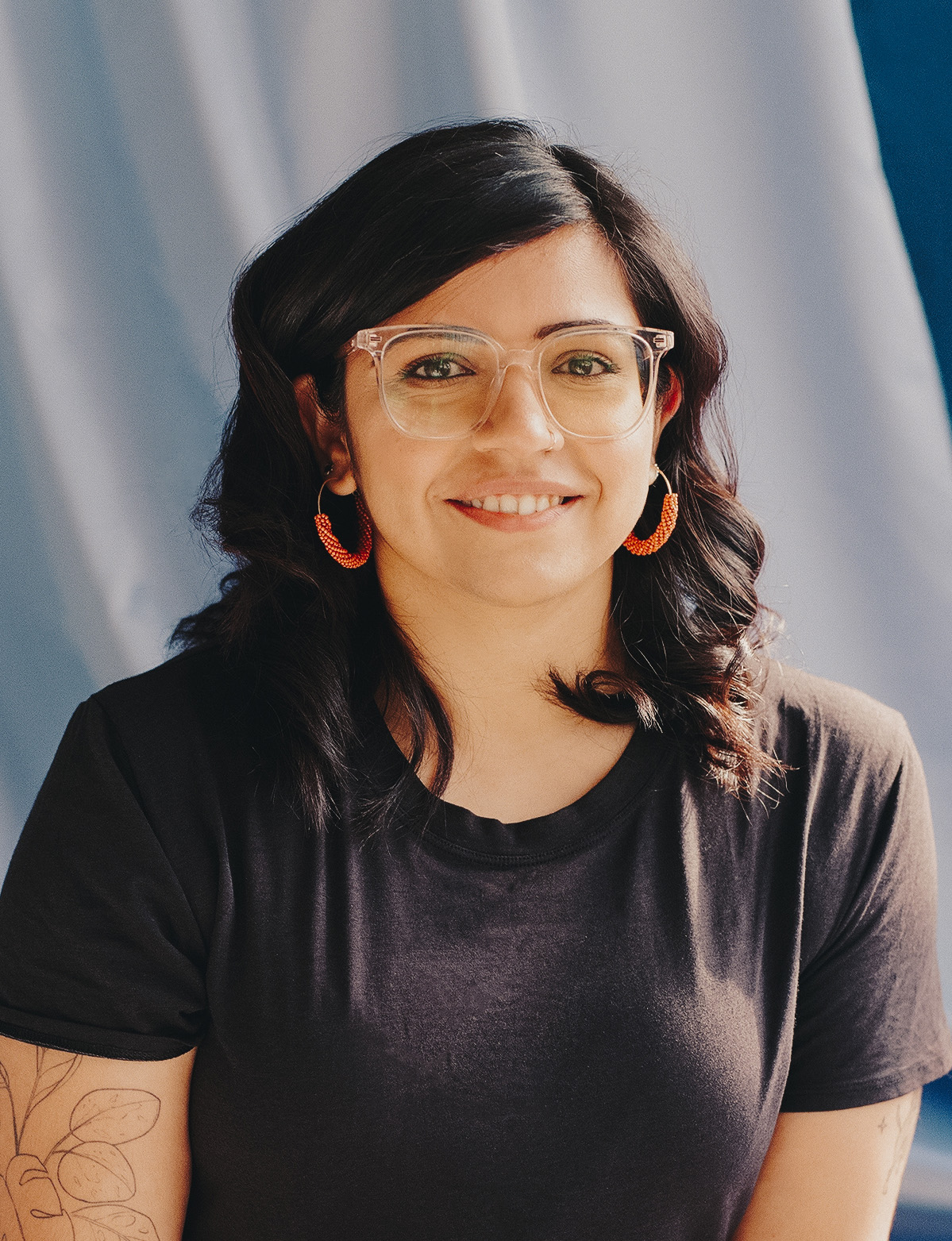
Sneha Mandhan
Sneha Mandhan (she/her) is an urban planner, architect and educator with an interdisciplinary practice in planning, urban design, architecture, design research, and community engagement. She collaborates on city building and engagement projects with Monumental Projects, People Design Co-operative, and the Department of Words and Deeds. She teaches graduate courses in urban design at the John H. Daniels Faculty of Architecture, Landscape, and Design, and holds a Master in City Planning from MIT, and an undergraduate degree in architecture from NIT, Bhopal.
Her work focuses on unearthing and incorporating culture into the planning and design of cities. She is currently pursuing a PhD in Planning at the University of Toronto, where she is working to discover and share the stories of banquet halls as important sites of cultural celebration for the South Asian diaspora in the Greater Toronto Area.
Event spaces are integral to the cultural lives of several ethno-cultural communities in the Greater Toronto Area (GTA). They are shared sites of memory-making and celebration, but have, through regulation, been relegated to some of the most utilitarian and oft-forgotten commercial and industrial parts of the city. Working with the South Asian diaspora in the GTA, my PhD research focuses on documenting the stories of these spaces. Through the Connaught PhDs for Public Impact Fellowship program, I will curate a photo exhibit and write an op-ed that will share the stories of celebration and gathering within these spaces and situate them as sites of living cultural heritage and memory for several immigrant communities within the GTA. The goals of these initiatives are to spread awareness and insert the narrative around the cultural importance of event spaces into the public realm, and ultimately to foster intercultural storytelling through these different mediums.

Tenzin Butsang
Tenzin Butsang is a PhD candidate in Social and Behavioural Health Sciences at the Dalla Lana School of Public Health. She is a Tibetan settler born on unceded Coast Salish territory.
Tenzin’s research examines the multi-dimensional and interconnected notions of settler colonialism, carcerality, parenthood, health, power, and Indigeneity in the lives of previously incarcerated Indigenous mothers, mother-figures, and Two-Spirit parents in the settler state of Canada.
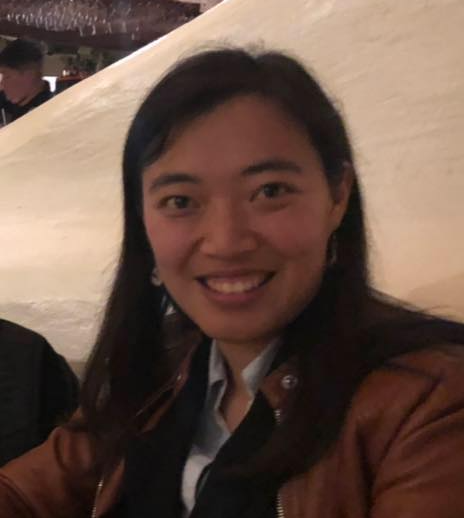
Wen Yin (Elaine) Cheng
Wen Yin (Elaine) Cheng is a Ph.D. candidate in East Asian Studies at the University of Toronto. She received her MSc from University College London. She has 18 years of archaeological experience as a field archaeologist, lab technician, and artifact analyst.
During her MSc research at the Institute of Archaeology, University College London, she had the opportunity to expand her archaeological knowledge to incorporate scientific research techniques in archaeometry.
She is currently researching the artisans of the Shang bronze vessel casters through the moulds housed at the Royal Ontario Museum. Her research incorporates archaeological theory, archaeometry, and area study to comprehend the past artisans. Her current goal is to expand and bridge her research on past artisans to include the voices of the descendants of these ancient cultures.
My work will focus on in-person interactions at the Royal Ontario Museum (ROM) and creating a YouTube channel dedicated to presenting the hidden artisans at the ROM. The in-person discussions are central to changing our view of the artifacts displayed in museums, but this is only a part of the more extensive discussion. Inviting artisans and museum curators to interact and present to the public allows for more open dialogue between the public, artisans, and curators.
By incorporating a YouTube channel, we can reach a broader audience and increase public interaction with facilitated online discussions in the comment section. My project will invite artisans to interact with the museum visitors in-person and be interviewed at their workshops through the YouTube channel as a way to bring the world to the ROM.